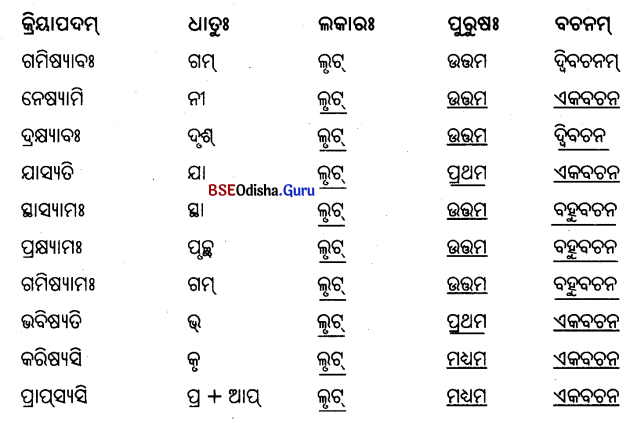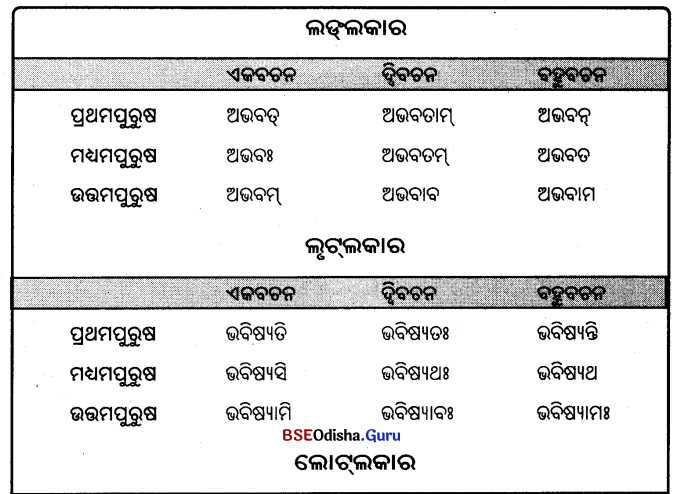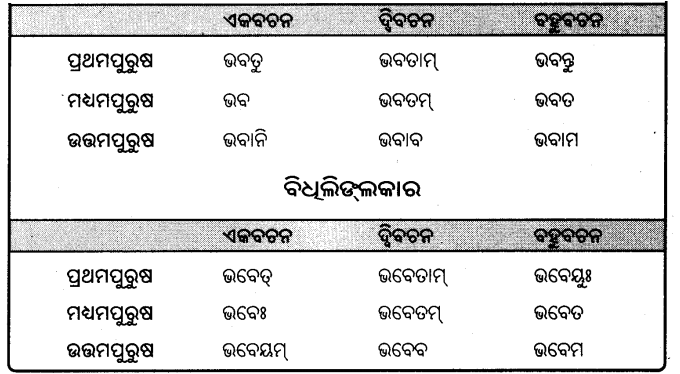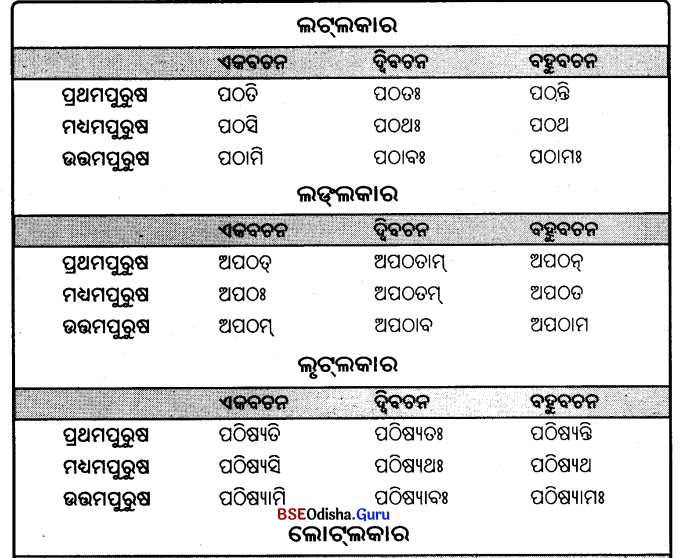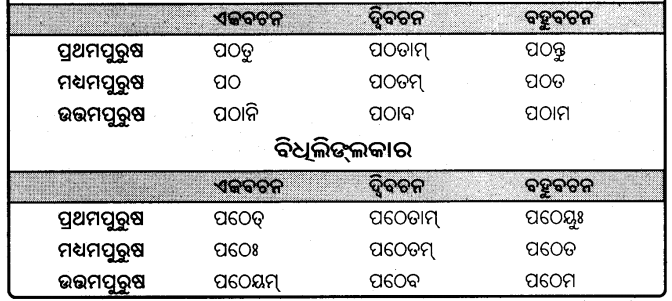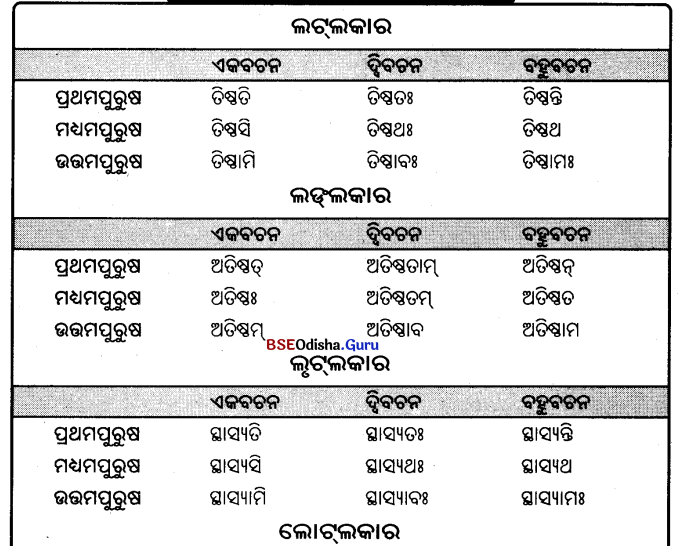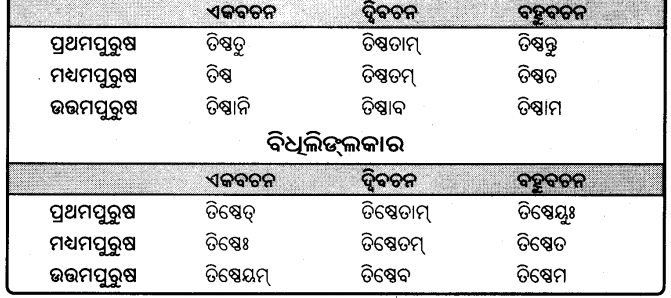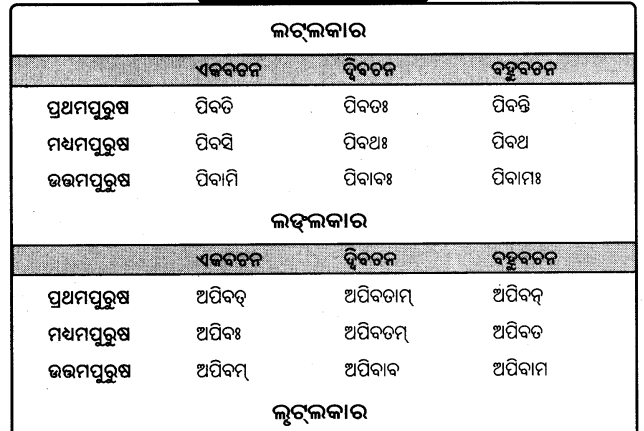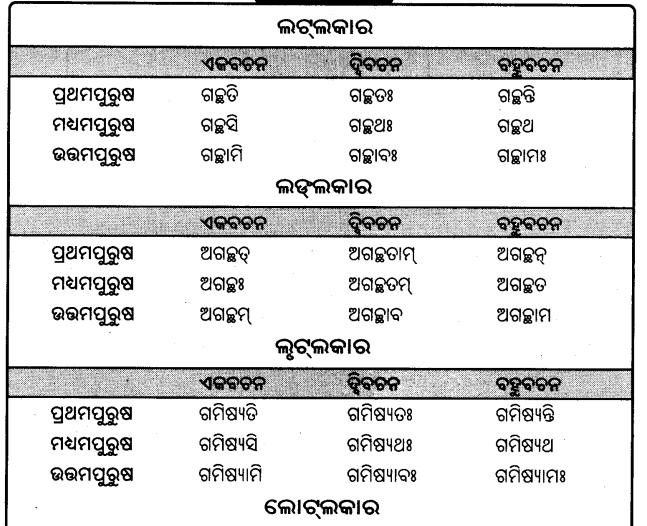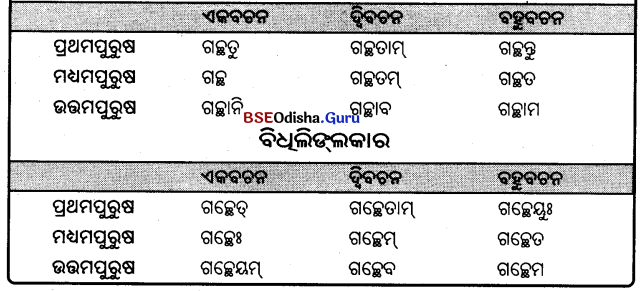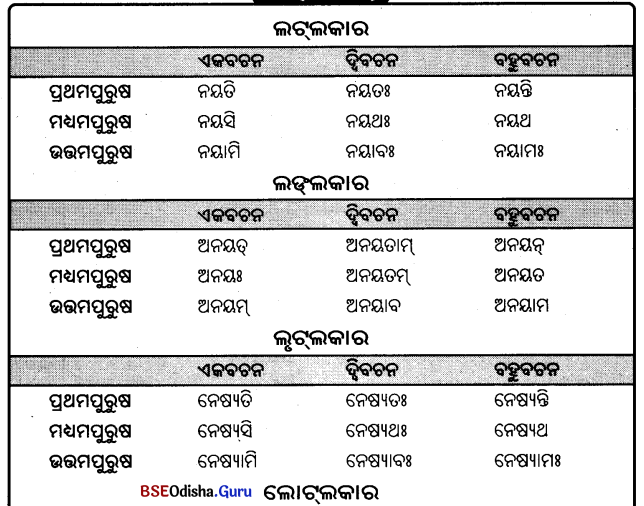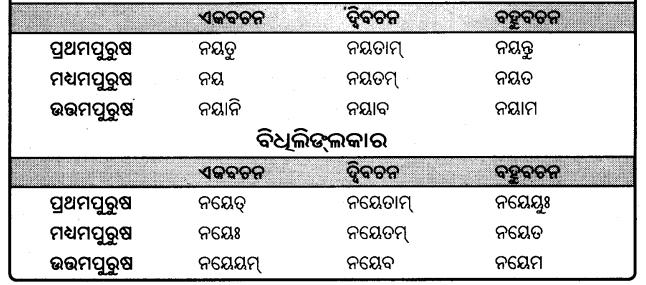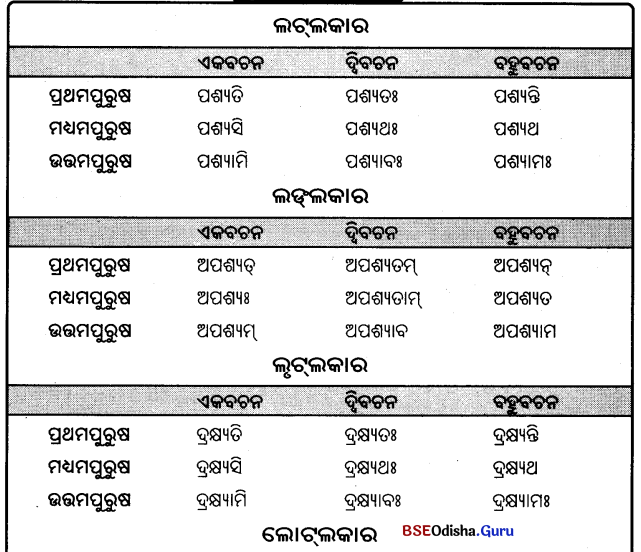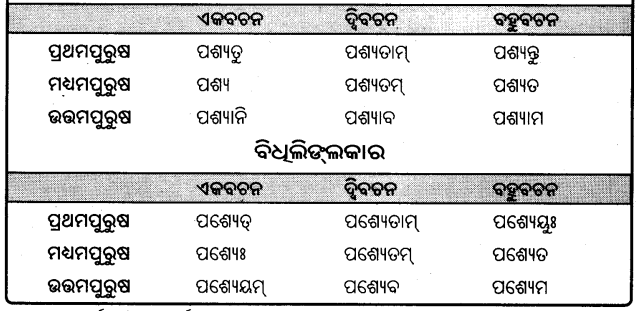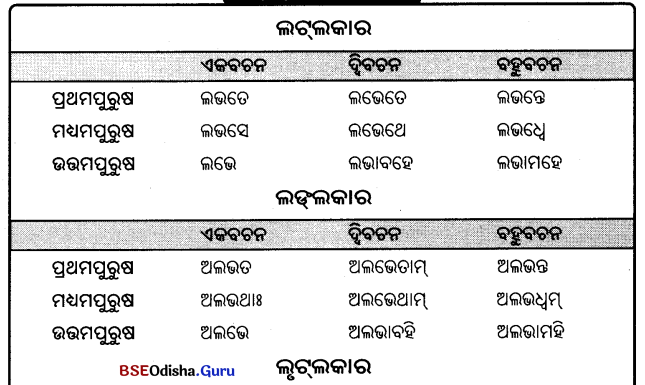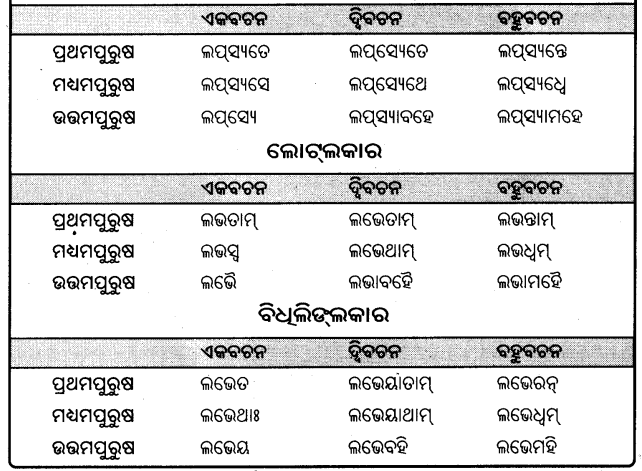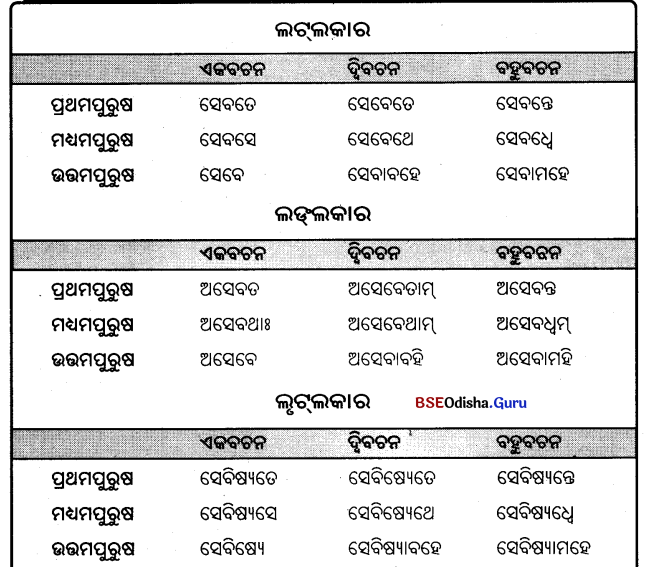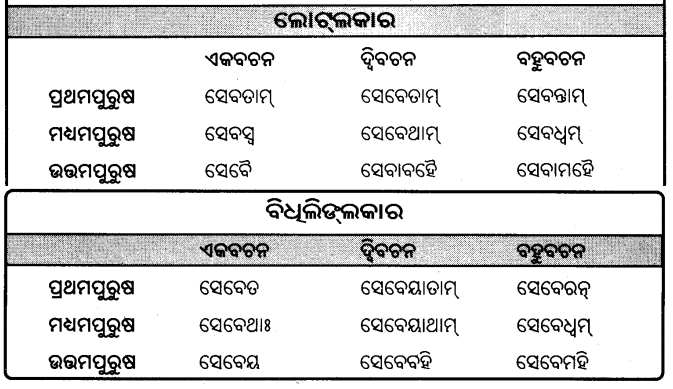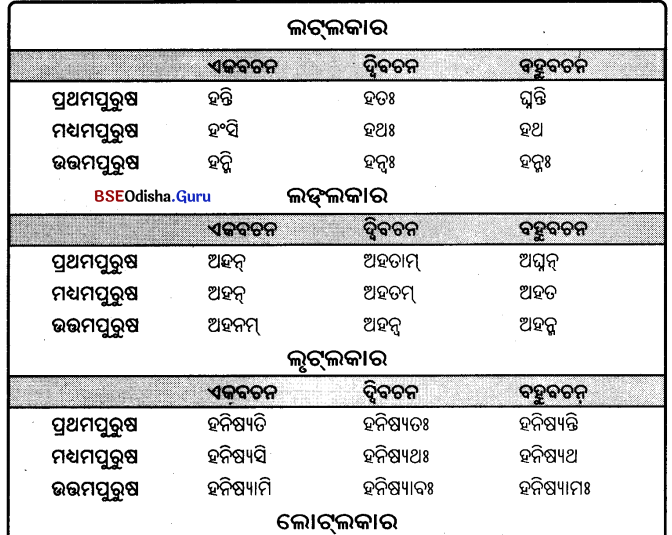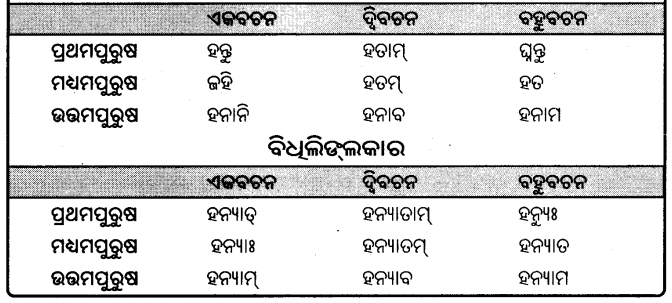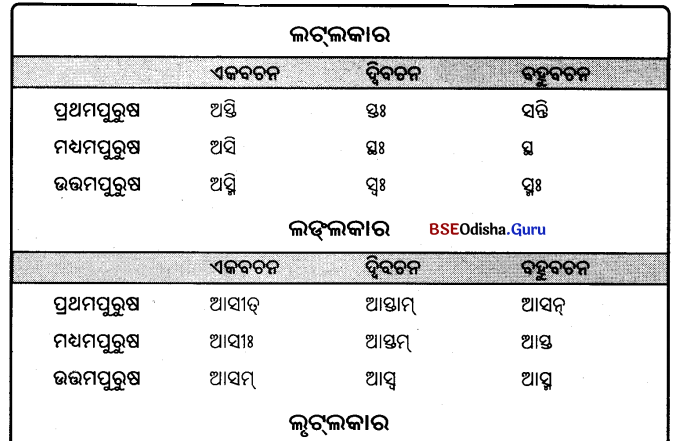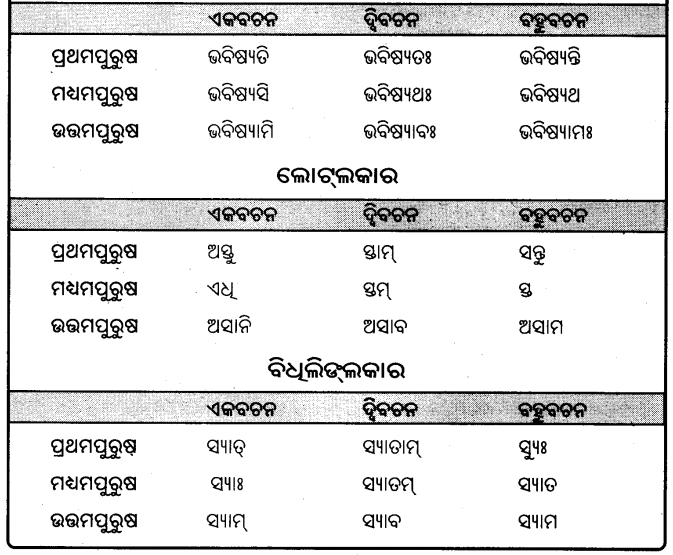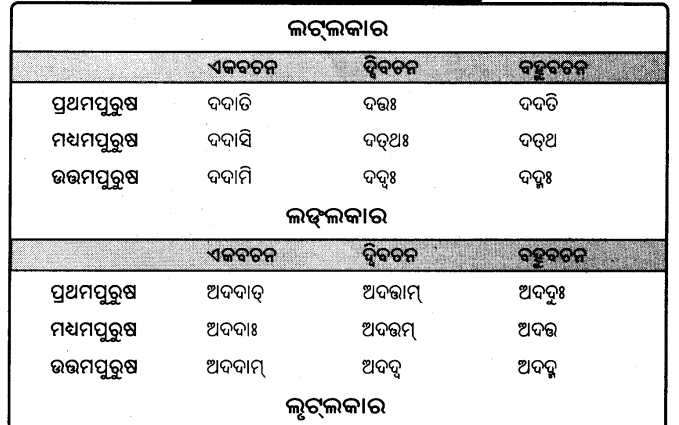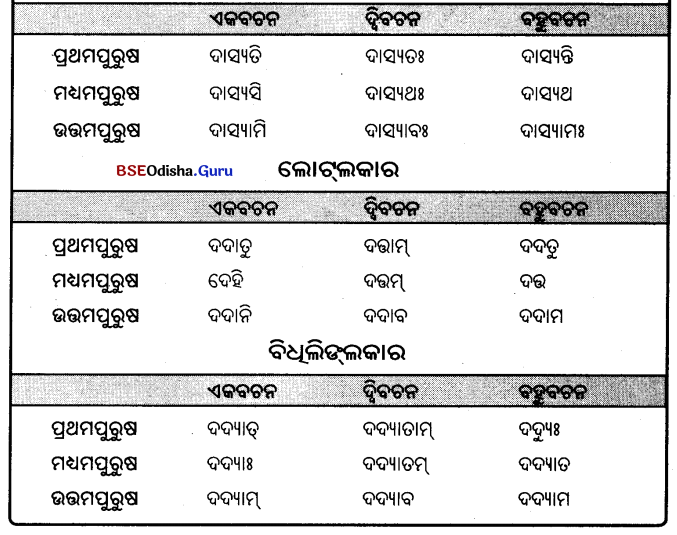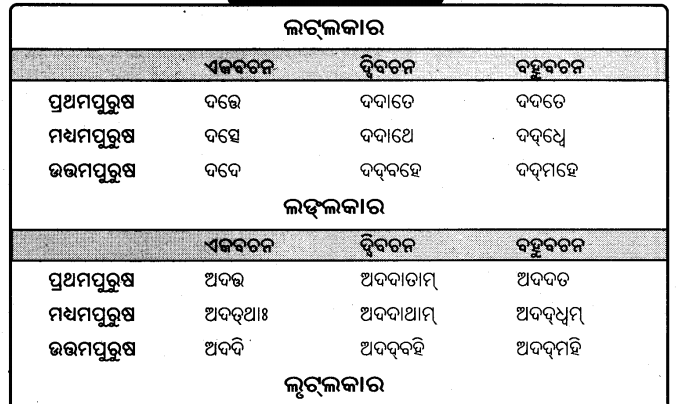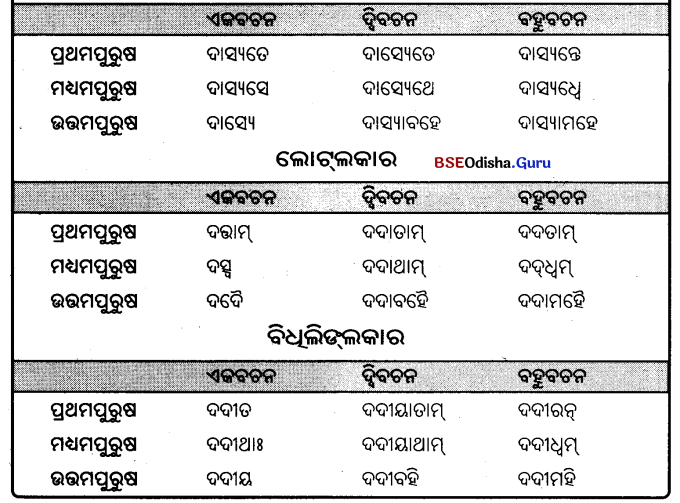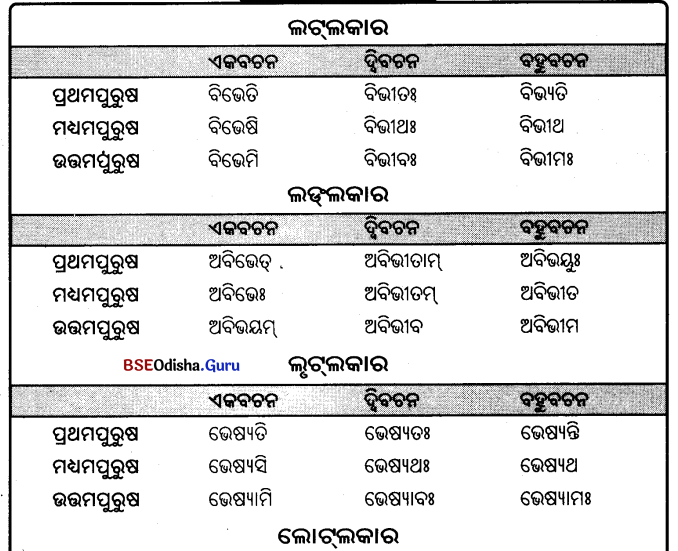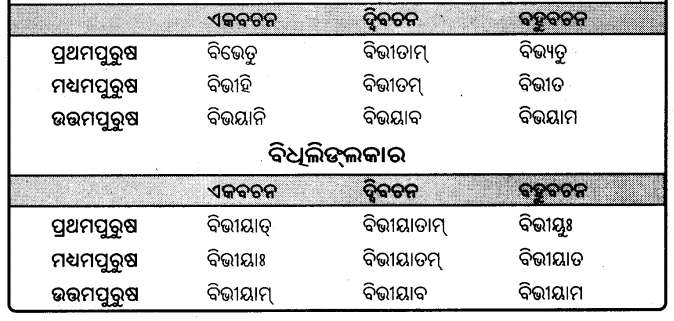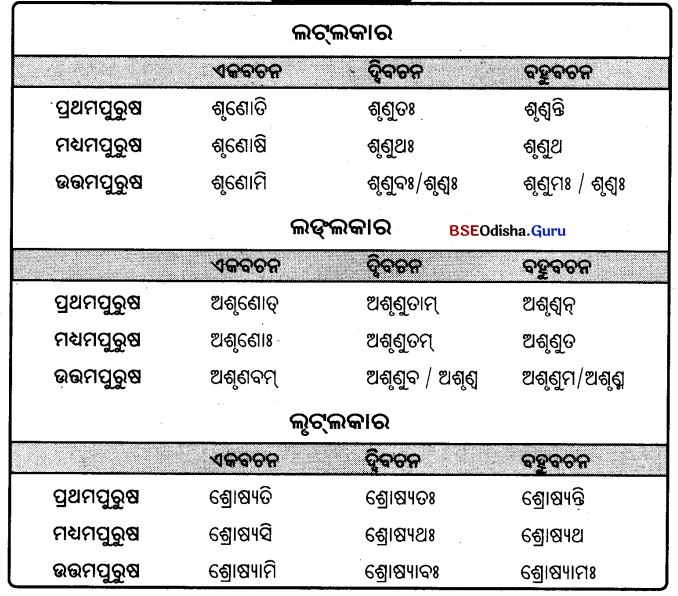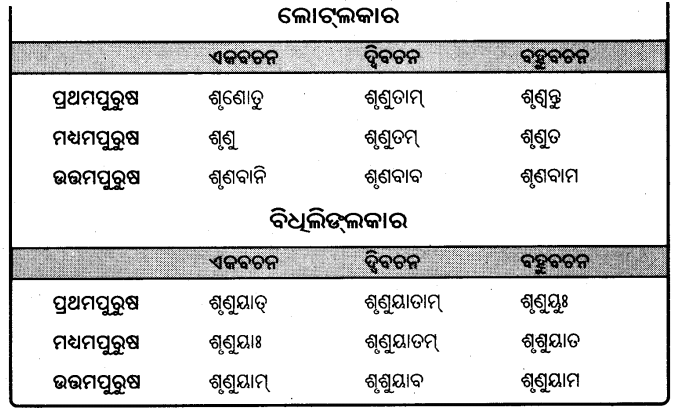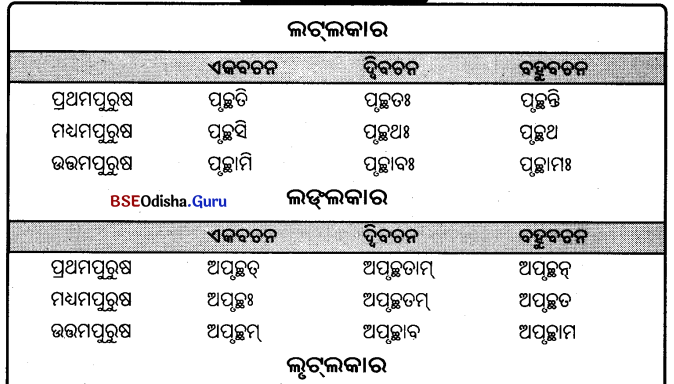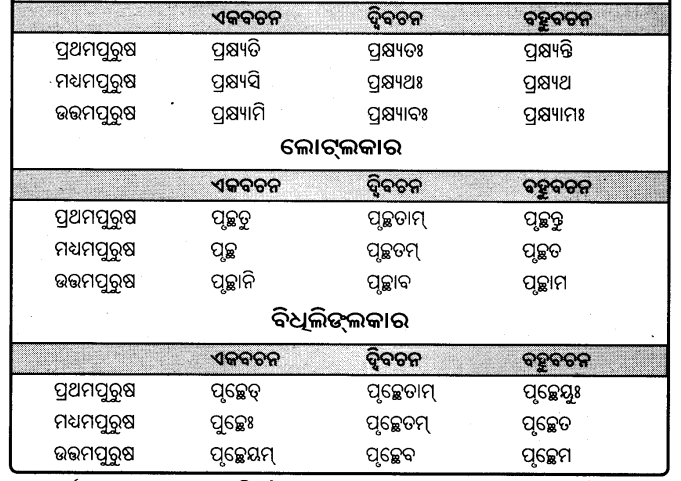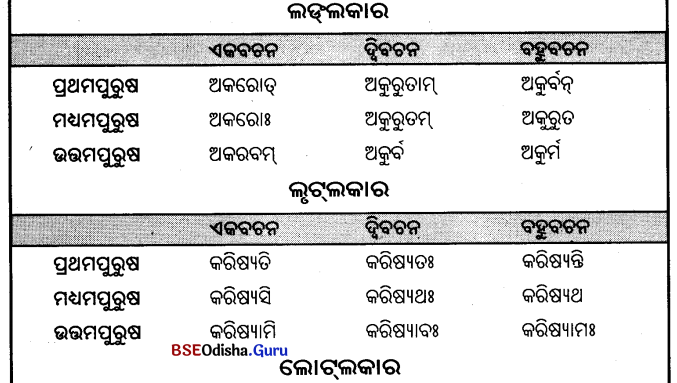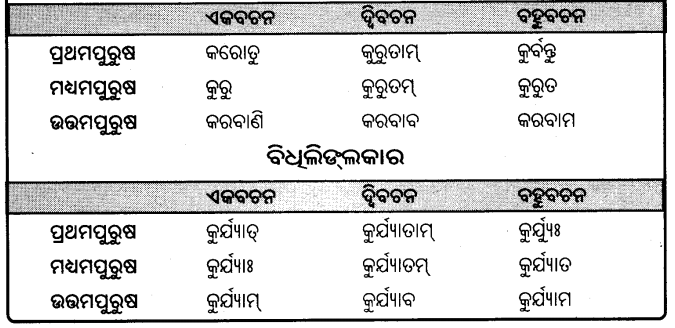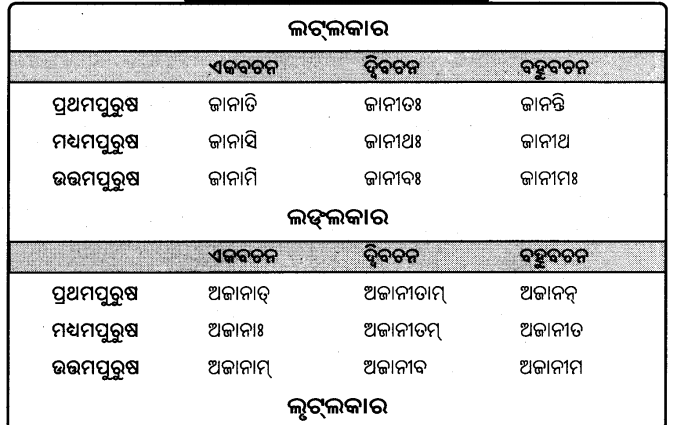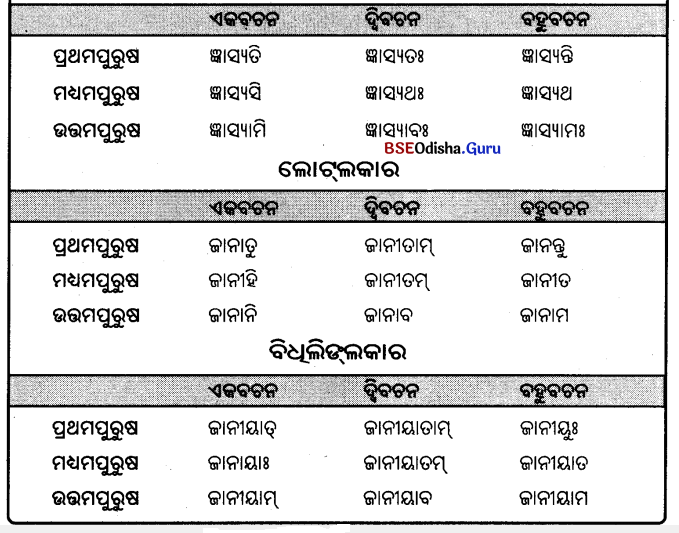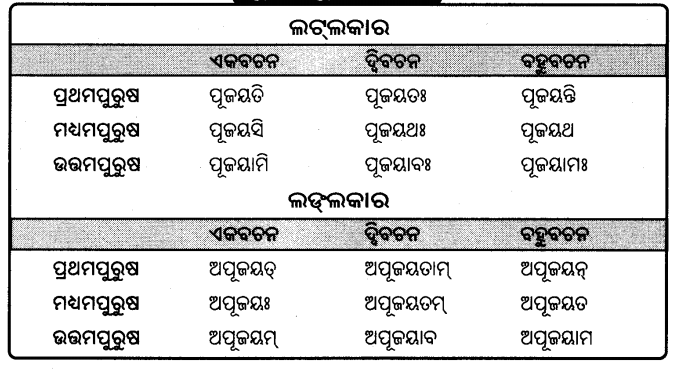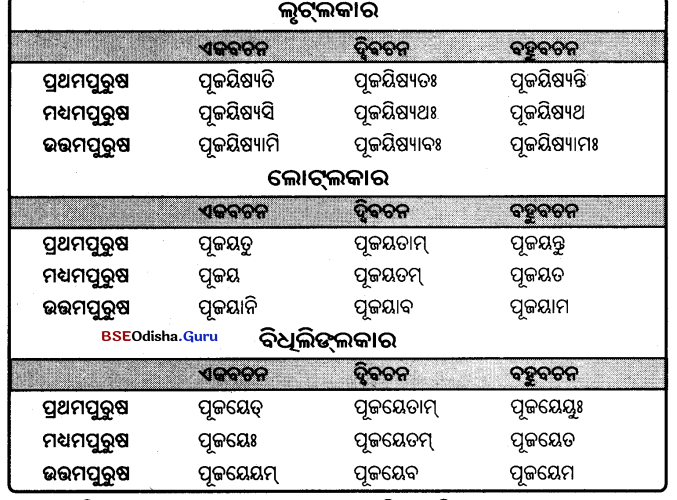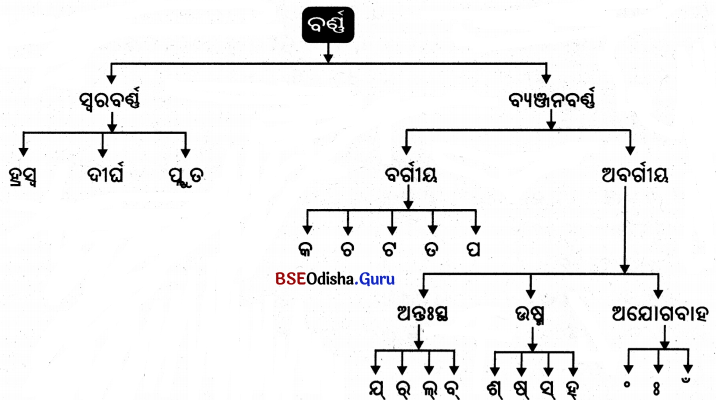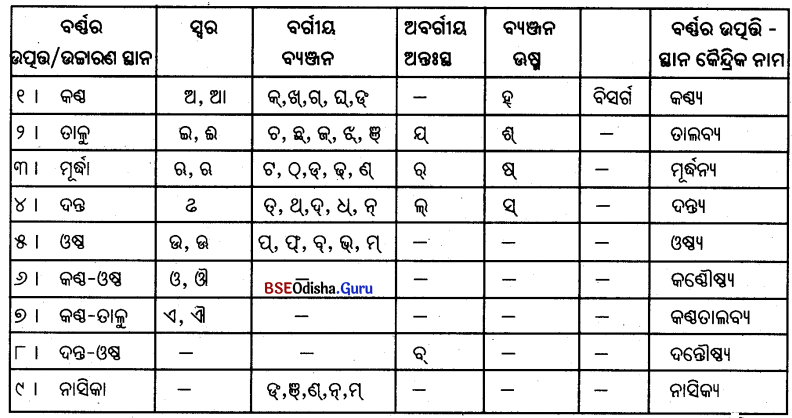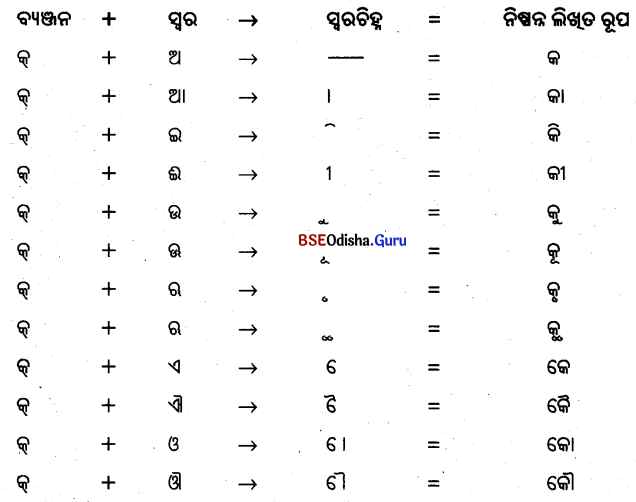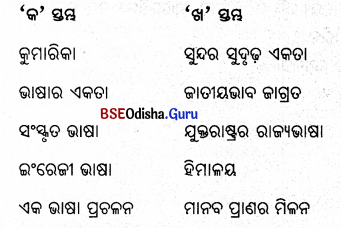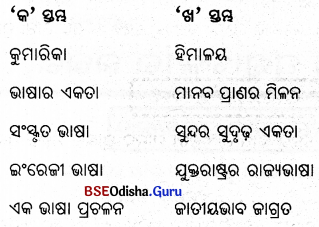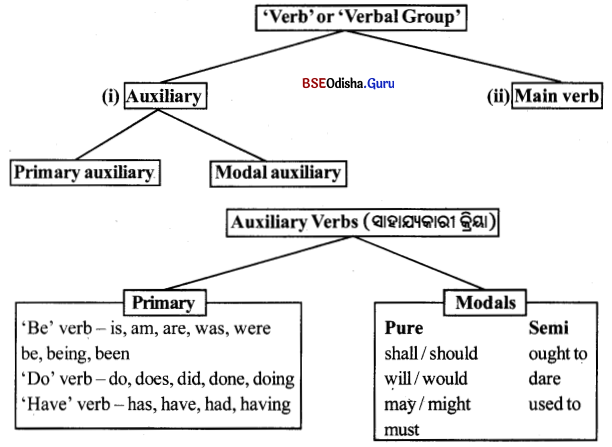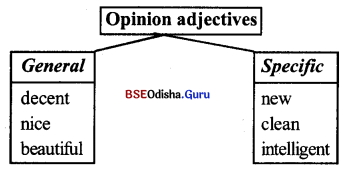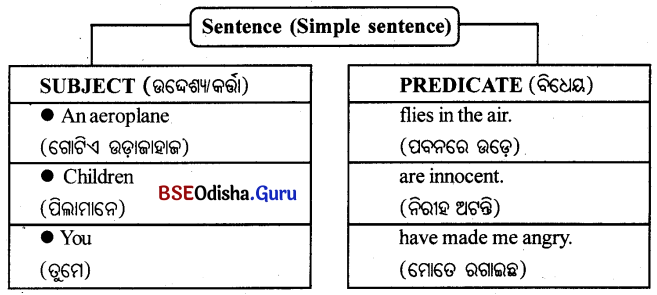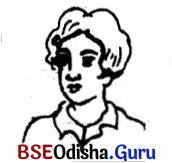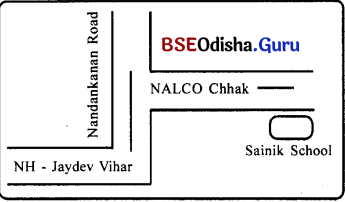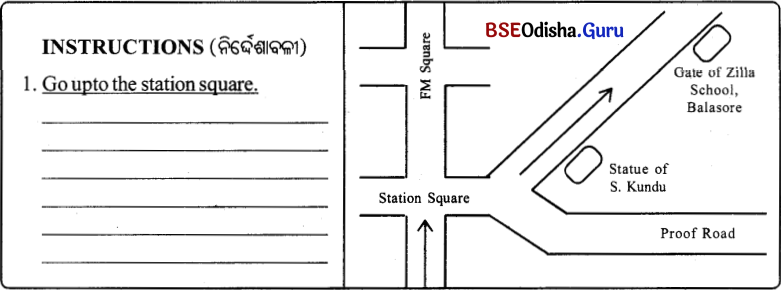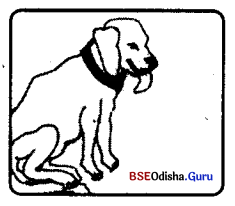Odisha State Board BSE Odisha Class 9 Sanskrit Grammar Book Solutions Chapter 8 ଶବ୍ଦ ରୂପ Textbook Exercise Questions and Answers.
BSE Odisha 9 Class Sanskrit Grammar Solutions Chapter 8 ଶବ୍ଦ ରୂପ
ସ୍ବରାନ୍ତ ଶବ୍ଦ ରୂପ
ଯେଉଁ ଶବ୍ଦମାନଙ୍କର ଅନ୍ତରେ ସ୍ବର ବା ଅଚ୍ ଥା’ନ୍ତି ସେଗୁଡ଼ିକୁ ସ୍ବରାନ୍ତ ବା ଅଜନ୍ତ କୁହାଯାଏ । ପ୍ରସ୍ତୁତ ପାଠ୍ୟକ୍ରମରେ କେତେକ ନିର୍ବାଚିତ ସ୍ବରାନ୍ତଶବ୍ଦକୁ ଗ୍ରହଣ କରାଯାଇଛି । ଶବ୍ଦଗୁଡ଼ିକୁ ବା ତତ୍ସଦୃଶ ଶବ୍ଦଗୁଡ଼ିକୁ ପ୍ରୟୋଗ କଲାବେଳେ ସଂସ୍କୃତ ଭାଷାରେ ସେମାନଙ୍କର ମୂଳ ସ୍ବରୂପର ପ୍ରୟୋଗ ହୁଏ ନାହିଁ । ମୂଳ ଶବ୍ଦରେ ସୁପ୍ ପ୍ରତ୍ୟୟ ଯୋଗ କରାଯାଇ ‘ପଦ’ ନିର୍ମାଣ କରାଯାଏ । ସେହି ପଦର ପ୍ରୟୋଗଯୋଗ୍ୟତା ରହେ । କାରକ ଓ ବଚନକୁ ଆଶ୍ରୟ କରି ଶବ୍ଦର ଯେଉଁ ପରିବର୍ତ୍ତନ ହୁଏ । ତହାକୁ ପଦ ବା ଶବ୍ଦରୂପ କୁହାଯାଏ ।
(କ) ଅକାରନ୍ତ ପୁଲିଙ୍ଗ ଶବ୍ଦ :
ବାଳକ
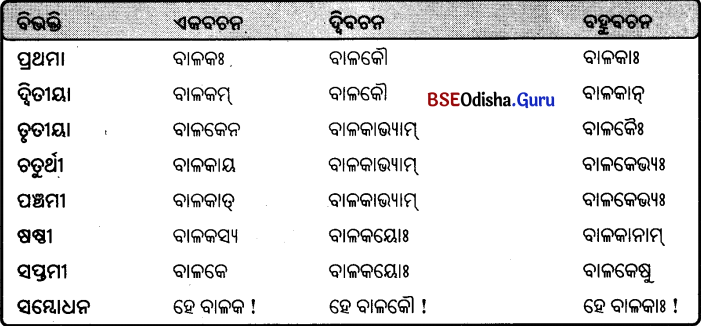
ଶବ୍ଦସୂଚୀ – ରାମ, ଅମର, ସୁର, ନର, ମାନବ, ଜନ, ମହୋଦୟ, ମହାଦେବ, କୃଷ୍ଣ, ଗୋପାଳ, ବାସୁଦେବ, ବିଜୟ, ଅଶ୍ଵ, ଗଜ, ସିଂହ, ମୟୂର, କାକ, କପୋତ, ବୃକ୍ଷ, ପାଦପ, ପର୍ବତ, ଆମ୍ର, ବଟ, ଖଗ, ପିତାମହ, ବିଦ୍ୟାଳୟ, ପରିଣାମ, ଶିକ୍ଷକ, ମହାପୁରୁଷ, ଛାତ୍ର, ବର୍ଣ୍ଣ, ଦେବ, ଶବ୍ଦ, ବ୍ୟବହାର, ଅଙ୍କ ଇତ୍ୟାଦିର ରୂପ ବାଳକ ଶବ୍ଦର ରୂପପରି ହୁଏ ।
ଉପର୍ୟ୍ଯୁକ୍ତ ପ୍ରତ୍ୟେକ ଅକାରାନ୍ତ ପୁଂଲିଙ୍ଗ ମୂଳଶବ୍ଦର ଚବିଶ (୨୪) ଗୋଟି ରୂପ ହୁଏ ।
ଶବ୍ଦ ରୂପଗୁଡ଼ିକର ଏକବଚନରେ ପ୍ରୟୋଗ :
ପ୍ରଥମ ବିଭକ୍ତି : ଡଃ ସୁନ୍ଦରଃ ବାଳକଃ ଅସ୍ଥି । (ସେ ବାଳକଟି ସୁନ୍ଦର ।)
ଦ୍ବିତୀୟା ବିଭକ୍ତି : ଡଃ ବାଳକଂ ପଶ୍ୟତି । (ସେ ପିଲାଟିକୁ ଚାହୁଁଛି ।)
ତୃତୀୟା ବିଭକ୍ତି : ସଃ ବାଳକେନ ସହ କ୍ରୀଡ଼ତି । (ସେ ପିଲାଟି ସହିତ ଖେଳୁଛି ।)
ଚତୁର୍ଥୀ ବିଭକ୍ତି : ସଃ ବାଳକାୟ ପୁସ୍ତକଂ ପଞ୍ଚମୀ ଦଦାତି । (ସେ ପିଲାଟିକୁ ବହି ଦିଏ ।)
ପଞ୍ଚମୀ ବିଭକ୍ତି : ସଃ ବାଳକାତ୍ର ସନ୍ଦେଶଂ ଶୃଣୋତି । (ସେ ପିଲାଠାରୁ ଖବର ଶୁଣେ ।)
ଷଷ୍ଠୀ ବିଭକ୍ତି : ଡଃ ବାଳକସ୍ୟ ପିତା ଅଛି । (ସେ ପିଲାର ବାପା ଅଛନ୍ତି ।)
ସପ୍ତମୀ ବିଭକ୍ତି : ଡଃ ବାଳକେ ବିଶ୍ଵସିତି । (ସେ ପିଲାଟିକୁ ବିଶ୍ଵାସ କରେ ।)
ସମ୍ବୋଧନ : ହେ ବାଳକ ! ଆଗଛ । (ହେ ବାଳକ ! ଆସ ।)

ବି.ଦ୍ର. : ରାମ, ଅମର, ସୁର, ନର, ମୟୂର, ବୃକ୍ଷ, ଆମ୍ର, ଶିକ୍ଷକ, ମହାପୁରୁଷ, ଛାତ୍ର, ବ୍ୟବହାର ପ୍ରଭୃତି ଶବ୍ଦର ୩ୟା ଏକବଚନ ଓ ୬ ଷ୍ଠୀ ବହୁବଚନ ରୂପରେ ‘ନ’ ସ୍ଥାନରେ ‘ଣ’ ହେବ । ଯଥା – ରାମ-ରାମେଣ-ରାମାଣାମ୍ ।
ଅମର – ଅମରେଣ, ଅମରାଣାମ୍
ନର – ନରେଣ, ନରାଣାମ୍
ବୃକ୍ଷ – ବୃକ୍ଷଣ, ବୃକ୍ଷାଣାମ୍
ଶିକ୍ଷକ – ଶିକ୍ଷକେଣ, ଶିକ୍ଷକାଣାମ୍
ଛାତ୍ର – ଛାତ୍ରେଣ, ଛାତ୍ରାଣାମ୍
ସୁର – ସୁରେଣ, ସୁରାଣାମ୍
ମୟୂର – ମୟୂରଣ, ମୟୂରାଣାମ୍
ଆମ୍ର – ଆମେଣ, ଆମ୍ରାଣାମ୍
ମହାପୁରୁଷ – ମହାପୁରୁଷେଣ, ମହାପୁରୁଷାଣାମ୍
ବ୍ୟବହାରେଣ, ବ୍ୟବହାରାଣାମ୍
ଅଭ୍ୟାସଃ
୧ । ମୂଳଶବ୍ଦାନ୍ ନିରୂପୟତ ।
ରାମଃ, ଭାରତସ୍ୟ, ପୂର୍ବଭାଗେ, ପ୍ରଶ୍ନ, ହିମାଳୟଃ, ପର୍ବତଃ
Answer:
ରାମ, ଭାରତ, ପୂର୍ବଭାଗ, ପ୍ରଶ୍ନ, ହିମାଳୟ, ପର୍ବତଃ
୨ । ଯଥାନିର୍ଦ୍ଧିଷ୍ଟରୂପାଣି ଲିଖତ ।
ଖଗ : ପ୍ରଥମ – ଏକବଚନେ ।
Answer:
ଖଗଃ
ସୁର : ଦ୍ଵିତୀୟା – ବହୁବଚନେ ।
Answer:
ସୁରାନ୍
ବୃକ୍ଷ : ଚତୁର୍ଥୀ – ଦ୍ବିବଚନେ ।
Answer:
ବୃକ୍ଷାଭ୍ୟାମ୍
ମୃଗ : ଷଷ୍ଠୀ – ଏକବଚନେ ।
Answer:
ମୃଗସ୍ୟ
ନର : ସପ୍ତମୀ – ବହୁବଚନେ ।
Answer:
ନରେଷୁ
ବଟ : ଦ୍ଵିତୀୟା – ଦ୍ଵିବଚନେ ।
Answer:
ବଟୌ
ବେଗ : ତୃତୀୟା – ଏକବଚନେ ।
Answer:
ବେଗେନ
ମାନବ : ପଞ୍ଚମୀ – ବହୁବଚନେ ।
Answer:
ମାନବେଭ୍ୟଃ
ଘଟ : ସପ୍ତମୀ – ଦ୍ବିବଚନେ ।
Answer:
ଘଟୟୋଃ
ପାଦପ : ସମ୍ବୋଧନ – ଦ୍ବିବଚନେ ।
Answer:
ପାଦପୌ

(ଖ) ଅକାରାନ୍ତ ନପୁଂସକଲିଙ୍ଗ : ଫଳ
| ବିଭକ୍ତି |
ଏକବଚନ |
ଦ୍ୱିବଚନ |
ବହୁବଚନ |
| ପ୍ରଥମା |
ଫଳମ୍ |
ଫଳେ |
ଫଳାନି |
| ଦ୍ବିତୀୟା |
ଫଳମ୍ |
ଫଳେ |
ଫଳାନି |
ଫଳଶବ୍ଦର ଅନ୍ୟବିଭକ୍ତିରେ ରୂପ ବାଳକଶବ୍ଦର ଅନ୍ୟବିଭକ୍ତି ରୂପସଦୃଶ ହେବ । ସଂବୋଧନରେ ଫଳ ଫଳେ ଫଳାନି ହୁଏ ।
ଶବ୍ଦରୂପର ପ୍ରୟୋଗ :
ପ୍ରଥମ ବିଭକ୍ତି : ଫଳାନି ମଧୁରାଣି ସନ୍ତି । (ଫଳଗୁଡ଼ିକ ମଧୁର ।)
ଦ୍ବିତୀୟା ବିଭକ୍ତି : ସଃ ମଧୁରାଣି ଫଳାନି ଖାଦତି । (ସେ ମଧୁର ଫଳ ଖାଏ ।)
ପତ୍ର, ଉଦ୍ୟାନ, ପୁଷ୍ପ, ଚିତ୍ର, ମିତ୍ର, ବସ୍ତ୍ର, ପାତ୍ର, ମୁଖ, ନେତ୍ର, ଜ୍ଞାନ, ବଚନ, ନକ୍ଷତ୍ର, ପୁସ୍ତକ, ସୁଖ, ଦୁଃଖ ଇତ୍ୟାଦି ଫଳଶବ୍ଦର ରୂପପରି ହୁଏ ।
(ଗ) ଅକାରନ୍ତ ସ୍ତ୍ରୀଲିଙ୍ଗ ଶବ୍ଦ :
ଲତା
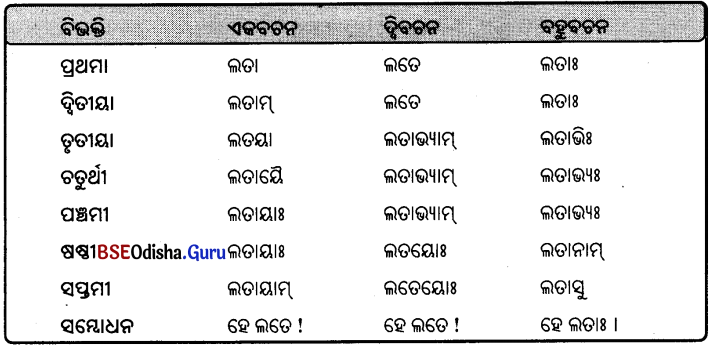
ସଭା, ସ୍ବତନ୍ତ୍ରତା, ଜନତା, ରକ୍ଷା, କ୍ରୀଡ଼ା, କଥା, ମହିଳା, ଶୋଭା, ସୀତା, ଗଙ୍ଗା, ଯମୁନା, ନିନ୍ଦା, କଳା, କକ୍ଷା, କାନ୍ତା ଇତ୍ୟାଦି ଆକାରାନ୍ତ ସ୍ତ୍ରୀଲିଙ୍ଗ ଶବ୍ଦର ରୂପ ଲତାଶବ୍ଦ ରୂପ ସଦୃଶ ହୁଏ ।
ଅଭ୍ୟ।ସଃ
୧ । ଅଧୋଲିଖନୁଚ୍ଛେଦେ ଆକାରାନ୍ତସ୍ତ୍ରୀଲିଙ୍ଗଶବ୍ଦାନ୍ ନିରୂପୟତ ।
ଇୟଂ ପାଠଶାଳା ଅସ୍ତି । ସା ବାଳିକା ଅସ୍ୟା ପାଠଶାଳାୟାଂ ପଠତି । ସା ତତ୍ର ଗଡା଼ ଶିକ୍ଷିକାଂ ନମତି । ପାଠଶାଳାୟା ସମୀପେ ବାଟିକା ଅସ୍ତି । ସୀତା ପାଠଶାଳାୟା ପ୍ରଧାନାଚାର୍ଯ୍ୟା । ରମା ତାଂ ପତ୍ରିକାଂ ଦର୍ଶୟତି । ଅୟି ସୁଧେ । କଳଂ କୋଳାହଳ ଶୁୟତେ ? ମମ ସଖୀ ସୁଜାତା ଅପି ଆଗତା । ଜନା ତସ୍ୟା ସ୍ଵାଗତଂ ମାଳାଭି କୁର୍ବନ୍ତି ।
ଉତ୍ତରମ୍ :
(କ) ______________
Answer:
ପାଠଶାଳା
(ଖ) ______________
Answer:
ବାଟିକା
(ଗ) ______________
Answer:
ଶିକ୍ଷିକା
(ଘ) ______________
Answer:
ପାଠଶାଳା
(ଙ) ______________
Answer:
ବାଟିକା
(ଚ) ______________
Answer:
ପାଠଶାଳା
(ଛ) ______________
Answer:
ରମା
(ଜ) ______________
Answer:
ପତ୍ରିକା
(ଝ) ______________
Answer:
ସୁଧା
(ଞ) ______________
Answer:
ଆଗତା, ସୁଜାତା
(ଟ) ______________
Answer:
ମାଳା

୨ । ଅଧୋଲିଖ୍ନାଂ ପଦାନାଂ ମୂଳଶବ୍ଦଂ ବିଭଣ୍ଡିଂ ବଚନଂ ଚ ଲିଖିତ ।
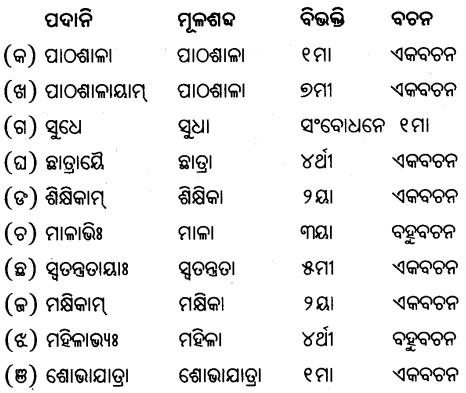
(କ) ନରଃ ______________ ଶୋଭିତେ । (ବିଦ୍ୟୟା / ବିଦ୍ୟାମ୍)
Answer:
ବିଦ୍ୟୟା
(ଖ) ଅଧ୍ୟାପିକା ______________ ଉପହାରଂ ଦଦାତି । (ବନ୍ଦନାମ୍ / ବନ୍ଦନାୟୈ)
Answer:
ବନ୍ଦନାୟୈ
(ଗ) ମାଳାକାରଃ ______________ ପୁଷ୍ପାଣି ଆନୟତି । (ବାଟିକାୟଃ / ବାଟିକୟା)
Answer:
ବାଟିକାୟଃ
(ଘ) ଭୀଷ୍ନଃ ______________ ପୁତ୍ର ଆସୀତ୍ । (ଗଙ୍ଗାୟାଃ / ଗଙ୍ଗାୟାମ୍)
Answer:
ଗଙ୍ଗାୟାଃ
(ଙ) ରାମଃ ______________ ଅତୀବ ନିପୁନଃ । (ଚିତ୍ରକଳାମ୍ / ଚିତ୍ରକଳାୟାମ୍)
Answer:
ଚିତ୍ରକଳାୟାମ୍
୪ । ଅଧୋଲିଖୁବାକ୍ୟଷୁ ଅକାରାନ୍ତପୁଂଲିଙ୍ଗଶବ୍ଦାନାଂ ସ୍ଥାନେ ଆକାରାନ୍ତ ସ୍ତ୍ରୀଲିଙ୍ଗଶବ୍ଦାନ୍ ଲିଖିତ ।
(କ) ବାଳକୌ ଧାବତଃ । ______________ ଧାବତଃ । (ବାଳିକା)
Answer:
ବାଳିକେ
(ଖ) ବାଳକ ମୂଷିକଂ ପଶ୍ୟତି । ବାଳକଃ ______________ ପଶ୍ୟତି । (ମୂଷିକା)
Answer:
ମୂଷିକାଃ
(ଗ) ମାତା ସୁତାୟ କନ୍ଦୁକଂ ଦଦାତି । ମାତା ______________ କନ୍ଦୁକଂ ଦଦାତି । (ସୁତା)
Answer:
ସୁତାୟୈ
(ଘ) ଇଦମ୍ ଆଚାର୍ଯ୍ୟସ୍ୟ ଗୃହମ୍ । ଇଦମ୍ ______________ ଗୃହମ୍ । (ଆଚାର୍ଯ୍ୟ)
Answer:
ଆଚାର୍ଯ୍ୟା
(ଙ) ପୁଷ୍ପାଣି ବୃକ୍ଷାତ୍ ପତନ୍ତି । ପୁଷ୍ପାଣି ______________ ପତନ୍ତି । (ଲତା)
Answer:
ଲତାୟା
(ଘ) ଇ କାରାନ୍ତ :
ଯେଉଁ ଶବ୍ଦର ଅନ୍ତଃମସ୍ବର ‘ଇ’ ବା ଇକାର ହୋଇଥାଏ । ସେହି ମୂଳଶବ୍ଦକୁ ଇକାରାନ୍ତ କହନ୍ତି । ଇକାରାନ୍ତ ଶବ୍ଦ ପୁଂଲିଙ୍ଗ, ନପୁଂସକ ଲିଙ୍ଗ ଏବଂ ସ୍ତ୍ରୀଲିଙ୍ଗରେ ଦେଖିବାକୁ ମିଳିଥାଏ ।
(କ) ଇକାରାନ୍ତ ପୁଂଲିଙ୍ଗ :
ମୁନି
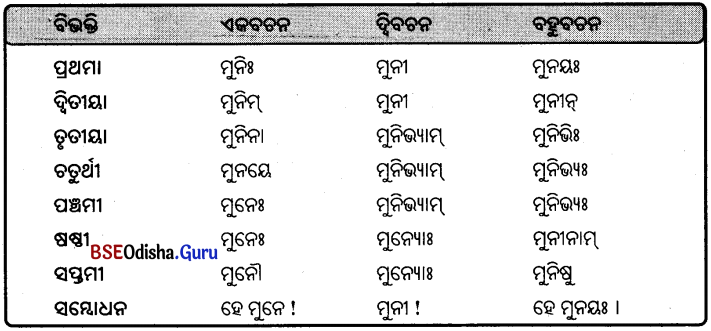
କବି, ହରି, କପି, ଗିରି, ନୃପତି, ଅଗ୍ନି, ରବି ଆଦି ଶବ୍ଦଗୁଡ଼ିକର ରୂପ ମୁନି ଶବ୍ଦରୂପ ପରି ହୁଏ । ତୃତୀୟା ଏବଂ ଷଷ୍ଠୀ ବିଭକ୍ତିରେ ହରି ଏବଂ ଗିରି ଶବ୍ଦର ରୂପରେ ଥିବା ‘ନ୍’ ର ‘ଣ୍’ କୁ ପରିବର୍ତ୍ତନ ହୁଏ; ଯଥା – ହରିଣ, ହରୀଣାମ୍, ଗିରିଣା, ଗିରୀଣାମ୍ । ଗିରି ଓ ହରି ଶବ୍ଦର ଷଷ୍ଠୀ ଦ୍ବଚନ ଓ ସପ୍ତମୀ ଦ୍ବିବଚନରେ ଯଥାକ୍ରମେ ‘ଗିର୍ଯ୍ୟୋ’ ଓ ‘ହର୍ଯ୍ୟୋ’ ହୋଇଥାଏ ।
୧ । (i) ଅଧୋଲିଖୁବାକ୍ୟଷୁ ରେଖାଙ୍କିତାନାଂ ପଦାନାଂ ମୂଳଶବ୍ଦାନ୍ ଲିଖତ ।
(କ) ମୁନେ ! ରଷେ ଆଶ୍ରମଃ କୁତ୍ର ଅସ୍ତି ? ମୂଳଶବ୍ଦ ______________
Answer:
ମୂଳଶବ୍ଦ – ରଷି
(ଖ) କିଂ ତତ୍ର କପୟଃ ଅପି ସନ୍ତି ? ମୂଳଶବ୍ଦ ______________
Answer:
ମୂଳଶବ୍ଦ – କପି
(ଗ) ତେ ଅଗ୍ୌ ହବନଂ କୁର୍ବନ୍ତି । ମୂଳଶବ୍ଦ ______________
Answer:
ମୂଳଶବ୍ଦ – ଅଗ୍ୱି
(ଘ) କବିନା ବିଭାତି ସଭା । ମୂଳଶବ୍ଦ ______________
Answer:
ମୂଳଶବ୍ଦ – କବି

(ii) ରିକ୍ତସ୍ଥାନାନି ପୂରୟତ ।
|
ବିଭକ୍ତି |
ଏକବଚନ |
ଦ୍ବିବଚନ |
ବହୁବଚନ |
| ହରି |
ପ୍ରଥମା |
ହରିଃ |
|
ହରୟଃ |
| କପି |
ଦ୍ବିତୀୟା |
|
କପୀ |
|
| ଗିରି |
ତୃତୀୟା |
ଗିରିଣା |
|
ଗିରିଭିଃ |
| ଅଗ୍ନି |
ଚତୁର୍ଥୀ |
|
ଅଗ୍ନିଭ୍ୟାମ୍ |
|
| ବିଧ୍ |
ପଞ୍ଚମୀ |
ବିଧେଃ |
|
|
| ରବି |
ଷଷ୍ଠୀ |
|
ରବ୍ୟୋଃ |
|
| ନୂପତି |
ସପ୍ତମୀ |
|
|
ନୃପତିଷୁ |
| ମୁନି |
ସମ୍ବୋଧନ |
|
ହେ ମୁନୀ ! |
|
Answer:
|
ବିଭକ୍ତି |
ଏକବଚନ |
ଦ୍ବିବଚନ |
ବହୁବଚନ |
| ହରି |
ପ୍ରଥମା |
ହରିଃ |
ହରୀ |
ହରୟଃ |
| କପି |
ଦ୍ବିତୀୟା |
କମିଂ |
କପୀ |
କପୀନ୍ନ |
| ଗିରି |
ତୃତୀୟା |
ଗିରିଣା |
ଗିରିଭ୍ୟାଂ |
ଗିରିଭିଃ |
| ଅଗ୍ନି |
ଚତୁର୍ଥୀ |
ଅଗ୍ନୟେ |
ଅଗ୍ନିଭ୍ୟାମ୍ |
ଅଗ୍ନିଭ୍ୟଃ |
| ବିଧ୍ |
ପଞ୍ଚମୀ |
ବିଧେଃ |
ବିଧଭ୍ୟାମ୍ |
ବିଧୁଭ୍ୟଃ |
| ରବି |
ଷଷ୍ଠୀ |
ରବେଃ |
ରବ୍ୟୋଃ |
ରବୀନାମ୍ |
| ନୂପତି |
ସପ୍ତମୀ |
ନୂପତୌ |
ନୃପତ୍ୟୋଃ |
ନୃପତିଷୁ |
| ମୁନି |
ସମ୍ବୋଧନ |
ହେ ମୁନେ ! |
ହେ ମୁନୀ ! |
ହେ ମୁନୟଃ । |
(iii) ଅଲିଖ ଅନୁଚ୍ଛେଦେ ସୂର୍ଯ୍ୟ ଶବ୍ଦବିହିତପଦାନାଂ ସ୍ଥାନେ ‘ରବି’ ଶବ୍ଦ ପ୍ରଯୁଜ୍ୟ ପୁନର୍ଲିଖନଂ କୁରୁତ ।
[ସୂର୍ଯ୍ୟ ସଂସାରଂ ପ୍ରକାଶୟତି । ସୂର୍ଯ୍ୟସ୍ୟ ଅରୁଣଂ ବିୟଂ ଦର୍ଶନୀୟମ୍ । ଚନ୍ଦ୍ର ସୂର୍ଯ୍ୟାତ୍ ଏବଂ ପ୍ରକାଶଂ ଲଭତେ । ସୂର୍ଯ୍ୟଣ ଏବ ବୟଂ ଜୀବାମଃ । ଜନଃ ସାଦରଂ ସୂର୍ଯ୍ୟାୟ ଅର୍ଘ୍ୟ ଦଦତି ।]
ଉତ୍ତର :
____________________________
____________________________
____________________________
____________________________
____________________________
____________________________
____________________________
Answer:
ରବିଃ ସଂସାରଂ ପରକାଶୟତି ।
ରବେଃ ଅରୁଣଂ ବିଶ୍ଵଂ ଦର୍ଶନୀୟମ୍ ।
ଚନ୍ଦୁଃ ରବେଃ ଏବ ପ୍ରକାଶଂ ଲଭତେ ।
ରବିନା ଏବ ବୟଂ ଜୀବାମଃ ।
ଜନାଃ ସାଦରଂ ରବୟେ ଅର୍ଘ୍ୟଂ ବଦତି ।
୪ । (i) ଅଧୋଲିଖୁବାକ୍ୟାନାଂ ରେଖାଙ୍କିତସ୍ଥାନେଷୁ ଅତିଶବ୍ଦସ୍ୟ ଯଥାର୍ଥରୂପେ ବାକ୍ୟାନାଂ ପୁନର୍ଲେଖନଂ କୁରୁତ ।
(କ) ଛାତ୍ର କବେ ସମ୍ମାନଂ କରୋତି ।
Answer:
ଛାତ୍ରୀ ଅତିଥେ ସମ୍ମାନଂ କରୋତି ।
(ଖ) ଅଧ୍ୟକ୍ଷ କବିତଃ ପୁରସ୍କାରାନ୍ ଦଦାତି ।
Answer:
ଅଧ୍ୟକ୍ଷ ଅତିଥ୍ୟ ପୁରସ୍କାରାନ୍ ଦଦାତି ।
(ଗ) ସଂ କବିନା ସହ ଗଚ୍ଛତି ।
Answer:
ସଂ ଅତିଥୁନା ସହ ଗଛତି ।
(ଘ) ଅହଂ କବିଂ ପ୍ରଣମାମି ।
Answer:
ଅହମ୍ ଅତିଥ୍ୟ ପ୍ରଣମାମି ।
(ଙ) କବୌ ମମ ବିଶ୍ବାସ ଅସ୍ଥି ।
Answer:
ଅତିର୍ଥୋ ମମ ବିଶ୍ଵାସ ଅସ୍ତି ।
(କ) ସ୍ଵାମୀ ବା ମାଲିକ ଅର୍ଥବୋଧକ :
ପତି
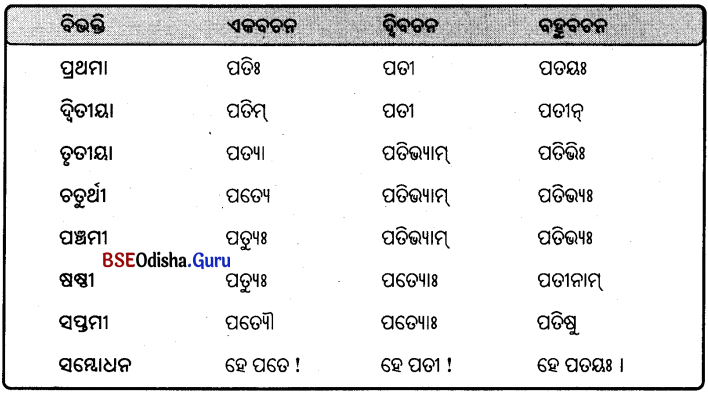
ପତିଶବ୍ଦ ସଂଯୋଗରୁ ନିର୍ମିତ ଭୂପତି, ନୃପତି, ମହୀପତି ପ୍ରଭୃତି ସମାସ ଶବ୍ଦଗୁଡ଼ିକର ରୂପ ମୁନି ଶବ୍ଦପରି ହୁଏ ।
(ଖ) ଇକାରାନ୍ତ ସ୍ତ୍ରୀଲିଙ୍ଗ :
ମତି
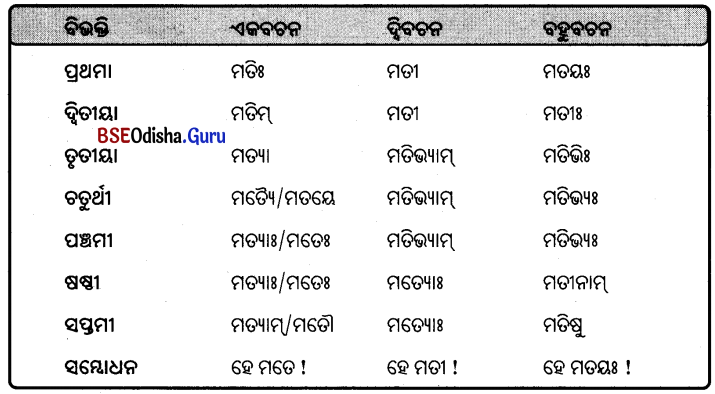
ବୁଦ୍ଧି, ନୀତି,ଗତି, ଯୁବତି,ଭକ୍ତି, ଶକ୍ତି, ଜାତି, ସନ୍ତତି, ରାତ୍ରି, ଶାନ୍ତି, ପ୍ରୀତି, କୀର୍ତ୍ତି ପ୍ରଭୃତି ‘ଇ’ କାରାନ୍ତ ସ୍ତ୍ରୀଲିଙ୍ଗ ଶବ୍ଦର ରୂପ ମତି ଶବ୍ଦର ରୂପପରି ହେବ ।
ଅଭ୍ୟ।ସଃ
୧ । ଅଧୋଲିଖ୍ତବାକ୍ୟେଷୁ ରେଖାଙ୍କିତପଦାନାଂ ମୂଳଶବ୍ଦ- ନିରୂପଣଂ ବିଭଳ୍ତିବଚନନିରୂପଣଂ ଚ ଯଥୋଦାହରଣଂ କୁରୁତ ।
(କ) ଶାନ୍ତଃ ପ୍ରାତଃ ପଞ୍ଚବାଦନେ ଶଯ୍ୟାତ୍ୟାଗଂ କରୋତି ।
Answer:
ଶାନ୍ତି ପ୍ରଥମା ବିଭକ୍ତି ଏକ ବଚନମ୍
(ଖ) ସା ଉତ୍ଥାୟ ମାତୃଭୂମିଂ ପ୍ରଣମତି ।
Answer:
ମାତୃଭୂମି ୨ୟା ବିଭକ୍ତି ଏକବଚନ

(ଗ) ଅନନ୍ତରଂ ସା ସୁନୀତ୍ୟା ସହ ପାଠଶାଳା ଗଚ୍ଛତି ।
Answer:
ସୁନୀତି ତୃତୀୟା ବିଭକ୍ତି ଏକବଚନ
(ଘ) ଶାନ୍ତଃ ସାୟଂ କ୍ରାନ୍ତୀ / କାନ୍ୟା ଗୃହଂ ଗଚ୍ଛତି ।
Answer:
ଶାନ୍ତି ଷଷ୍ଠୀୟା ବିଭକ୍ତି ଏକବଚନ
(ଙ) କାତିଃ ଅପି ପ୍ରୀତ୍ୟା ମିତ୍ରମସ୍ତି ।
Answer:
ପ୍ରୀତି ଷଷ୍ଠୀୟା ବିଭକ୍ତି ଏକବଚନ
(ଚ) ସା ଦେଶସ୍ୟ ପ୍ରଗତୌ ବିଶ୍ବାସଂ କରୋତି ।
Answer:
ପ୍ରଗତି ୭ମୀ ବିଭକ୍ତି ଏକବଚନ
(ଛ) ସା ରୁଟିଂ ବଦତି – ହେ ରୁଚେ ! ସଂସ୍କୃତଂ ପିଠି ।
Answer:
ରୁଟି ୨ୟା ଏକବଚନ ସଂବୋଧନ ଏକବଚନ
୨ । ନିର୍ଦ୍ଦେଶାନୁସାରଂ ଶୂନ୍ୟସ୍ଥାନାନି ପୂରୟତ ।
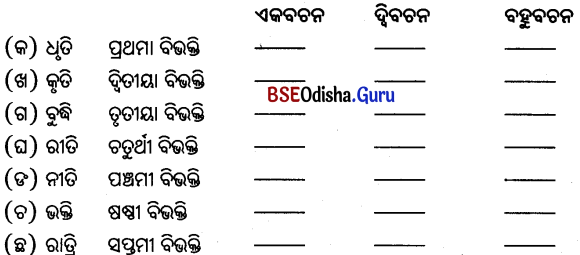
Answer:
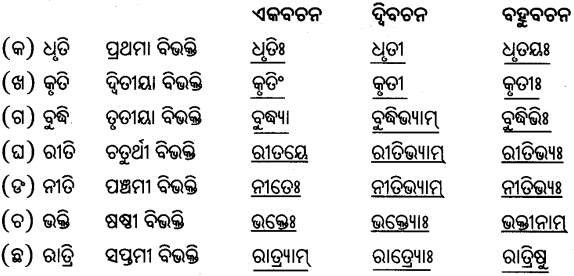
୩ । କୋଷ୍ଠକମଧ୍ୟାତ୍ ସମୁଚିତଂ ପଦଂ ନିରୂପ ଶୂନ୍ୟସ୍ଥାନଂ ପୂରୟତ ।
(ପ୍ରୀତେଃ, ସୁନୀତିଃ, ରୁଚି, ସୂକ୍ତୟଃ, ଶାନ୍ତିମ୍)
(କ) ଯଃ ଦାନଂ କରୋତି ସଃ ______________ ଲଭତେ ।
Answer:
ଶାଣ୍ଡିଂ
(ଖ) ରକ୍ଷାବନ୍ଧନଂ ______________ ସୂଚକଂ ଭବତି ।
Answer:
ପ୍ରୀତେଃ
(ଗ) କାଳିଦାସସ୍ୟ ______________ ପ୍ରସିଦ୍ଧ ସନ୍ତି ।
Answer:
ସୁନୀତିଃ
(ଘ) ବାଳକାନାଂ ମିଷ୍ଟାନ୍ନେଷୁ ______________ ଆସୀତ୍ ।
Answer:
ରୁଚି
(ଙ) ______________ ଧ୍ରୁବସ୍ୟ ମାତା ଆସୀତ୍ ।
Answer:
ସୁନୀତିଃ
୪ । କୋଷ୍ଠକସ୍ଥ ଶବ୍ଦାନାଂ ସମୁଚିତଂ ରୂପଂ କୃତ୍ୱା ଶୂନ୍ୟସ୍ଥାନଂ ପୂରୟତ ।
ସଃ ମାଳାନାଂ କ୍ରେତା । ସଃ ______________ ଅପି କ୍ରେତା । (ଭୂମି)
ସଃ ମାଳାନାଂ କ୍ରେତା । ସଃ ଭୂମେ ଅପି କ୍ରେତା ।
(କ) ବାଳକଃ ଆକୃତ୍ୟ ସୁନ୍ଦରଃ । ସଃ ______________ ଚପଳ । (ପ୍ରକୃତି)
Answer:
ପ୍ରକୃତ୍ୟା
(ଖ) କ୍ରିୟାୟା ମୂଲ୍ୟଂ ଭବତି । ______________ ମହରଂ ଭବତି । (କୃତି)
Answer:
କୃତେଃ
(ଗ) ଲକ୍ଷ୍ମତଃ ସୀତୟା ସହ ଆଗଚ୍ଛତ୍ । କାର୍ତ୍ତି ______________ ସହ ଶୋଭତେ । (ମତି)
Answer:
ମତ୍ୟା
(ଘ) ବିଦ୍ୟା ରକ୍ଷତି ରକ୍ଷିତା । ବ୍ୟାସ୍ତୋତି ମହତୀ ______________ । (କୀର୍ତ୍ତି)
Answer:
କୀର୍ତ୍ତିଃ
(ଗ) ଇକାରାନ୍ତ କ୍ଲବଲିଙ୍ଗ :
ବାରି
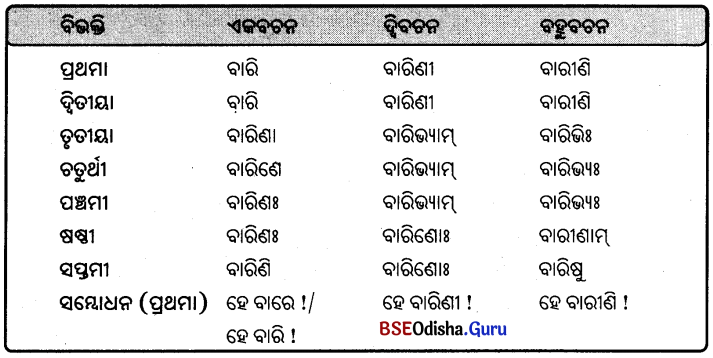
ଇକାରାନ୍ତ – ନପୁଂସକ ଲିଙ୍ଗ-ବିଶେଷଣ ଶବ୍ଦମାନଙ୍କର ମଧ୍ୟ ବାରିଶବ୍ଦପରି ରୂପ ହୁଏ ।
ଉଦାହରଣ :
ପାପାପହାରି ଦୁରିତାରି ତରଙ୍ଗଧାରି
ଶୈଳପ୍ରଚାରି ଗିରିରାଜଗୁହାବିଦାରି ।
ଝଙ୍କାରକାରି ହରିପାଦୁରଜୋଽପହାରି
ଗାଙ୍ଗ ପୁନାତୁ ସତତଂ ଶୁଭକାରି ବାରି ॥

ଇକାରାନ୍ତ କ୍ଲବଲିଙ୍ଗ :
ଅକ୍ଷି (ଆଖ୍)
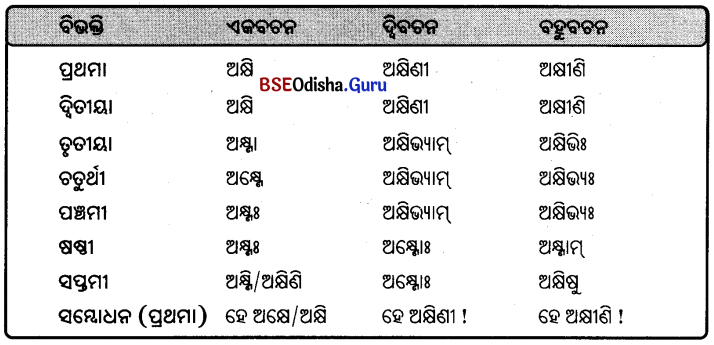
ଏହିପରି ସକ୍ (ଊରୁ) ଦଧ, ଅସ୍ଥି ଶବ୍ଦର ରୂପ ହେବ । ଅକ୍ଷି ଶବ୍ଦର ଯେଉଁଠାରେ ଣ ଅଛି ସେଠାରେ ପୂର୍ବୋକ୍ତ ଶବ୍ଦର ନ ରହିବ ।
ଅଭ୍ୟ।ସଃ
୧ । ଅଧସ୍ତନବାକ୍ୟଷୁ ଇକାରାନ୍ତନପୁଂସକପଦାନି ନିରୂପୟତ ।
(କ) ଇଦଂ ପାପାହାରୀଶୁଭକାରିବାରି ମାଂ ପୁନାଠୁ ।
Answer:
ବାରି
(ଖ) ଅନେନ ଗାଙ୍ଗେନ ବାରିଣା ମମ ଶରୀରଂ ନିର୍ମଳଂ ଭବତୁ ।
Answer:
ବାରିଣା
(ଗ) ଅସ୍ୟ ଗାଙ୍ଗବାରିତଃ ପାବନପ୍ରଭାତଃ ଅସାମାନ୍ୟ ।
Answer:
ଗାଙ୍ଗବାରିତଃ
(ଘ) ଅସ୍ମାତ୍ ଘଟାତ୍ ଗାଙ୍ଗବାରିଣୀ ମତ୍ସ୍ୟ କିଞ୍ଚିତ୍ ଦେହି ।
Answer:
ଗାଙ୍ଗବାରିତଃ
(ଙ) ଡଃ ଗାଙ୍ଗବାରିଣି ଆଵାଦମସ୍ତକଂ ସ୍ନାତି ।
Answer:
ଗାଙ୍ଗବାରିଣି
(ଚ) ଅସ୍ୟ ବାଳକସ୍ୟ ହୃଦୟଂ ଶୁଚି ।
Answer:
ଶୁଚି
(ଛ) ଅନୟୋ ବାଳକୟୋ ମନସୀ ଶୁଚିନୀ ।
Answer:
ଶୁଚିନୀ
ଈକାରାନ୍ତ ସ୍ତ୍ରୀଲିଙ୍ଗ :
ନଦା
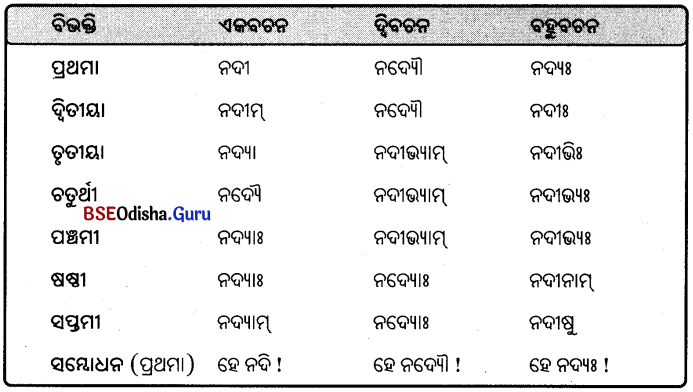
ଦେବୀ, ପତ୍ନୀ, ବାଣୀ, ସତୀ, ରମଣୀ, ଶ୍ରେଣୀ, ବିଦୁଷୀ, ଗୁଣିନୀ, ଶ୍ରୀମତୀ, ଜନନୀ, ଅଟବୀ, କଠିନୀ (ଖଡ଼ି), ପଦବୀ, ମହୀ, ଯାମିନୀ ପ୍ରଭୃତି ଈ-କାରାନ୍ତ ସ୍ତ୍ରୀଲିଙ୍ଗ ଶବ୍ଦ ନଦୀ ଶବ୍ଦର ରୂପତୁଲ୍ୟ । ଏତଦ୍ବ୍ୟତୀତ ଗଚ୍ଛନ୍ତୀ, ପଠନ୍ତୀ, କୁର୍ବତୀ, ଦଦତୀ, ଯୁବତୀ, ଈଦୃଶୀ, ତାଦୃଶୀ, ମାଦୃଶୀ, ଭବତୀ ଇତ୍ୟାଦିର ରୂପ ନଦୀ ଶବ୍ଦରୂପ ପରି ହେବ । କେତେକ ଋକାରାନ୍ତ ପୁଂଲିଙ୍ଗ ଶବ୍ଦର ସ୍ତ୍ରୀଲିଙ୍ଗ ରୀ-କାରାନ୍ତ ହୋଇ ନଦୀ ଶବ୍ଦର ରୂପପରି ହୁଏ; ଯଥା – କର୍ମୀ, ଧାତ୍ରୀ, ଦାତ୍ରୀ । ଲକ୍ଷ୍ମୀ ଶବ୍ଦର ପ୍ରଥମା ଏକବଚନରେ ‘ଲକ୍ଷ୍ମୀ’ ଏହି ବିସର୍ଗଯୁକ୍ତ ପଦ ରହେ ଓ ଅନ୍ୟତ୍ର ନଦୀ ଶବ୍ଦର ରୂପପରି ରୂପ ହୁଏ ।
ଈକାରାନ୍ତ :
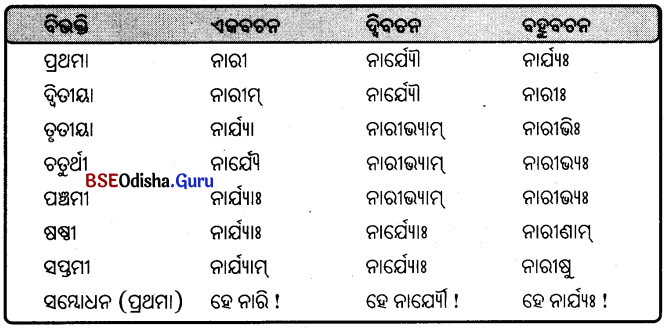
ବି.ଦ୍ର. – ନଗରୀ, କୁମାରୀ, ଗୌରୀ, ସୁନ୍ଦରୀ, ପୁରୀ ପ୍ରଭୃତି ଶବ୍ଦର ରୂପ ନାରୀ ଶବ୍ଦପରି ହୁଏ ।
ନଦୀ ଶବ୍ଦରୂପାଶାଂ ପ୍ରୟୋଗାନ୍ ପଶ୍ୟ ।
(କ) ଇୟଂ ଯମୁନାନଦୀ ଅସ୍ଥି ।
Answer:
ଏହା ଯମୁନା ନଦୀ ।
(ଖ) ଅହଂ ନଦୀ ଗଚ୍ଛାମି ।
Answer:
ମୁଁ ନଈକୁ ଯାଇଛି ।
(ଗ) ଅୟଂ ମାର୍ଗ ନଦ୍ୟା ସହ ଯାତି ।
Answer:
ଏହି ବାଟ ନଈ ସହିତ ଯାଇଛି ।

(ଘ) ଡଃ ନଦୌ ପୁଷ୍ପାଣି ସମର୍ପୟତି ।
Answer:
ସେ ନଈକୁ ଫୁଲ ସମର୍ପଣ କରେ ।
(ଙ) ମହିଳା ନମଃ ଜଳମ୍ ଆନୟନ୍ତି ।
Answer:
ମହିଳାମାନେ ନଈରୁ ପାଣି ଆଣୁଛନ୍ତି ।
(ଚ) ନଦ୍ୟା ତଟିଂ ସୁନ୍ଦରମ୍ ।
Answer:
ନଈ କୂଳ ସୁନ୍ଦର ।
(ଛ) ସ୍ଵଂ ନଦ୍ୟା ସ୍ନାନଂ କରୋଷି ।
Answer:
ତୁମେ ନଈରେ ସ୍ନାନ କରୁଛ ।
(ଜ) ହେ ନଦି ! ୟଂ ପୂଜନୀୟ ।
Answer:
ହେ ନଈ ! ତୁମେ ପୂଜନୀୟ ।
ଅଭ୍ୟ।ସଃ
୧ । ‘ଭଗିନୀ’ ଶବ୍ଦସ୍ୟ ଉପଯୁକ୍ତବିଭକ୍ତିରୂପେ ଶୂନ୍ୟସ୍ଥାନାନି ପୂରୟତ ।
(କ) ମମ ଏକା ଜ୍ୟେଷ୍ଠା ______________ ଅସ୍ତି । ରମେଶସ୍ୟ ଦ୍ରେ କନିଷ୍ଠେ ______________ ସ୍ତଃ । ଅହଂ ______________ ସହ ସଂସ୍କୃତେନ ଆଳପାମି । ଜନ୍ମଦିନେ ______________ ଅହମ୍ ଉପହାରାନ୍ ଦଦାମି । ହରିଃ ______________ ସ୍ନିହ୍ୟତି । ହେ ______________, ସୂୟଂ ଗୀତାଂ ପଠତ ।
Answer:
ମମ ଏକା ଜ୍ୟେଷ୍ଠା ଭଗିନୀ ଅସ୍ଥି । ରମେଶସ୍ୟ ଦ୍ରେ କନିଷ୍ଠ ଭଗିନେ ଡଃ । ଅହଂ ଭଗ୍ନ୍ୟ ସହ ସଂସ୍କୃତେନ ଆଳପାମି । ଜନ୍ମଦିନେ ଭଗ୍ନ୍ୟା ଅହମ୍ ଉପହାରାନ୍ ଦଦାମି । ହରି ଭଗିନ୍ୟା ସ୍ନାହ୍ୟତି । ହେ ଭଗିନ୍ୟ, ସୂୟଂ ଗୀତାଂ ପଠତ ।
୨ । ଉଦାହରଣାନୁସାରଂ ରିକ୍ତସ୍ଥାନାନି ପୂରୟତ ।
ଉଦାହରଣମ୍ : ଇୟଂ ଲକ୍ଷ୍ମୀ ଅସ୍ଥି । ଲକ୍ଷ୍ୟାଃ ହସ୍ତେ କମଳମ୍ ଅଛି ।
(କ) ଇୟଂ ସରସ୍ବତୀ ଅସ୍ତି । ______________ ହସ୍ତେ ବୀଣା ଅସ୍ତି ।
Answer:
ସରସ୍ଵତ୍ଯା
(ଖ) ଇୟଂ ମହାକାଳୀ ଅସ୍ତ । ______________ ହସ୍ତେ ଖଡ୍ଗ ଅସ୍ଥି ।
Answer:
ମହାକାଳ
(ଗ) ଇୟଂ ଗୃହିଣୀ ଅସ୍ଥି । ______________ ହସ୍ତେ ସ୍ଥାଲୀ ଅସ୍ଥି ।
Answer:
ଗୃହିଣ୍ଯା
୩ । ନିର୍ଦ୍ଦେଶାନୁସାରଂ ବିଭକ୍ତି ରୂପାଣି ଲିଖତ ।
|
|
ଏକବଚନ |
ଦ୍ଵିବଚନ |
ବହୁବଚନ |
| (କ) ପୁତ୍ରୀ |
ପ୍ରଥମା ବିଭକ୍ତି |
|
|
|
| (ଖ) ଜନନୀ |
ଦ୍ଵିତୀୟା ବିଭକ୍ତି |
|
|
|
| (ଗ) ନଗରୀ |
ତୃତୀୟା ବିଭକ୍ତି |
|
|
|
| (ଘ) ବାସ୍ମେବୀ |
ଚତୁର୍ଥୀ ବିଭକ୍ତି |
|
|
|
| (ଙ) ବିଦୁଷୀ |
ପଞ୍ଚମୀ ବିଭକ୍ତି |
|
|
|
| (ଚ) କୁମାରୀ |
ଷଷ୍ଠୀ ବିଭକ୍ତି |
|
|
|
| (ଛ) ଶ୍ରେଣୀ |
ସପ୍ତମୀ ବିଭକ୍ତି |
|
|
|
Answer:
|
|
ଏକବଚନ |
ଦ୍ଵିବଚନ |
ବହୁବଚନ |
| (କ) ପୁତ୍ରୀ |
ପ୍ରଥମା ବିଭକ୍ତି |
ପୁତ୍ରୀ |
ପୂତ୍ରୟୌ |
ପୁତ୍ର୍ୟଃ |
| (ଖ) ଜନନୀ |
ଦ୍ଵିତୀୟା ବିଭକ୍ତି |
ଜନନୀଂ |
ଜନନେ୍ୟୗ |
ଜନନ୍ଯଃ |
| (ଗ) ନଗରୀ |
ତୃତୀୟା ବିଭକ୍ତି |
ନଗର୍ଯ୍ୟା |
ନଗରୀଭ୍ୟାମ୍ |
ନଗରୀଭିଃ |
| (ଘ) ବାସ୍ମେବୀ |
ଚତୁର୍ଥୀ ବିଭକ୍ତି |
ବାଗଦେବୈତ |
ବାଗଦେବୀଭ୍ୟାମ୍ |
ବାଗ୍ଦେବୀଭ୍ଯଃ |
| (ଙ) ବିଦୁଷୀ |
ପଞ୍ଚମୀ ବିଭକ୍ତି |
ବିଦୁଷଃ |
ବିଦୃଦ୍ଭ୍ୟାମ୍ |
ବିଦୂଦ୍ଭୟଃ |
| (ଚ) କୁମାରୀ |
ଷଷ୍ଠୀ ବିଭକ୍ତି |
କୁମାର୍ଯ୍ୟାଃ |
କୁମାର୍ଯ୍ୟୋଃ |
କୁମାରୀଣାମ୍ |
| (ଛ) ଶ୍ରେଣୀ |
ସପ୍ତମୀ ବିଭକ୍ତି |
ଶ୍ରେଣ୍ୟାମ୍ |
ଶ୍ରେଣ୍ୟୋଃ |
ଶ୍ରେଣୀଷୁ |
ଉକାରାନ୍ତ ପୁଂଲିଙ୍ଗ :
ଭାନୁ (ସୂର୍ଯ୍ୟ)
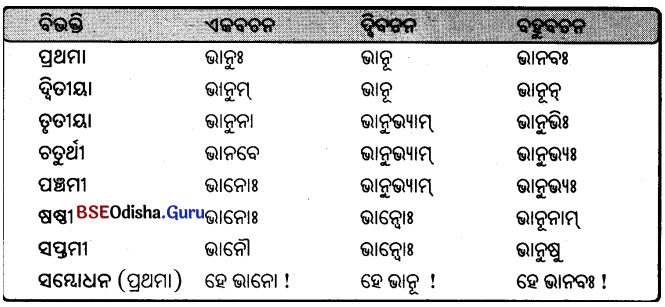
ଗୁରୁ, ସାଧୁ, ଶିଶୁ, ଲଘୁ, ବିଷ୍ଣୁ,ବାୟୁ, ବନ୍ଧୁ, ପଶୁ, ଋତୁ, ମଧୁ (ବସନ୍ତ), ଶତ୍ରୁ, ରିପୁ, ରେଣୁ, ବିନ୍ଦୁ, ସିନ୍ଧୁ, ଇନ୍ଦୁ, ବିଷ୍ଣୁ ବଟୁ (ବ୍ରହ୍ମଚାରୀ) ପ୍ରଭୃତି ଉ-କାରାନ୍ତ ପୁଂଲିଙ୍ଗ ଶବ୍ଦର ରୂପ ଭାନୁ ଶବ୍ଦରୂପ ପରି ।
ଗୁରୁଶବ୍ଦର ଷଷ୍ଠୀ ଓ ସପ୍ତମୀ ଦ୍ବିବଚନରେ ‘ଗୁର୍ବୋ’ ହୁଏ । ଅସୁ (ପ୍ରାଣ) ଶବ୍ଦର ଏକବଚନାନ୍ତ ଓ ଦ୍ଵିବଚନାନ୍ତ ରୂପ ନାହିଁ । ଏହା ନିତ୍ୟ ବହୁବଚନାନ୍ତ; ଯଥା — ଅସଦଃ, ଅସୂନ୍ ଇତ୍ୟାଦି ।

ଅଧୋଲିଖୁତଶ୍ଳୋକୌ ପଠତ ।
(କ) ଗୁରୁବ୍ରହ୍ମା ଗୁରୁବିଷ୍ଣୁଗୁରୁଦେବୋ ମହେଶ୍ଵରଃ ।
ଗୁରୁ ସାକ୍ଷାତ୍ ପରଂବ୍ରହ୍ମ ତସ୍ମି ଶ୍ରୀ ଗୁରବେ ନମଃ ॥
Answer:
ଗୁରୁବ୍ରହ୍ମା ଗୁରୁ ବିଷ୍ଣୁ ଗୁରୁଦେବ ମହେଶ୍ଵର ।
ଗୁରୁ ହିଁ ସାକ୍ଷାତ୍ ପରମ ବ୍ରହ୍ମ ସେହି ଗୁରୁଙ୍କୁ ପ୍ରଣାମ ।
(ଖ) ଅଜ୍ଞାନତିମିରାନ୍ଧସ୍ୟ ଜ୍ଞାନାଞ୍ଜନଶଳାକୟା ।
ଚକ୍ଷୁରୁନ୍ନୀଳିତଂ ଯେନ ତସ୍ମି ଶ୍ରୀଗୁରବେ ନମଃ ॥
Answer:
ଅଜ୍ଞାନ ଅନ୍ଧକାରରେ ଅନ୍ଧଥିବାବେଳେ ଯେଉଁ ଗୁରୁ ଜ୍ଞାନର ଅଞ୍ଜନ ଲଗାଇ
ମୋ ଆଖ୍ ଖୋଲିଦେଲେ ସେହି ଗୁରୁଙ୍କୁ ପ୍ରଣାମ ।
ଅଭ୍ୟ।ସଃ
୧। ଉ-କାରାନ୍ତମୂଳଶବ୍ଦାନ୍ ନିରୂପୟତ ।
(କ) ହେ ବଟୋ ! ତପୋବନେ ପଶତଃ ହିଂସାଂ ନ କୁର୍ବନ୍ତି । ( )
Answer:
ବଟୁ
(ଖ) ତତ୍ର ଭାନୋ ପ୍ରକାଶଃ ଭବତି । ( )
Answer:
ଭାନୁ
(ଗ) ତେ ସର୍ବେ ସାଧବ । ( )
Answer:
ସାଧୁ
(ଘ) ବୟଂ ପରସ୍ପରଂ ବନ୍ଧନଃ ଇବ ତିଷ୍ଠାମଃ । ( )
Answer:
ବନ୍ଧୁ
(ଙ) ଜନ୍ତତଃ ମରଣଶୀଳା । ( )
Answer:
ଜନ୍ତୁ
୨ । ରିକ୍ତସ୍ଥାନାନି ପୂରୟତ ।
|
|
ଏକବଚନ |
ଦ୍ଵିବଚନ |
ବହୁବଚନ |
| (କ) ପ୍ରଥମା (ବଟୁ) |
ବଟୁଃ |
ବଟ୍ |
ବଟ୍ |
ବଟବଃ |
| (ଖ) ଦିତୀୟା (ଗୁରୁ) |
ଗୁରୁଂ |
ଗୁରୁ |
ଗୁରୁ |
ଗୁରୂନା |
| (ଗ) ତୃତୀୟା (ଭାନୁ) |
ଭାନୁନା |
ଭାନୁଭ୍ୟାଂ |
ଭାନୁଭ୍ୟାଂ |
ଭାନୁଭିଃ |
| (ଘ) ଚତୁର୍ଥୀ (ଦୟାଳୁ) |
ଦୟାଳବେ |
ଦୟାଳୁଭ୍ୟାମ୍ |
ଦୟାଳୁଭ୍ୟାମ୍ |
ଦୟାଳୁଭ୍ୟଃ |
| (ଙ) ପଞ୍ଚମୀ (ବନ୍ଧୁ) |
ବନ୍ଧୋଃ |
ବନ୍ଧୁଭ୍ୟାମ୍ |
ବନ୍ଧୁଭ୍ୟାମ୍ |
ବନ୍ଧୁଭ୍ୟଃ |
| (ଚ) ଷଷ୍ଠୀ (ଏଶ୍ରଦ୍ଧାକୁ) |
ଶ୍ରଦ୍ଧାଳୋଃ |
ଶ୍ରଦ୍ଧାଳୁଭ୍ୟାମ୍ |
ଶ୍ରଦ୍ଧାଳୁଭ୍ୟାମ୍ |
ଶ୍ରଦ୍ଧାଳୁଭ୍ୟଃ |
| (ଛ) ସପ୍ତମୀ (ଦୀନବନ୍ଧୁ) |
ଦୀନବନ୍ଧୋ |
ଦୀନବନ୍ଧ୍ବୋଃ |
ଦୀନବନ୍ଧ୍ବୋଃ |
ଦୀନବନ୍ଧୁଷୁ |
| (ଜ) ସମୋଧନ (ରିପୁ) |
ହେ ରିପୋ ! |
ହେ ରିପୁ ! |
ହେ ରିପୁ ! |
ହେ ରିପବଃ ! |
(ଖ) ଉକାରାନ୍ତ ସ୍ତ୍ରୀଲିଙ୍ଗ :
ଧେନୁ
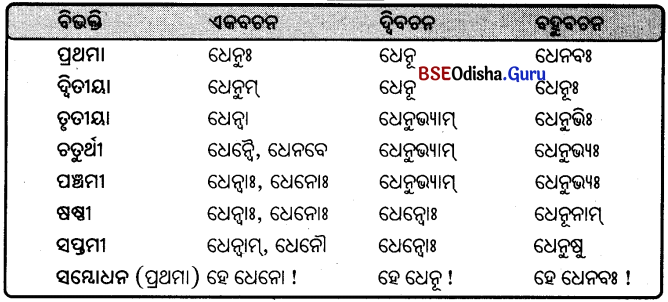
ତନୁ (ଶରୀର) ରଜ୍ଜୁ (ଦଉଡ଼ି), ରେଣୁ ଓ ସ୍ନାୟୁ ପ୍ରଭୃତି ଉ-କାରାନ୍ତ ଉ-କାରାନ୍ତ ସ୍ତ୍ରୀଲିଙ୍ଗ ରୂପ ଧେନୁ ଶବ୍ଦରୂପ ପରି ହେବ ।
ଅଧୋଲିଖ୍ତାନି ବାକ୍ୟାନି ପଠତ ।
ଇୟଂ ମମ ଧେନୁଃ । ଅହମ୍ ଇମାଂ ଧେନୁ ସ୍ନେହେନ ପାଳୟାମି । ଧେନ୍ସା ପରିବାରସଦସ୍ୟା ସୁସ୍ଥା । ଅହଂ ଧନବେ ପ୍ରଚୁରଂ ତୃଣଂ ଦଦାମି । ଧନୁଃ ପ୍ରଚୁରଂ ଦୁଗ୍ଧ ପ୍ରାପ୍ଲୋମି । ଧେନୁଃ ଗତିଃ ଦର୍ଶନୀୟା ଅସ୍ଥି । ଅହଂ ଧେତ୍ବାମ୍ ଅତୀବ ସ୍ପୃହ୍ୟାମି । ହେ ଥେନୋ ! ବଂ ମମ ଦ୍ଵିତୀୟା ମାତା ।
Answer:
ଇଏ ମୋର ଗାଈ । ମୁଁ ଏହି ଗାଈକୁ ସ୍ନେହରେ ପାଳନ କରେ । ଗାଈଦ୍ୱାରା ପରିବାର ସଦସ୍ୟମାନେ ସୁସ୍ଥ । ମୁଁ ଗାଈକୁ ପ୍ରଚୁର ଘାସ ଦିଏ । ଗାଈଠାରୁ ପ୍ରଚୁର ଦୁଧ ପାଏ । ଗାଈର ଚାଲି ଦର୍ଶନୀୟ I ମୁଁ ଗାଈକୁ ଭଲ ପାଏ । ହେ ଗାଈ ! ତୁମେ ମୋର ଦ୍ଵିତୀୟ ମାଆ ।

(ଗ) ଉକାରାନ୍ତ କ୍ଲବଲିଙ୍ଗ :
ମଧୁ
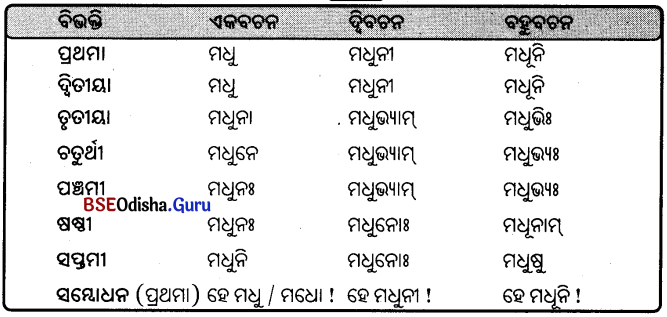
ଜାନୁ, ଅଶ୍ରୁ, ଦାରୁ, ବସ୍ତୁ, ଶ୍ମଶୁ, ତାଳୁ, ଅମ୍ବୁ ଇତ୍ୟାଦି ସମସ୍ତ ଉକାରାନ୍ତ ନପୁଂସକଲିଙ୍ଗ ଶବ୍ଦର ରୂପ ମଧୁଶବ୍ଦ ରୂପପରି ।
ଅଧୋଲିଖ୍ତାନି ବାକ୍ୟାନି ପଠତ ।
ମହାଶୟ ଭବତଃ ! ସକାଶେ ମଧୁ ଅସ୍ଥି କିମ୍ ? ଅହଂ କିଞ୍ଚ୍ ମଧୁ ଇଚ୍ଛାମି । ମଧୁନା ସହ ଔଷଧ୍ୱଂ ଖାଦିଷ୍ୟାମି । ଅତୋଽହଂ ମଧୁନେ ଅତ୍ର ଆଗତଃ । ମଧୁନଃ ଦୂରେ ଗ ମଧୁପଃ ନ ଇଚ୍ଛତି । ମଧୁନଃ ସ୍ବାଦଃ ଅଧିକ । ମଧୁନି ବହନଃ ଗୁଣା ସନ୍ତି । ହେ ମଧୁ ! ତ୍ୱମ୍ ଅତୀବ ହିତକାରୀ ।
Answer:
ମହାଶୟ ଆପଣଙ୍କ ପାଖରେ ମହୁ ଅଛି କି ? ମୁଁ କିଛି ମହୁ ଇଚ୍ଛାକରୁଛି । ମହୁ ସାଙ୍ଗରେ ଔଷଧ ଖାଇବି । ଏଣୁ ମୁଁ ମହୁପାଇଁ ଏଠାକୁ ଆସିଛି । ମହୁଠାରୁ ଦୂରକୁ ଯିବାକୁ ମହୁମାଛି ଇଚ୍ଛାକରୁ ନାହିଁ । ମହୁର ସ୍ବାଦ ଅଧିକ । ମହୁରେ ବହୁତ ଗୁଣ ଅଛି । ହେ ମହୁ ! ତୁମେ ଅତ୍ୟନ୍ତ ହିତକାରୀ ।
ଅଭ୍ୟାସଃ
୧ । ଅଧଃ ପୁଂଲିଙ୍ଗ-ନପୁଂସକଲିଙ୍ଗଶବ୍ଦାନାଂ ମିଶ୍ରଣଂ ବର୍ଷତେ । ପୃଥକ୍ କୁରୁତ ।
ମଧୁ, ସାଧୁ, ଗୁରୁ, ବସୁ, ଅଶ୍ରୁ, ବସ୍ତୁ, ବନ୍ଧୁ, ଅମ୍ବୁ, ଶିଶୁ ।
ପୁଂଲିଙ୍ଗ ଶବ୍ଦ : ______________
Answer:
ସାଧୁ, ଗୁରୁ, ବନ୍ଧୁ, ଶିଶୁ, ବସୁ
ନପୁଂସକ ଲିଙ୍ଗ ଶବ୍ଦ : ______________
Answer:
ମଧୁ, ଅଶ୍ରୁ, ବସ୍ତୁ, ଅମ୍ବୁ
୨ । ନିମ୍ନସ୍ଥିତବିଶେଷଣପଦୟୋ ଯଥାନିର୍ଦ୍ଦେଶମ୍ ଉତ୍ତରଂ ଦେହି ।
|
ବହୁ, ସ୍ବାଦୁ |
ପୁଂଲିଙ୍ଗ ବହୁବଚନ |
ନପୁଂସକ |
ବହୁବଚନ |
| ଯଥା : |
ପ୍ରଥମା |
ବହବ, ସ୍ଵାଦବଃ |
ବହୁନି |
ସ୍ବାଦୂନି |
|
ଦ୍ବିତୀୟା |
ବହୂନ୍ନ, ସ୍ଵାଦୂନନ |
|
|
|
ତୃତୀୟା |
ବହୁଭିଃ, ସ୍ବାଦୁଭିଃ |
|
|
|
ଚତୁର୍ଥୀ |
ବହୁଭ୍ୟଃ, ସ୍ଵାଦୁଭ୍ୟଃ |
|
|
|
ପଞ୍ଚମୀ |
ବହୁଭ୍ୟଃ, ସ୍ବାଦୁଭ୍ୟଃ |
|
|
|
ଷଷ୍ଠୀ |
ବହୂନାମ୍, ସ୍ଵାଦୂନାମ୍ |
|
|
|
ସପ୍ତମୀ |
ବହୁଷୁ, ସ୍ଵାଦୁଷୁ |
|
|
Answer:
|
ବହୁ, ସ୍ବାଦୁ |
ପୁଂଲିଙ୍ଗ ବହୁବଚନ |
ନପୁଂସକ |
ବହୁବଚନ |
| ଯଥା : |
ପ୍ରଥମା |
ବହବ, ସ୍ଵାଦବଃ |
ବହୁନି |
ସ୍ବାଦୂନି |
|
ଦ୍ବିତୀୟା |
ବହୂନ୍ନ, ସ୍ଵାଦୂନନ |
ବହୁନି |
ସ୍ବାହୂନି |
|
ତୃତୀୟା |
ବହୁଭିଃ, ସ୍ବାଦୁଭିଃ |
ବହୁଭିଃ |
ସ୍ଵାଦୁଭିଃ |
|
ଚତୁର୍ଥୀ |
ବହୁଭ୍ୟଃ, ସ୍ଵାଦୁଭ୍ୟଃ |
ବହୁଭ୍ୟଃ |
ସ୍ବାଦୁଭ୍ୟଃ |
|
ପଞ୍ଚମୀ |
ବହୁଭ୍ୟଃ, ସ୍ବାଦୁଭ୍ୟଃ |
ବହୁଭ୍ୟଃ |
ସ୍ଵାଦୁଭ୍ୟଃ |
|
ଷଷ୍ଠୀ |
ବହୂନାମ୍, ସ୍ଵାଦୂନାମ୍ |
ବହୂନାମ୍ |
ସ୍ବାଦୂନାମ୍ |
|
ସପ୍ତମୀ |
ବହୁଷୁ, ସ୍ଵାଦୁଷୁ |
ବହୁଷୁ |
ସ୍ବାଦୁଷୁ |
(ଘ) ଉକାରାନ୍ତ ସ୍ତ୍ରୀଲିଙ୍ଗ :
ବଧୂ
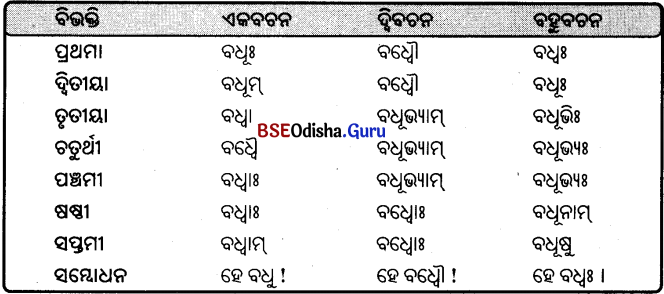
ଚମ୍ପୂ (ସେନାପତି), ଚମ୍ପୂ (ଥଣ୍ଟ), ତନୂ (ଶରୀର), ପୁତ୍ରବଧୂ (ବୋହୂ), ଶ୍ବଶୁ (ଶାଶୁ), ସରଯୂ (ସରଯୂ ନଦୀ) ପ୍ରଭୃତି ଊ-କାରାନ୍ତ ସ୍ତ୍ରୀଲିଙ୍ଗ ଶବ୍ଦର ରୂପ ବଧୂ ଶବ୍ଦରୂପ ପରି । ପ୍ରସୂ (ଜନ୍ମଦାତ୍ରୀ) ଶବ୍ଦର ରୂପ ଦ୍ଵିତୀୟା ଏକବଚନ ଓ ବହୁବଚନରେ ଯଥାକ୍ରମେ ‘ପ୍ରସୂମ୍’ ଓ ‘ପ୍ରସୂ’ ହୁଏ ।
ବାକ୍ୟପ୍ରୟୋଗ :
ଇୟଂ ନବବଧୂ ଲଜ୍ଜାଶୀଳା । ଇମାଂ ନେଷ୍ୟନ୍ତ । ଅଦୌ ନବବର୍ଷେ ତାସୁ କାଣ୍ଟନ ନବବଧ୍ବା ରୂପମ୍ ଅତୀବ ସୁନ୍ଦରମ୍ । ଅସ୍ୟା ସାମଞ୍ଜସ୍ୟ ପ୍ରତିଷ୍ଠାପୟ । ନବବଧୂ ଦ୍ରଷ୍ଟୁମ୍ ଅଦ୍ୟ ପ୍ରିୟ ଆଗତା । ଅନୟା ନବବଧୂ ସହ ତା ବହୁକାଳଂ ଉପହାରାନ୍ ଦାସ୍ୟନ୍ତ । ତା ସର୍ବା ନବବଧ୍ଵ ମିଷ୍ଟାନ୍ନ ପ୍ରାପ୍ତବତ୍ୟ । ଅସ୍ୟାଂ ନବବଧ୍ୱଂ ସର୍ବେଷ ପ୍ରୀତିଃ ଗଭୀରା । ହେ ନବବଧୂ !, ପରିବାରେ ସର୍ବେଷୁ ସାମଞ୍ଜସ୍ୟ ପ୍ରତିଷ୍ଠାପୟ ।
Answer:
ଏହି ନୂଆ ବୋହୂ ଲଜ୍ଜାଶୀଳା । ଏହି ନୂଆ ବୋହୂକୁ ଦେଖୁବାକୁ ଆଜି ସ୍ତ୍ରୀଲୋକମାନେ ଆସିଥିଲେ । ଏହି ନୂଆବୋହୂ ସହିତ ସେମାନେ ବହୁ ସମୟ କଟାଇବେ । ଏହି ନୂଆବୋହୂକୁ ସେମାନଙ୍କମଧ୍ୟରୁ କେତେକ ଉପାହାର ଦେବେ । ସେମାନେ ସମସ୍ତେ ନୂଆବୋହୂଠାରୁ ମିଠେଇ ପାଇଲେ । ଏହି ନୂଆବୋହୂର ରୂପ ଅତିସୁନ୍ଦର । ଏହି ନୂଆ ବୋହୂଠାରେ ସମସ୍ତଙ୍କ ଶ୍ରଦ୍ଧା ଗଭୀର । ହେ ନୂଆବୋହୂ ! ପରିବାରରେ ସମସ୍ତଙ୍କଠାରେ ସାମଞ୍ଜସ୍ୟ ରକ୍ଷା କରେ ।
ଋ-କାରାନ୍ତ ପୁଂଲିଙ୍ଗ :
ପିତୃ
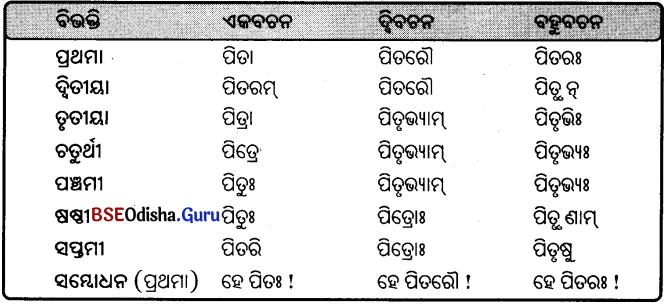
ଭ୍ରାତୃ, ଦେବ, ଜାମାତ୍ମା, ନୃ- ଏଇ କେତୋଟି ଶବ୍ଦର ରୂପ ପିତୃ ଶବ୍ଦର ରୂପପରି । କେବଳ ‘ନୃ’ ଶବ୍ଦର ଷଷ୍ଠୀ ବହୁବଚନରେ ଦୁଇପ୍ରକାର ରୂପ ହୁଏ; ଯଥା – ନୂ ଣାମ୍ ଓ ମୃଣାମ୍ । (ନୂ – ନର)
ପିତା ମାତା ନନାନ୍ଦା ନା ସଜ୍ୟେଷ୍ଟ୍-ଭ୍ରାତୃ-ମାତରଃ ।
ଜାମାତା ଦୁହିତା ଦେବା ନ ତୁନନ୍ତା ଇମେ ଦଶ ॥
ଏଇ ଦଶଟି ଶବ୍ଦର ପ୍ରଥମା ଦ୍ବିବଚନଠାରୁ ଚାରିଗୋଟି ବିଭକ୍ତି ରୂପରେ ଅନ୍ୟ ଋକାରର ବୃଦ୍ଧି (ଆର୍) ହୁଏ ନାହିଁ । ଏହା ମଧ୍ଯରେ ମାତୃ, ନନାନ୍ଦ୍ୟ, ଯାତୃ ଓ ଦୁହିତୃ ଶବ୍ଦ ସ୍ତ୍ରୀଲିଙ୍ଗ, ବାକିତକ ପୁଂଲିଙ୍ଗ ।

ଦାତୃ
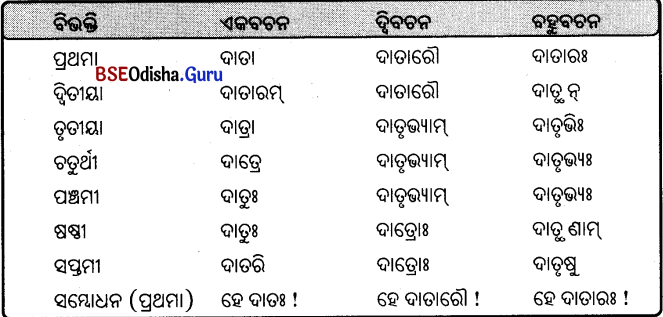
ଧାତୁ (ଧାରଣକର୍ତ୍ତା), ବିଧାତ୍ମ (ଭଗବାନ), କର୍ଡ଼ (କର୍ମା), ଶ୍ରୋତୃ (ଶୁଣିବାଲୋକ), ନେତୃ (ନେତା), ସବିତ୍ବ (ସୂର୍ଯ୍ୟ), ପ୍ରଣେତୃ (ପ୍ରଣେତା), ଶିକ୍ଷୟିତ୍ବ (ଶିକ୍ଷିକା), ରକ୍ଷୟିତୃ (ରକ୍ଷିକା), ଅଧ୍ୟାତ୍ମ (ଅଧ୍ୟାତା) ଓ ହର୍ଭୂ (ହରଣକର୍ତ୍ତା) ପ୍ରଭୃତି ଋ କାରାନ୍ତ ପୁଂଲିଙ୍ଗ ଶବ୍ଦର ରୂପ ଦାତୃଶବ୍ଦର ରୂପପରି ।
ବାକ୍ୟପ୍ରୟୋଗ :
ମମ ପିତା ଦାତା ଅଛି । ଅହଂ ମମ ଦାତାରଂ ପିତରଂ ନମାମି । ମମ ଦାତ୍ରା ପିତ୍ରା ଦାନଂ ଦୀୟତେ । ମମ ଦାତ୍ରେ ପିତ୍ରେ ଅନ୍ୟତ୍ କିମପି ନ ରୋଚତେ । ଡଃ ମମ ଦାତୁଃ ପିତୁଃ ଦାନଂ ସ୍ୱୀକରୋତି । ସର୍ବେ ମମ ଦାତୁଃ ପିତୁଃ ସ୍ମରଣଂ କୁର୍ବନ୍ତି । ପୁନଃ ଦାତରି ପିତରି ସାଧୁ । ହେ ଦାତଃ ପିତଃ, ଭବାନ୍ ମହାନ୍ ଖଳୁ ।
Answer:
ମୋ ବାପା ଦାତା ଅଟନ୍ତି । ମୁଁ ମୋ ଦାନୀ ବାପାଙ୍କୁ ପ୍ରଣାମ କରେ । ମୋ ଦାନୀ ବାପା ଦାନ ଦିଅନ୍ତି । ମୋ ଦାନୀ ବାପାଙ୍କୁ ଅନ୍ୟ କିଛି ଭଲ ଲାଗେ ନାହିଁ । ସେ ମୋ ଦାନୀ ବାପାଙ୍କଠାରୁ ଦାନ ଗ୍ରହଣକରନ୍ତି । ସମସ୍ତେ ମୋ ଦାନୀ ବାପାଙ୍କୁ ମନେପକାନ୍ତି । ପୁଅ ଦାନୀ ବାପାଙ୍କଠାରେ ସାଧୁ । ହେ ଦାନୀ ବାପା ! ଆପଣ ପ୍ରକୃତରେ ମହାନ୍ ।
ଅଭ୍ୟାସଃ
୧ । ରେଖାଙ୍କିତ ସ୍ଥାନେଷୁ ପିତୃଶବ୍ଦସ୍ୟ ଯଥାର୍ଥରୂପେ ପୁନର୍ଲେଖନଂ କୁରୁତ ।
ଦଶରଥ ରାମସ୍ୟ ______________ ଆସୀତ୍ । ସଃ ______________ ଆଜ୍ଞୟା ବନଂ ଗତବାନ । ତଥ୍ୟ ______________ ଶ୍ରଦ୍ଧା ଆସୀତ୍ । ______________ ଦରଃ ଆଦେଶଃ ପାଳନୀୟ ।
Answer:
ଦଶରଥ ରାମସ୍ୟ ପିତା ଆସୀତ୍ । ସଃ ପିତୁଃ ଆଜ୍ଞୟା ବନଂ ଗତବାନ । ତଥ୍ୟ ପିତରି ଶ୍ରଦ୍ଧା ଆସୀତ୍ । ପିତ୍ରା ଦରଃ ଆଦେଶଃ ପାଳନୀୟ ।
୨ । ବାକ୍ୟସ୍ଥିତାନାଂ ରେଖାଙ୍କିତପଦାନାଂ ମୂଳଶବ୍ଦ ବିଭଣ୍ଡିଂ ବଚନଂ ଚ ନିରୂପୟତ ।
|
ମୂଳଶବ୍ଦ |
ବିଭଳ୍ତି |
ବଚନ |
| (କ) ପିତା ଞଷଧାଳୟଂ ଗଚତି । |
|
|
|
| (ଖ) ରାମଃ ଦାତାରଂ ନମତି । |
|
|
|
| (ଗ) ଦୋଘ୍ମା ଗୋପାଳନନ୍ଦନଃ । |
|
|
|
| (ଘ) ରାମାୟଣସ୍ୟ ରଚୟିତୁଃ ନାମ କିମ୍ ? |
|
|
|
| (ଙ) ଅତ୍ର ସର୍ବେ ବିକ୍ରେତାରଃ । |
|
|
|
| (ଚ) ବକ୍ତେ କିଂ ଦାସ୍ୟସି ? |
|
|
|
| (ଛ) ଭର୍ତରି ମମ ବିଶ୍ଵାସଃ ଅସି । |
|
|
|
| (ଜ) ତେ ନେତୁଃ ଚର୍ଚାଂ କୁର୍ବନ୍ତି । |
|
|
|
Answer:
|
ମୂଳଶବ୍ଦ |
ବିଭଳ୍ତି |
ବଚନ |
| (କ) ପିତା ଞଷଧାଳୟଂ ଗଚତି । |
ପିତୂ |
୧ମା |
ଏକବଚନ |
| (ଖ) ରାମଃ ଦାତାରଂ ନମତି । |
ଦୋଗ୍ଭୁ |
୨ୟା |
ଏକବଚନ |
| (ଗ) ଦୋଘ୍ମା ଗୋପାଳନନ୍ଦନଃ । |
ରଚୟିତୂ |
୧ମା |
ଏକବଚନ |
| (ଘ) ରାମାୟଣସ୍ୟ ରଚୟିତୁଃ ନାମ କିମ୍ ? |
ରଚୟିତୂ |
୬ଷ୍ଣୀ |
ଏକବଚନ |
| (ଙ) ଅତ୍ର ସର୍ବେ ବିକ୍ରେତାରଃ । |
ବିକ୍ରେତୃ |
ପ୍ରଥମା |
ବହୁବଚନ |
| (ଚ) ବକ୍ତେ କିଂ ଦାସ୍ୟସି ? |
ବସ୍ତୁ |
୪ର୍ଥୀ |
ଏକବଚନ |
| (ଛ) ଭର୍ତରି ମମ ବିଶ୍ଵାସଃ ଅସି । |
ଭର୍ଭୃ୍ |
ସପ୍ତମୀ |
ଏକବଚନ |
| (ଜ) ତେ ନେତୁଃ ଚର୍ଚାଂ କୁର୍ବନ୍ତି । |
ନେତୃ |
୬ଷ୍ରୀ |
ଏକବଚନ |
୩ । ଉଦାହରଣାନୁସାରଂ ବାକ୍ୟପରିବର୍ତ୍ତନଂ କୁରୁତ ।
ଯଥା – ପ୍ରଶ୍ନ – ଭର୍ରାରଃ ପ୍ରସନଃ ସନ୍ତି ।
Answer:
ଭର୍ରା ପ୍ରସନଃ ଅସ୍ଥି ।
ଅନୁବାଦ – ସ୍ୱାମୀମାନେ ଖୁସି ଅଛନ୍ତି ।
Answer:
ସ୍ଵାମୀ ଖୁସି ଅଟେ ।

(କ) ପିତରଃ ଭ୍ରାତୃଭ୍ୟଃ ଯଛନ୍ତି । __________________
Answer:
ପିତା ଭ୍ରାତ୍ରେ ଯଚ୍ଛତି ।
(ଖ) ଶ୍ରମିକାଃ କର୍ତ୍ତୃଭ୍ୟଃ ଧନାନି ନୟନ୍ତି । __________________
Answer:
ଶ୍ରମିକଃ କତୁଃ ଧନଂ ନୟତି ।
(ଗ) ପିତୃଭ୍ୟଃ ନମଃ । __________________
Answer:
ପିତ୍ରେ ନମଃ ।
(ଘ) ଜନଃ ନେତୃଭିଃ ସହ ଗଛନ୍ତି । __________________
Answer:
ଜନଃ ନେତ୍ରା ସହ ଗଚ୍ଛତି ।
(ଙ) ଲୋକାଃ ବସ୍ତୁ ଣାଂ ବଚନାନି ପାଳୟନ୍ତି । __________________
Answer:
ଲୋକଃ ବୟଃ ବଚନଂ ପାଳୟତି ।
୪ । ଶ୍ଳୋକଦ୍ବୟଂ ସ୍ମରତ । (ଶ୍ଳୋକଦୁଇଟି ମନେରଖ ।)
(କ) ପିତା ଧର୍ମ ପିତା ସ୍ୱର୍ଗ ପିତା ହି ପରମଂ ତପଃ ।
ପିତରି ପ୍ରୀତିମାପନ୍ତେ ପ୍ରୀୟନ୍ତେ ସର୍ବଦେବତା ।।
Answer:
ପିତା ଧର୍ମ ପିତା ସ୍ବର୍ଗ ପିତା ହିଁ ଶ୍ରେଷ୍ଠ ତପସ୍ୟା ।
ପିତାଙ୍କୁ ଖୁସି କଲେ ସମସ୍ତ ଦେବତା ଖୁସି ।
(ଖ) ପିତାହମସ୍ୟ ଜଗତୋ ମାତା ଧାତା ପିତାମହଃ ।
ବେଦ୍ୟ ପବିତ୍ରମୋଙ୍କାର ଋକ୍ସାମ-ଯଜୁରେବ ଚ ।। (ଗୀତା – ୯.୧୭)
Answer:
ମୁଁ ଏହି ଜଗତର ପିତା, ମାତା ଓ ଧାରଣକର୍ତ୍ତା
ପବିତ୍ର ଓଁକାର ଋଗ, ଯଜୁ ଓ ସାମ ବେଦକୁ ଜାଣିବା ଉଚିତ ।
୫ । କୋଷ୍ଠକସ୍ଥଶବ୍ଦସ୍ୟ ଉଚିତଂ ରୂପଂ ପ୍ରଯୁଜ୍ୟ ଶୂନ୍ୟସ୍ଥାନଂ ପୂରୟତ ।
(କ) ଦେବୋ ଦେବୀ ଚ ନଃ ସର୍ବସୁଖସ୍ୟ ______________ । (ଦାତୃ – ପ୍ରଥମା)
Answer:
ଦାତାରୌ
(ଖ) ______________ ଭଗବତେ ନମଃ । (ପରମଦାତ୍ମ – ୪ର୍ଥୀ)
Answer:
ପରମଦାତ୍ରେ
(ଗ) ପରମଦାତରି ______________ ଅବିଚଳା ଚ ଖ୍ୟାତ୍ ଅସ୍ଵାକଂ ଭକ୍ତି । (ବିଧାତୃ – ୭ମୀ)
Answer:
ବିଧାତରି
(ଘ) ______________ ଦେବାନ୍ ସର୍ବଦା ସ୍ମରାମଃ । (ଦାତୃ – ୨ୟା)
Answer:
ଦାତ୍ଥ ନ୍
ଋ-କାରାନ୍ତ ସ୍ତ୍ରୀଲିଙ୍ଗ :
ମାତୃ (ମା)
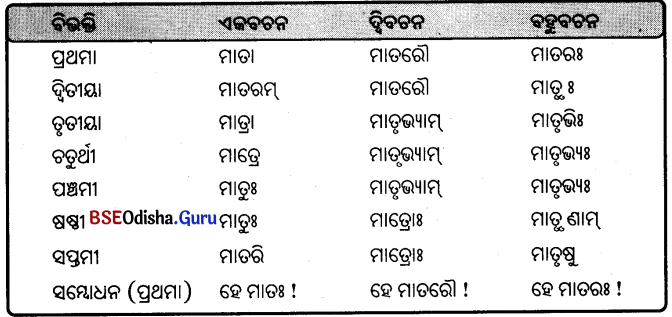
ସ୍ତ୍ରୀଲିଙ୍ଗ ୠକାରାନ୍ତ ଶବ୍ଦ ମୋଟରେ ପାଞ୍ଚଟି – ଦୁହିତୃ (ଝିଅ), ମାତୃ (ମାଆ), ଯାତୃ (ଯାଆ), ନନାହ୍ନ (ନଣନ୍ଦ) ଓ ସ୍ଵସ୍ଟ (ଭଉଣୀ) । ମାତୃ ଶବ୍ଦରୂପ ପରି ଦୁହିତୃ, ଯାତୃ ଓ ନନାନ୍ଦ୍ୟ ଶବ୍ଦରୂପ ହୁଏ । ସ୍ବଗ୍ଧ ଶବ୍ଦର ରୂପ ଦାତୃ ଶବ୍ଦରୂପ ପରି; ମାତ୍ର ଏହାର ଦ୍ଵିତୀୟା ବହୁବଚନରେ ‘ସ୍ଵସ୍ଥ୍ୟ ’ ହୁଏ ।
ମାତୃସ୍ଵସ୍ଟ (ମାଉସୀ) ଓ ପିତୃଷ୍ଣ (ପିଉସୀ) ଶବ୍ଦର ରୂପ ସ୍ଵସୃ (ଭଉଣୀ) ଶବ୍ଦର ରୂପ ପରି ।
ଅଭ୍ୟାସଃ
୧। ଅଧୋଲିଖୁବାକ୍ୟାନାଂ ମାତୃଭାଷୟା ଅନୁବାଦଂ କୁରୁତ ।
(ତଳେ ଥିବା ବାକ୍ୟଗୁଡ଼ିକୁ ମାତୃଭାଷାରେ ଅନୁବାଦ କର ।)
ଶ୍ରୀ ରାମଚନ୍ଦ୍ରସ୍ୟ ତିସ୍ର ମାତରଃ ଆସନ୍ ।
ଅନୁବାଦ – ଶ୍ରୀରାମଚନ୍ଦ୍ରଙ୍କର ତିନି ମାଆ ଥିଲେ ।
ଜନ୍ମଭୂମିଃ ଅସ୍ପୃକମ୍ ଅପରା ମାତା ।
ଅନୁବାଦ – ଜନ୍ମଭୂମି ଆମର ଅନ୍ୟ ମାଆ ।
ସଃ ଦ୍ବାଭ୍ୟାଂ ମାତୃଭ୍ୟା ପାଳିତଃ ।
ଅନୁବାଦ – ସେ ଦୁଇ ମାଆଙ୍କଦ୍ଵାରା ପାଳିତ ।
ସଃ ମାତୃଭ୍ୟ ଆଶିଷଂ ପ୍ରାଷ୍ଟୋତି ।
ଅନୁବାଦ– ସେ ମାଆଙ୍କଠାରୁ ଆଶିଷ ପାଉଛି ।
ହେ ମାତରୌ, ବୟଂ ଯୁବାଂ ନ ବିସ୍ମରାମଃ ।
ଅନୁବାଦ – ହେ ମାଆଦୁହେଁ ! ଆମେ ତୁମ ଦୁହିଁଙ୍କୁ ଭୁଲିନାହୁଁ ।
ହେ ମାତରଃ ! ଯୁଷ୍ମାନ୍ ବୟଂ ନିତ୍ୟଂ ନମାମଃ ।
ଅନୁବାଦ – ହେ ମାଆମାନେ ! ତୁମକୁ ଆମେ ନିତି ପ୍ରଣାମ କରୁଛୁ ।
ଶିଶୁଃ ମାତୁଃ ଅଙ୍କେ ଉପବିଶତି ।
ଅନୁବାଦ – ପିଲାଟି ମାଆକୋଳରେ ବସିଛି ।
ମାତ୍ରା ଭାଗବତଂ ପଠିତମ୍ ।
ଅନୁବାଦ – ମାଆ ଭାଗବତ ପଢ଼ିଲେ ।
୨ । ପିତୃଶବ୍ଦସ୍ଥାନେ ମାତୃଶବ୍ଦରୂପାଶାଂ ପ୍ରୟୋଗଂ କୁରୁତ ।
(ପିତୃଶବ୍ଦ ସ୍ଥାନରେ ମାତୃଶବ୍ଦ ରୂପର ପ୍ରୟୋଗ କର ।)
(କ) ତବ ପିତୁଃ ନାମ କିମ୍ ? ______________
Answer:
ତବ ମାତୁଃ ନାମ କିମ୍ ?
(ଖ) ବଂ କଂ ପିତ୍ରା ସହ ଗଚ୍ଛସି ? ______________
Answer:
ବଂ କିଂ ମାତ୍ରା ସହ ଗଚ୍ଛସି ?

(ଗ) ଅହଂ ପିତ୍ରେ ଭୋଜନମ୍ ଆନୟାମି । ______________
Answer:
ଅହଂ ମାତ୍ରେ ଭୋଜନମ୍ ଆନୟାମି ।
(ଘ) ସଃ ପିତୁଃ ଶାସନେ ତିଷ୍ଠତି । ______________
Answer:
ସଃ ମାତୁଃ ଶାସନେ ତିଷ୍ଠତି ।
(ଙ) ମମ ପିତରି ଭକ୍ତି ଅସ୍ଥି । ______________
Answer:
ମମ ମାତରି ଭକ୍ତି ଅସ୍ତି ।
ଓ-କାରାନ୍ତ ପୁଂଲିଙ୍ଗ / ସ୍ତ୍ରୀଲିଙ୍ଗ :
ଗୋ
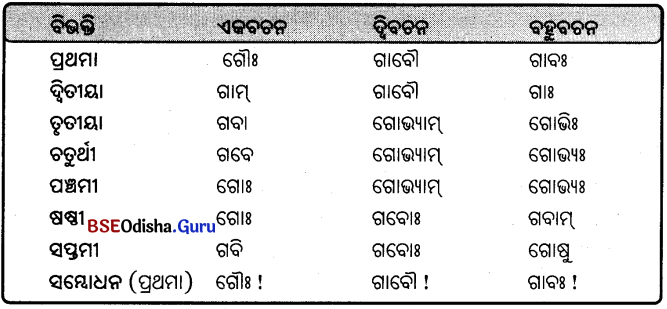
ଗୋ ଶବ୍ଦ ଗାଈକୁ ବୁଝାଉଥିଲେ ସ୍ତ୍ରୀଲିଙ୍ଗ ହୁଏ । ଯଥା – ଇୟଂ ଗୌଃ କୃଷ୍ଣା । (ଏହି ଗାଈ କଳା) ବୃଷଭ ଅର୍ଥରେ ‘ଅୟଂ ଗୌଃ କୃଷ୍ଣଃ’ । ଗୋ ଶବ୍ଦ ସମାସାନ୍ତ ହେଲେ ‘ଗବୀ’ ହୁଏ; ଯଥା – ଦେବଗବୀ । ଏହାର ରୂପ ନଦୀ ଶବ୍ଦପରି ହୁଏ ।
ବାକ୍ୟପ୍ରୟୋଗ (ପଶ୍ୟତ – ପଠତ) । ବାକ୍ୟ ପ୍ରୟୋଗ (ଦେଖ – ପଢ଼)
(କ) ଗାବ କ୍ଷେତ୍ରେ ଚରନ୍ତି ।
Answer:
ଗାଈମାନେ ବିଲରେ ଚରୁଛନ୍ତି ।
(ଖ) ଗୋପାଳ ଗା ଚାରୟତି ।
Answer:
ଗଉଡ଼ ଗାଈ ଚରାଉଛି ।
(ଗ) ସଃ ସଦା ଗୋତିଃ ସହ ତିଷ୍ଠତି ।
Answer:
ସେ ସବୁବେଳେ ଗାଈମାନଙ୍କ ସହିତ ରହେ ।
(ଘ) ଗୋଭ୍ୟଃ ପ୍ରଜାଭ୍ୟ ଚ ସୃଷ୍ଠି ।
Answer:
ଗୋରୁ ଓ ପ୍ରଜାମାନଙ୍କର ମଙ୍ଗଳ ହେଉ ।
(ଙ) ଗୋଭ୍ୟ ତୃଣାନି ଦେହି ।
Answer:
ଗୋରୁମାନଙ୍କୁ ଘାସ ଦିଅ ।
(ଚ) ବୟଂ ଗୋଭ୍ୟ ଦୁଗ୍ଧ ପ୍ରାପ୍ଲ ମଃ ।
Answer:
ଆମେ ଗୋରୁଙ୍କଠାରୁ ଦୁଧ ପାଉ ।
(ଛ) ଗତାଂ ମଧ୍ୟ ବସାମ୍ୟହମ୍ ।
Answer:
ମୁଁ ଗୋରୁମାନଙ୍କ ମଧ୍ୟରେ ବାସକରେ ।
(ଜ) ଗବାଂ ଗୋଷ୍ଠୀ ବା କୃଷ୍ଣା ବହୁକ୍ଷୀରା ।
Answer:
ଗାଈମାନଙ୍କ ମଧ୍ୟରେ କାଳିଗାଈ ବେଶୀ କ୍ଷୀର ଦିଏ ।
(ଝ) ଭାରତୀୟା ଗୋଷୁ ମାତୃବତ୍ ଭଣ୍ଡିଂ କୁର୍ବନ୍ତି ।
Answer:
ଭାରତୀୟମାନେ ଗାଈଙ୍କୁ ମାଆପରି ଭକ୍ତି କରନ୍ତି ।
ବ୍ୟଞ୍ଜନାନ୍ତ ଶବ୍ଦରୂପ
ଅନ୍ – ଭାଗାନ୍ତ ପୁଂଲିଙ୍ଗ
ରାଜନ୍ (ରାଜା)
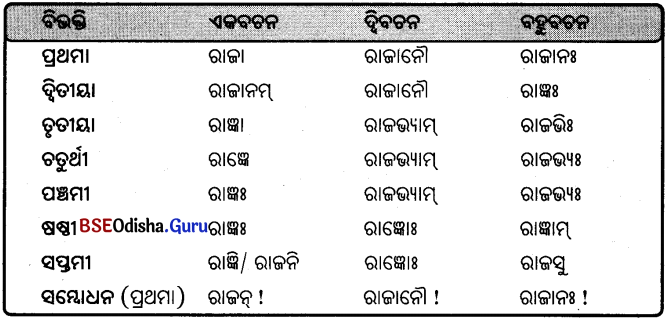
ମହାନ୍ ରାଜା = ମହାରାଜଃ (କର୍ମଧାରୟ) । କଳିଙ୍ଗାନାଂ ରାଜା = କଳିଙ୍ଗରାଜଃ (ଷଷ୍ଠୀ ତତ୍ତ୍ଵପୁରୁଷ) ଏହିପରି ଦେବରାଜ, ମଗଧରାଜ, ପଶୁରାଜ ଇତ୍ୟାଦି ରାଜାନ୍ତ ଶବ୍ଦଗୁଡ଼ିକର ରୂପ ବାଳକ ଶବ୍ଦରୂପ ପରି ହେବ ବୋଲି ମନେରଖୁବାକୁ ହେବ ।

ଆତ୍ମନ୍ (ଆତ୍ମା / ସ୍ଵୟମ୍ )
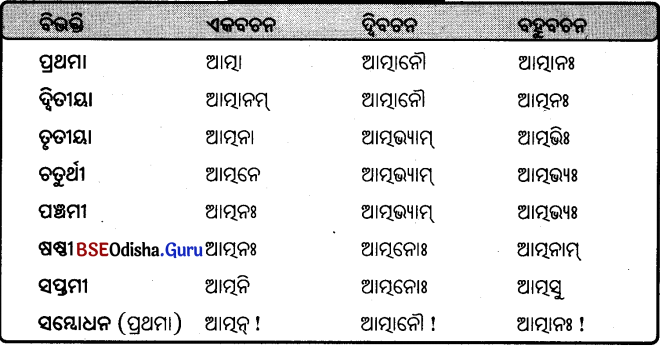
ବ୍ରହ୍ମନ୍, କୃତକର୍ମନ୍, ପରମାତ୍ମନ, ଜୀବାତ୍ମନ୍, ଧର୍ମାତ୍ମନ୍, ମହାମନ୍, କୃଷ୍ଣବର୍ସନ୍(ଅଗ୍ନି), ଦ୍ବିଜନ୍ମନ୍ ପ୍ରଭୃତି ଶବ୍ଦର ରୂପ ଆତ୍ମନ୍ ଶବ୍ଦରୂପ ପରି । ‘ଶୂନ୍’ ବ୍ୟତୀତ ଯେଉଁ ଶବ୍ଦର ‘ଅନ୍’ ପୂର୍ବସ୍ଥ ସଂଯୁକ୍ତ ବର୍ଣ୍ଣର ଅନ୍ତରେ ‘ମ’ କିମ୍ବା ‘ବ’ ଥାଏ । ସେସବୁ ଆତ୍ମନ୍ ପରି ରୂପ ହୁଅନ୍ତି ।
୧ । ବାକ୍ୟ ପ୍ରୟୋଗୀ ।
ଏକଃ ରାଜା ଆସୀତ୍ ।
Answer:
ଜଣେ ରାଜା ଥିଲେ ।
ପ୍ରଜାଃ ତଂ ରାଜାନଂ ଦେବମ୍ ଇତି ପୂଜୟନ୍ତି ।
Answer:
ପ୍ରଜାମାନେ ସେହି ରାଜାଙ୍କୁ ଦେବତା ପରି ସମ୍ମାନ କରନ୍ତି ।
ସେନାପତିଃ ରାଜ୍ଞା ସହ ଅଗଚ୍ଛତ୍ ।
Answer:
ସେନାପତି ରାଜାଙ୍କ ସହିତ ଗଲେ ।
ତସ୍ମି ରାଜ୍ଞ ସତ୍ୟବଚନଂ ରୋଚତେ ।
Answer:
ସେହି ରାଜାଙ୍କୁ ସତ୍ୟବଚନ ଭଲଲାଗେ ।
ତସ୍ମାତ୍ ରାଜ୍ଞଃ ପ୍ରଜାଃ ସାହାଯ୍ୟଂ ଲଭନ୍ତେ ।
Answer:
ସେହି ରାଜାଙ୍କଠାରୁ ପ୍ରଜାମାନେ ସାହାଯ୍ୟ ପାଉଛନ୍ତି ।
ତସ୍ୟ ରାଜ୍ଞଃ ନାମ ମୁଖେ ମୁଖେ ବର୍ଷତେ ।
Answer:
ସେହି ରାଜାଙ୍କ ନାମ ମୁହଁରେ ମୁହଁରେ ରହିଛି ।
ତସ୍ୟ ରାଜ୍ଞଃ କୀର୍ତ୍ତିଃ ସର୍ବେଃ ଗୀୟତେ ।
Answer:
ସେହି ରାଜାଙ୍କ କୀର୍ତ୍ତି ସମସ୍ତେ ଗାନକରୁଛନ୍ତି ।
ତସ୍ମିନ୍ ରାଞ୍ଜି ସର୍ବେଷା ପ୍ରୀତିଃ ବର୍ଗତେ ।
Answer:
ସେହି ରାଜାଙ୍କଠାରେ ସମସ୍ତଙ୍କ ପ୍ରୀତି ଅଛି ।
ହେ ରାଜନୁ ! ମୟି, ଦୟାଂ କୁରୁ ।
Answer:
ହେ ରାଜା ! ମୋତେ ଦୟା କର ।
୨ । ଅଧୋଲିଖୁବାକ୍ୟାନି ପଠତ ।
ଅୟମ୍ ଆତ୍ମା ବ୍ରହ୍ମ । ଯଃ ଆତ୍ମାନଂ ନ ଜାନାତି, ଡଃ କିମପି ନ ଜାନାତି । ଆତ୍ମାନମ୍ ଆତ୍ମନା ଜାନୀହି । ଆତ୍ମନେ ସର୍ବ କୁରୁ । ଶାନ୍ତଃ ଆତ୍ମନଃ ଏବ ଉଦ୍ଭବତି । ଆତ୍ମା ଏବ ଆତ୍ମନଃ ବନ୍ଧୁ । ଅତଃ ଆତ୍ମନି ବାସଂ କୁରୁ । ହେ ଆତ୍ମନ୍, ମୋହନିଦ୍ରା ପରିହର ।
Answer:
ଏହି ଆତ୍ମା ବ୍ରହ୍ମ । ଯିଏ ଆତ୍ମାକୁ ଜାଣେ ନାହିଁ । ସିଏ କିଛି ଜାଣି ନାହିଁ । ଅମ୍ବାଦ୍ଵାରା ଆତ୍ମାକୁ ଜାଣ । ନିଜପାଇଁ ସବୁ କର । ଆତ୍ମାରୁ ଶାନ୍ତି ଜନ୍ମେ । ଆତ୍ମା ହିଁ ଆତ୍ମାର ବନ୍ଧୁ । ଏଣୁ ଆତ୍ମାରେ ବାସ କର । ହେ ଆତ୍ମା ! ମୋହ ନିଦ୍ରା ଭଙ୍ଗ କର ।
(ଇନ୍-ଭାଗାନ୍ତ ପୁଂଲିଙ୍ଗ)
ଗୁଣିନ (ଗୁଣବାନ / ଗୁଣୀ )
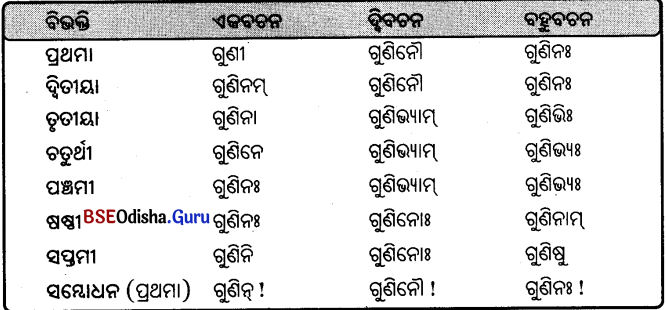
ଅର୍ଥିନ୍, ଏକାକିନ୍, କୃତିନ୍, ଜ୍ଞାନିନ୍, ଧନିନ୍, ତପସ୍ବିନ୍, ବଳିନ୍, ମଜ୍ଜିନ୍, ମେଧାବିନ୍, ରୋଗିନ୍, ସ୍ଟାମିନ୍, ମନସ୍ଵିନ୍, ପାପିନ୍, ଯୋଗିନ୍, ସାକ୍ଷିନ୍ ପ୍ରଭୃତି ଇନ୍-ଭାଗାନ୍ତ ପୁଂଲିଙ୍ଗ ଶବ୍ଦର ରୂପ ଗୁଣିନ୍ ଶବ୍ଦର ରୂପପରି ।
ବାକ୍ୟପ୍ରୟୋଗ ।
(କ) ଅୟଂ ଜନଃ ଗୁଣୀ ଅସ୍ଥି । ଇମଂ ଗୁଣିନଂ ଜନଂ ସର୍ବେ ଉପଗଛନ୍ତି । ଅସ୍ଥି ଗୁଣିନେ ଜନାୟ ତେ ଉପହାରାନ୍ ଯଛନ୍ତି । ଅନ୍ୟ ଗୁଣିନଃ ଜନସ୍ୟ ନିଜପରବୁଦ୍ଧି ନାସ୍ତି । ଅସ୍ମିନ୍ ଗୁଣିନେ ଜନେ ସର୍ବେ ସ୍ଟିହ୍ୟନ୍ତି । ଗୁଣିନଃ ଜନାତ୍ ସତ୍ଵପରାମର୍ଶ ଲଭ୍ୟତେ । ଗୁଣିନା ସଭା ବିଭାତି ।
Answer:
ଏହି ଲୋକଟି ଗୁଣବାନ । ଏହି ଗୁଣୀଲୋକ ପାଖକୁ ସମସ୍ତେ ଯାଆନ୍ତି । ଏହି ଗୁଣୀଲୋକକୁ ସେମାନେ ଉପହାର ଦିଅନ୍ତି । ଏହି ଗୁଣୀଲୋକର ଆପଣାପର ବୁଦ୍ଧି ନାହିଁ । ଏହି ଗୁଣୀଲୋକ କୁ ସମସ୍ତେ ଆଦର କରନ୍ତି । ଗୁଣୀଟି ଲୋକଠାରୁ ଠିକ୍ ପରାମର୍ଶ ମିଳେ । ଗୁଣୀଲୋକ ଦ୍ବାରା ସଭା ଶୋଭାପାଏ ।

ଅଭ୍ୟାସଃ
‘ଗୁଣୀ’ ଇତ୍ୟସ୍ୟ ସ୍ତ୍ରୀଲିଙ୍ଗରୂପଂ ‘ଗୁଣିନୀ’ ଭବତି । ତସ୍ୟ ରୂପାଣି ‘ନଦୀ’ ବତ୍ ଭବନ୍ତି ।
ଅଧୋଲିଷ୍କୃତଶବ୍ଦାନାଂ ସ୍ତ୍ରୀଲିଙ୍ଗରୂପଂ କିଂ ଭବେତ୍ ?
ଉଦାହରଣ : ଗୁଣୀ ଗୁଣିନୀ
ରୋଗୀ ରୋଗିଣୀ
ଞ୍କାନୀ ______________
Answer:
ଞ୍କାନିନୀ
ମେଧାବୀ ______________
Answer:
ମେଧାବିନୀ
ହସ୍ତୀ ______________
Answer:
ହସ୍ତିନୀ
ଏକାକୀ ______________
Answer:
ଏକାକିନୀ
କୁଶକୀ ______________
Answer:
କୁଶଳିନୀ
ଧନୀ ______________
Answer:
ଧନିନୀ
ତପସ୍ୱୀ ______________
Answer:
ତପସ୍ୱିନୀ
ପ୍ରତିବେଶୀ ______________
Answer:
ପ୍ରତିବେଶିନୀ
ଦୂରଦର୍ଶୀ ______________
Answer:
ଦୂରଦର୍ଶିନୀ
ସତ୍ୟବାଦୀ ______________
Answer:
ସତ୍ୟବାଦିନୀ
ବୈରୀ ______________
Answer:
ବୈରିଣୀ
ସାକ୍ଷୀ ______________
Answer:
ସାକ୍ଷିଣୀ
ଗୃହୀ ______________
Answer:
ଗୃହିଣୀ
ମନ୍ତୀ ______________
Answer:
ମନ୍ତିଣୀ
ଯନ୍ତୀ ______________
Answer:
ଯନ୍ତିଣୀ
ଉପକାରୀ ______________
Answer:
ଉପକାରିଣୀ
ମନୀଷୀ ______________
Answer:
ମନୀଷିଣୀ
ହିତାକାଙକ୍ଷୀ ______________
Answer:
ହିତାକାଙକ୍ଷିଣୀ
ମୃଦୁଭାଷୀ ______________
Answer:
ମୃଦୁଭାଷିଣୀ
ଦ୍ରୁତଚାରୀ ______________
Answer:
ଦ୍ରୁତଚାରିଣୀ
(ଇନ୍-ଭାଗାନ୍ତ ପୁଂଲିଙ୍ଗ)
ପଥନ୍ (ବାଟ/ ମାର୍ଗ)
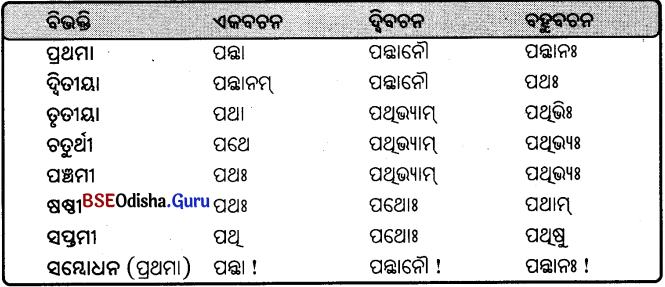
ମଥୁନ୍ (ମନ୍ଥନ –ଦଣ୍ଡ) ଶବ୍ଦର ରୂପ ପଥ ଶବ୍ଦର ରୂପପରି ।

ବାକ୍ୟପ୍ରୟୋଗଃ ।
ଜ୍ଞାନଂ ବିନା ଛାତ୍ରାଣଂ ନାନ୍ୟ ପନ୍ଥା ଅସ୍ତି । ତସ୍ମାତ୍ ଏବଂ ପନ୍ଥାନଂ ଛାତ୍ରା ସମାଶ୍ରୟରୁ । ଅନେନ ପଥା ଭଗବତଃ ଉପଲବ୍ଧି ସମ୍ଭବେତ୍ । ଅସ୍ଥି ପଥେ ଆତ୍ମସମର୍ପଣମ୍ ଆବଶ୍ୟକମ୍ । ଅର୍ଥାତ୍ ପଥ ବିଚ୍ୟୁତିଃ ମା ଭବେତ୍ । ଅସ୍ୟ ପଥ ଲଙ୍ଘନଂ ହାନିକାରକମ୍ । ତଥାପି ଅସ୍ମିନ୍ ପଥ୍ ମହାନ୍ ଆନନ୍ଦ ଅସ୍ତି ।
Answer:
ଜ୍ଞାନବିନା ଛାତ୍ରମାନଙ୍କର ଅନ୍ୟ ପନ୍ଥା ନାହିଁ । ତେଣୁ ଛାତ୍ରମାନେ ଏପରି ଗୋଟିଏ ପନ୍ଥା ଅବଲମ୍ବନ କରନ୍ତୁ । ଏହି ବାଟରେ ଭଗବାନଙ୍କ ଉପଲବ୍ଧି ସମ୍ଭବ । ଏହି ବାଟରେ ଆତ୍ମସମର୍ପ ଆବଶ୍ୟକ । ଏହି ପଥରୁ ବିଚ୍ୟୁତ ହେବା ଅନୁଚିତ । ଏହି ପଥ ଲଙ୍ଘନକରିବା ହାନିକାରକ; ତଥାପି ଏହି ବାଟରେ ବଡ଼ ଆନନ୍ଦ ଅଛି ।
ଅତ୍ ପ୍ରତ୍ୟୟାନ୍ତ –
ଗଚ୍ଛତ୍ (ପୁଂଲିଙ୍ଗ) (ଯାଉଥିବା, ଯାଉଯାଉ)
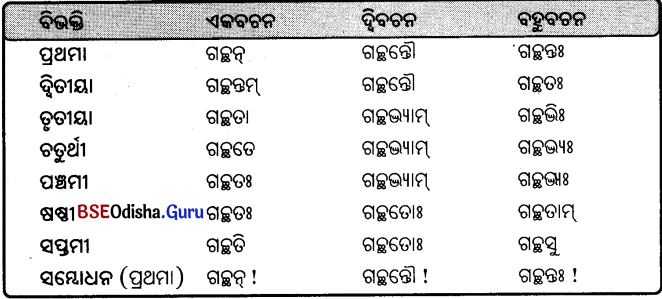
କରିଷ୍ୟତ୍, ଦାସ୍ୟତ୍, ପଠିଷ୍ୟତ୍, ଭବିଷ୍ୟତ୍, ଚଳତ୍, ଗାୟତ୍, ଇଚ୍ଛତ୍, କୁର୍ବତ୍, ଧାବତ୍, ତିଷ୍ଠତ୍, ବଦତ୍, ଧାୟତ୍, ଲିଖତ୍, ପଠତ୍, ଜୀବତ୍, ହସତ୍,ପ୍ରଭୃତି ଅତ୍-ପ୍ରତ୍ୟୟାନ୍ତ ଶବ୍ଦର ରୂପ ଗଚ୍ଛତ୍ ଶବ୍ଦର ରୂପପରି ।
କ୍ଲବଲିଙ୍ଗ ଗଚ୍ଛତ୍ ଶବ୍ଦର ପ୍ରଥମା, ଦ୍ଵିତୀୟା ଏବଂ ସମ୍ବୋଧନରେ ଗଚ୍ଛିତ୍, ଗଚ୍ଛତୀ ଓ ଗଛନ୍ତି ରୂପ ହୋଇଥାଏ । ସ୍ତ୍ରୀଲିଙ୍ଗ ଗଚ୍ଛତ୍ ଶବ୍ଦର ରୂପ ନଦୀ ଶବ୍ଦର ରୂପପରି; ଯଥା – ଗଛନ୍ତୀ, ଗଚ୍ଛନ୍ତେ, ଗଚ୍ଛନ୍ତ୍ଯ ଇତ୍ୟାଦି ।
ବତ୍-ପ୍ରତ୍ୟୟାନ୍ତ-ଭବତ୍ (ପୁଂଲିଙ୍ଗ) (ଆପଣ)
ଏହା ‘ଗଚ୍ଛତ୍’ ଶବ୍ଦପରି ରୂପ ହୁଏ । ପ୍ରଭେଦ କେବଳ ଏତିକି ଯେ ଏହାର ପ୍ରଥମା ଏକବଚନରେ ନ-କାର ପୂର୍ବବର୍ତ୍ତୀ ଅ-କାର ସ୍ଥାନରେ ଆ-କାର ହୁଏ । ପ୍ରଥମ ଏକବଚନ – ଭବାନ୍ । ସମ୍ବୋଧନ (ପ୍ରଥମା) ଭବନ୍ !
ଆୟୁଷ୍କତ୍, ଜ୍ୟୋତିଷ୍ମତ୍, ଦୀପ୍ତିମତ୍, ଧୀମତ୍, ଶ୍ରୀମତ୍, ବୁଦ୍ଧିମତ, ହନୁମତ୍, ମୂର୍ତ୍ତିମତ୍, ଭଗବତ୍, ବଳବତ୍, ବିଦ୍ୟାବତ୍, ହିମବତ୍, ବିବସ୍ଵତ୍, କିୟତ୍, ତାବତ୍, ଯାବତ୍, ଗତବତ୍, ଶ୍ରୁତବତ୍, କୃତବତ୍, ସ୍ଥିତବତ୍, ଉକ୍ତବତ୍ ଇତ୍ୟାଦି ମତୃପ୍-କ୍ତବତୁ ପ୍ରତ୍ୟାୟାନ୍ତ ଶବ୍ଦର ରୂପ ଭବତ୍ ଶବ୍ଦର ରୂପପରି ହୁଏ ।
ଉଦାହରଣମ୍ :
(୧) ଦୀପ୍ତି + ମତୁପ୍ → ମତ୍ = ଦୀପ୍ତିମତ୍ (ଦୀପ୍ତିମାନ୍ – ଦୀପ୍ତିମନ୍ତେ – ଦୀପ୍ତିମନ୍ତଃ)
ବୁଦ୍ଧି + ମତୁପ୍ → ମତ୍ = ବୁଦ୍ଧିମତ୍ (ବୁଦ୍ଧିମାନ୍ – ବୁଦ୍ଧିମନ୍ତେ – ବୁଦ୍ଧିମତଃ )
ହନୁ + ମତୁପ୍ → ମତ୍ = ହନୁମତ୍ (ହନୁମାନ୍ – ହନୁମନ୍ତେ – ହନୁମନ୍ତଃ)
ଆୟୁସ୍ + ମତୁପ୍ → ମତ୍ = ଆୟୁଷ୍ମତ୍ (ଆୟୁଷ୍ମାନ୍ – ଆୟୁଷ୍ମରୌ – ଆୟୁଷ୍ମନ୍ତଃ)
ବଳ + ମତୁପ୍ → ବହୁପ୍ → ବତ୍ = ବଳବତ୍ (ବଳବାନ୍ –ବଳବର୍ତ୍ତେ – ବଳବନ୍ତଃ )
ଭଗ + ମତୁପ୍ → ବତୁପ୍ → ବତ୍ = ଭଗବତ୍ (ଭଗବାନ୍ – ଭଗବର୍ତ୍ତେ – ଭଗବନ୍ତଃ)
ବିଦ୍ୟା + ମତୁପ୍ → ବତୁପ୍ → ବତ୍ = ବିଦ୍ୟାବତ୍ (ବିଦ୍ୟାବାନ୍ – ବିଦ୍ୟାବର୍ତ୍ତେ – ବିଦ୍ୟାବନ୍ତୀ)
ପଠ୍ + କ୍ତବତୁ = ପଠିତବତ୍ (ପଠିତବାନ୍ – ପଠିତବର୍ଷେ – ପଠିତବନ୍ତୀ)
ଗମ୍ + କ୍ତବତୁ = ଗତବତ୍ (ଗତବାନ୍ – ଗତବର୍ଷେ – ଗତବନ୍ତଃ)
ଜ୍ଞା + କ୍ତବତୁ = ଜ୍ଞାତବତ (ଜ୍ଞାତବାନ୍ – ଜ୍ଞାତବର୍ତ୍ତେ – ଜ୍ଞାତବନ୍ତଃ)
୨ । (କ) ନୈବ କିଞ୍ଚିତ୍ କରୋମୀତି ଯୁକ୍ତା ମନ୍ୟତ ତତ୍ତ୍ୱବିତ୍ ।
ପଶ୍ୟନ୍-ଶୁଣ୍ଠନ୍ ସ୍ପୃଶନ୍-ଜିଘ୍ରନ୍-ଅଶୁନ୍-ଗଚ୍ଛନ୍-ସ୍ବପନ୍-ଶ୍ୱସନ୍ । ଗୀତା – ୫.୮
(ଖ) ସ୍ପୃଶନ୍ନପି ଗଜୋ ହନ୍ତି ଜିଘ୍ରନ୍ଥପି ଭୁଜଙ୍ଗମ ।
ସ୍ପୃଶନ୍ନପି ନୃପୋ ହନ୍ତି ମାନୟନ୍ନପି ଦୁର୍ଜନଃ ।।
ଅଭ୍ୟାସଃ
୧। ବାକ୍ୟପ୍ରୟୋଗୀ ।
ଭବାନ କୁତ୍ର ଗଚ୍ଛତି ?
Answer:
ଆପଣ କୁଆଡ଼େ ଯାଉଛନ୍ତି ?
ଅହଂ ଭବନ୍ତ ପୃଚ୍ଛାମି ।
Answer:
ମୁଁ ଆପଣଙ୍କୁ ପଚାରୁଛି ।
କେଶବ ଭବତା ସହ ବିଦ୍ୟାଳୟମ୍ ଅଗଚ୍ଛତ୍ ।
Answer:
କେଶବ ଆପଣଙ୍କ ସହିତ ବିଦ୍ୟାଳୟକୁ ଗଲା ।
ସଃ ଭବତେ ପୁସ୍ତକାନି ଆନୟତି ।
Answer:
ସେ ଆପଣଙ୍କ ପାଇଁ ବହି ଆଣୁଛି ।
ଭବତଃ ଋତେ ମମ କୋଽପି ସହାୟଃ ନାସ୍ତି ।
Answer:
ଆପଣଙ୍କବିନା ମୋର କେହି ସହାୟ ନାହିଁ ।
କୁତ୍ର ଭବତଃ ଗୃହମ୍ ?
Answer:
ଆପଣଙ୍କ ଘର କେଉଁଠି ?
ମମ ବିଶ୍ଵାସ ଭବତି ଅସ୍ତ ।
Answer:
ଆପଣଙ୍କ ଉପରେ ମୋର ବିଶ୍ୱାସ ଅଛି ।

୨ । ‘ଭବତ୍’ ଇତ୍ୟସ୍ୟ ଶବ୍ଦସ୍ୟ ଦ୍ବିବଚନ-ବହୁବଚନ-ରୂପେ ବାକ୍ୟାନି ପୁନର୍ଲିଖତ ।
ଭବର୍ତ୍ତେ କୁତ୍ର ଗଛତଃ ? ଭବନ୍ତଃ କିଂ କୁର୍ବନ୍ତି ? ଭବନ୍ତୋ ଅହଂ ପୃଚ୍ଛାମି । ଭବତଃ ତେ ଅବଦନ । ଭବଭ୍ୟା ସହ ରାମ ଗମିଷ୍ୟତି । ଭବଭି ଏତତ୍ କରଣୀୟମ୍ । ଭବଭ୍ୟା ପିତା ଧନଂ ଦାସ୍ୟତି । ଭବଭ୍ୟ କିଂ ଦାସ୍ୟାମି । ଭବଭ୍ୟା କିଂ ପ୍ରାପ୍ସ୍ୟାମି । ଭବଭ୍ୟ ମମ ଗୁରତଃ ପୂଜ୍ୟ । ଭବତଃ କୃତେ କିମପି ନାସ୍ତି । ଭବତାଂ ଗ୍ରାମ କୁତ୍ର ? ଭବତଃ ମମ ସ୍ନେହ ଅସ୍ତି । ଭବସ୍ତୁ ଅହଂ ବିଶ୍ୱସିମି ।
ସ୍-କାରାନ୍ତ ପୁଂଲିଙ୍ଗ ଶବ୍ଦ
ବିଦ୍ବସ୍ (ବିଦ୍ବାନ୍ )
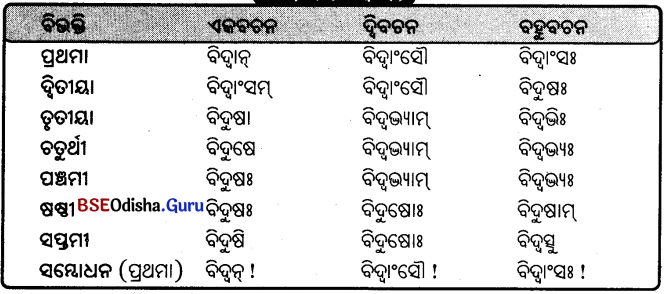
(ନିଷେଦିବସ୍ , ତଞ୍ଛିବସ୍, ପେଚିବସ୍ ଇତ୍ୟାଦି କେତେକ ବସ୍-ଭାଗାନ୍ତ ଶବ୍ଦର ବିଦ୍ବସ୍ ଶବ୍ଦପରି ରୂପ ହୁଏ ।)
ବାକ୍ୟପ୍ରୟୋଗଃ ।
ସ୍ଵଦେଶେ ପୂଜ୍ୟତେ ରାଜା, ବିଦ୍ୱାନ୍ ସର୍ବତ୍ର ପୂଜ୍ୟତେ ।
Answer:
ରାଜା ନିଜ ଦେଶରେ ପୂଜାପାଏ । ବିଦ୍ବାନ୍ ସବୁଠାରେ ପୂଜାପାଏ ।
ଜନଃ ଭକ୍ତ ବିଦ୍ୱାସଂ ପୂଜୟନ୍ତି ।
Answer:
ଲୋକମାନେ ଭକ୍ତିରେ ବିଦ୍ବାନଙ୍କୁ ସମ୍ମାନ କରନ୍ତି ।
ବିଦୂଷା ସମ୍ବନ୍ଧ କାର୍ଯ୍ୟ ।
Answer:
ବିଦ୍ୱାନଙ୍କ ସହିତ ସମ୍ବନ୍ଧ କରିବା ଉଚିତ ।
ବିଦୁଷେ ରାଜା ଧନାନି ଦଦାତି ।
Answer:
ବିଦ୍ୱାନଙ୍କୁ ରାଜା ଧନ ଦେଉଛନ୍ତି ।
ବିଦୁଷଃ ଜ୍ଞାନଂ ଲଭସ୍ବ ।
Answer:
ବିଦ୍ୱାନଙ୍କଠାରୁ ଜ୍ଞାନ ଲାଭକର ।
ବିଦୁଷଃ ବଚନଂ ପାଳୟ ।
Answer:
ବିଦ୍ବାନଙ୍କ କଥା ମାନ ।
ତବ ଶ୍ରଦ୍ଧା ବିଦୁଷି ତିଷ୍ଠତୁ ।
Answer:
ତୁମ ଶ୍ରଦ୍ଧା ବିଦ୍ୱାନଙ୍କଠାରେ ରହୁ ।
ହେ ବିଦ୍ଵନ୍ ! ନଂ ମେ ପ୍ରିୟଃ ।
Answer:
ହେ ବିଦ୍ବାନ୍ ! ତୁମେ ମୋର ପ୍ରିୟ ।
ଅସ୍-ଭାଗାନ୍ତ କ୍ଲବଲିଙ୍ଗ
ପୟସ୍ (କ୍ଷୀର, ଜଳ)
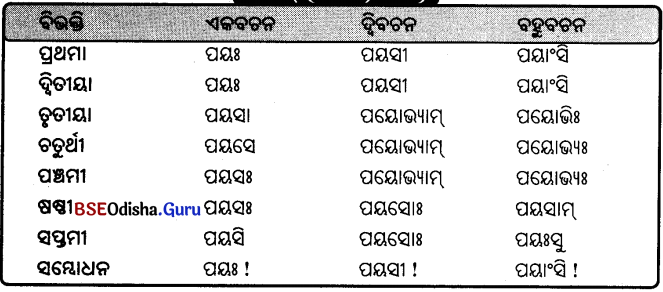
ଅୟସ୍ (ଲୁହା), ଆଗସ୍ (ପାପ), ଚେତସ୍ (ମନ), ଛନ୍ଦସ୍ (ବେଦ), ତପସ୍, ତମସ୍ (ଅନ୍ଧାର), ତେଜସ୍ (ତେଜ), ମନସ୍ (ମନ), ଯଶସ୍, ବୟସ୍, ସରସ୍, (ପୁଷ୍କରିଣୀ), ସ୍ରୋତସ୍ (ସୁଅ) ପ୍ରଭୃତି ଅସ୍ ଭାଗାନ୍ତ କ୍ଲବଲିଙ୍ଗ ଶବ୍ଦର ରୂପ ପୟସ୍ ଶବ୍ଦର ରୂପପରି ।
୧ । ସଂସ୍କୃତେନ ଅନୁବାଦଂ କୁରୁତ ।
ମନ ହି ସୁଖ ଦୁଃଖର କାରଣ ।
Answer:
ମନଃ ଏବ କାରଣଂ ବନ୍ଧମୋକ୍ଷୟୋ !
ତୁମେ ମନରେ ମା’ଙ୍କୁ ସ୍ମରଣ କର ।
Answer:
ତଂ ମନସା ମାତରଂ ସ୍ମର ।
ମନର ଅନ୍ୟ ନାମ ମାନସ ।
Answer:
ମନମଃ ନାମାନ୍ତରଂ ମାନମଃ ।
ମନରେ ବହୁପ୍ରକାର ବିଚାର ଆସେ ।
Answer:
ମନସି ବହୁବିଧଃ ବିଚାରଃ ଆୟାତି ।
ହେ ମନ, ତୁମେ ଶାନ୍ତ ହୁଅ ।
Answer:
ରେ ମନ ତଂ ଶାନ୍ତ ଭବ ।
୨ । ଉତ୍କଳଭାଷୟା ଅନୁବାଦଂ କୁରୁତ ।
ପ୍ରକାଶଃ ପୟସା ଓଦନଂ ଖାଦତି ।
Answer:
ପ୍ରକାଶ ଦୁଧଭାତ ଖାଉଛି ।
ପୟଃପାନଂ ଭୁଜଙ୍ଗାନାଂ କେବଳଂ ବିଷବର୍ଦ୍ଧନମ ।
Answer:
ସାପଙ୍କୁ ଖ୍ର ପିଆଇଲେ ବିଷ ବଢ଼େ ।
ତମସାୟା ଅନାବିଳଂ ପୟ ଦୃଷ୍ଟା ମୁନିଃ ସନ୍ତୁଷ୍ଟ ଅଭବତ୍ ।
Answer:
ତମସାର ନିର୍ମଳ ଜଳଦେଖ୍ ମୁନି ଖୁସି ହେଲେ ।

ଜୀବନେ କଦାଚିତ୍ର ଗଙ୍ଗାୟଃ ପୟସି ସ୍ନାନଂକୁରୁ ।
Answer:
ଜୀବନରେ କେବେ ଗଙ୍ଗା ଜଳରେ ସ୍ନାନ କର ।
ତସ୍ମାତ୍ ପୟସ କିଞ୍ଚ୍ ପିବ ।
Answer:
ସେହି ଖୁରରୁ କିଛି ପିଅ ।
୩ । ରେଖାଙ୍କିତପଦାନାଂ ମୂଳଶବ୍ଦ ବିଭକ୍ତିବଚନନିରୂପଣଂ ଚ ଯଥୋଦାହରଣଂ କୁରୁତ ।
ଯଥା – ହେ ପଥ୍ୟକ, ଜୀବନ୍ ନରଃ ଏବ କଲ୍ୟାଣଂ ପ୍ରାଷ୍ଟୋତି । ଜୀବନ୍ – ପ୍ରଥମ ବିଭକ୍ତି ଏକବଚନମ୍ ।
|
ପ୍ରଥମା |
ବିଭକ୍ତି |
ବଚନ |
| ଅୟଂ ତୁ ବିଦ୍ୱାନ୍ । |
୧ମା |
ବିଭକ୍ତି |
ଏକବଚନ |
| ଗଚ୍ଛନ୍ତ ମାଂ କିଂ ପ୍ରସ୍ଫୁମିଚ୍ଛତି ଭବାନ୍ ? |
୨ୟା |
ବିଭକ୍ତି |
ଏକବଚନ |
| ବିଦ୍ୱାସ କୀଦୃଶଂ ବ୍ୟବହାରମ୍ ଇଚ୍ଛନ୍ତି ? |
୧ମା |
ବିଭକ୍ତି |
ବହୁବଚନ |
| ଆତ୍ମନଃ ପ୍ରତିକୂଳାନି ପରେରାଂ ନ ସମାଚରେତ୍ । |
୬ଷ୍ଠୀ |
ବିଭକ୍ତି |
ଏକବଚନ |
| ମାନଃ ହି ମହତାଂ ଧନମ୍ । |
ଷଷ୍ଠୀ |
ବିଭକ୍ତି |
ବହୁବଚନ |
| ଉଦ୍ଧରେତ୍ ଆତ୍ମନା ଆତ୍ମାନମ୍ । |
ଦ୍ବିତୀୟା |
ବିଭକ୍ତି |
ଏକବଚନ |
| ହେ ଶ୍ରୀମନୌ, ଅୟମେବ ସମୁଚିତଃ ବ୍ୟବହାରଃ । |
୧ମା |
ବିଭକ୍ତି |
ଦ୍ବିବଚନ |
୪ । ଶୂନ୍ୟସ୍ଥାନାନି ପୂରୟତ ।
|
|
ଏକବଚନ |
ଦ୍ଵିବଚନ |
ବହୁବଚନ |
|
ପ୍ରଥମା |
ଭବାନୁ |
ଭବନ୍ତୌ |
ଭବନ୍ତଃ |
|
ଦ୍ବିତୀୟା |
ରାଜାନମ୍ |
ରାଜାନୌ |
ରାଞ୍ଚଃ |
|
ତୃତୀୟା |
ଗହଛୁତା |
ଗଚ୍ଛଭ୍ୟାଂ |
ଗଚ୍ଛଭିଃ |
|
ଚତୁର୍ଥୀ |
ଆମ୍ମନେ |
ଆତ୍ମଭ୍ୟାମ୍ |
ଆମ୍ମୁଭିଃ |
|
ପଞ୍ଚମୀ |
ଗୁଣିନଃ |
ଗୁଣିଭ୍ୟାଂ |
ଗୁଣିଭ୍ୟଃ |
|
ଷଷ୍ଠୀ |
ବିଦୁଷଃ |
ବିଦୁଷୋଃ |
ବିଦୁଷାମ୍ |
|
ସପ୍ତମୀ |
ଜୀବତି |
ଜୀବତୋଃ |
ଜୀବସ୍ତୁ |
୫ । ଯଥାନିର୍ଦ୍ଦିଷ୍ଟରୂପାଣି ଲିଖତ ।
(କ) ରାଜନ୍ ଷଷ୍ଠୀ ଏକବଚନ – ରାଜଃ ।
(ଖ) ଭବତ୍ ସପ୍ତମୀ ଦ୍ବିବଚନ – ଭବତୋ ।
(ଗ) ଆତ୍ମନ୍ ପଞ୍ଚମୀ ବହୁବଚନ – ଅମୂଲ୍ୟ ।
(ଘ) ବିଦ୍ବସ୍ ଚତୁର୍ଥୀ ଦ୍ବିବଚନ – ବିଦୁଷେ ।
(ଙ) ଗଚ୍ଛତ୍ ତୃତୀୟା ଏକବଚନ – ଗଚ୍ଛତା ।
(ଚ) ପଥନ୍ ଦ୍ବିତୀୟା ବହୁବଚନ – ପଥ ।
(ଛ) ଗୁଣିନ୍ ସପ୍ତମୀ ଦ୍ବିବଚନ – ଗୁଣିନୋ ।
(ଜ) ପୟସ୍ ଷଷ୍ଠୀ ଏକବଚନ – ପ୍ରିୟଦଃ ।
ସର୍ବନାମ ଶବ୍ଦ :
ରୂପର ବୈଲକ୍ଷଣ୍ୟ ଅନୁସାରେ ସର୍ବନାମ ଶବ୍ଦ ସକଳ (୩୩ଟି) ପାଞ୍ଚଟି ଶ୍ରେଣୀରେ ବିଭକ୍ତ; ଯଥା – ସର୍ବାଦି, ଅନ୍ୟାଦି, ପୂର୍ବାଦି, ଯଦାଦି ଏବଂ ଇଦମାଦି, ତନ୍ମଧ୍ୟରୁ ୭ଟି ଶବ୍ଦ ପାଠ୍ୟକ୍ରମର ଅନ୍ତର୍ଗତ ।
୧ । ସର୍ବ (ସମସ୍ତ, ସବୁ) (ପୁଂଲିଙ୍ଗ)
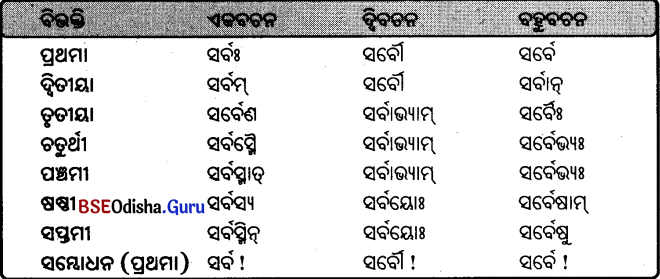
ସର୍ବ (ସ୍ତ୍ରୀଲିଙ୍ଗ)
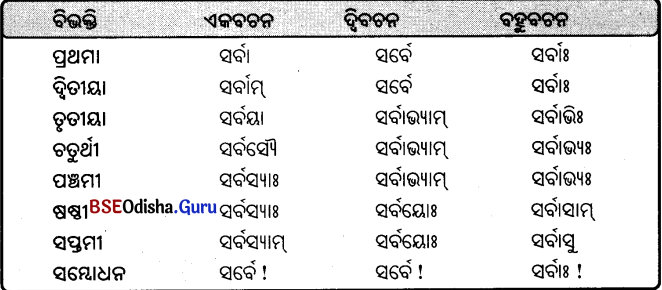
କ୍ଲୀବଲିଙ୍ଗ

ଅନ୍ୟ ବିଭକ୍ତିରେ ପୁଂଲିଙ୍ଗ ସର୍ବଶବ୍ଦର ରୂପପରି । ସର୍ବ, ବିଶ୍ବ, ଉଭ, ଉଭୟ, ଏକ, ଏକତମ – ଏଇ ଛଅଟି ଶବ୍ଦର ରୂପ ଏକାପରି ।
ସର୍ବଶବ୍ଦର ପୁଂଲିଙ୍ଗ ଏକବଚନ ପ୍ରୟୋଗ — ନହି ସର୍ବ ସର୍ବଂ ବେଭି ।
(ସମସ୍ତେ ସବୁ କଥା ଜାଣନ୍ତି ନାହିଁ ।)
ଦ୍ବିବଚନ ପ୍ରୟୋଗ – ସର୍ବେ ଅସୁରବାନରେ ହତୋ ।
(ସମସ୍ତ ଅସୁର ଓ ବାନର ନିହତ ହେଲେ ।)
ବହୁବଚନ ପ୍ରୟୋଗ – ସର୍ବେ ସନ୍ତୁ ନିରାମୟା ।
(ସମସ୍ତେ ନୀରୋଗ ହୁଅନ୍ତୁ ।)
ଦ୍ରଷ୍ଟବ୍ୟ :
୧ । ସର୍ବ ଓ ବିଶ୍ଵ ଶବ୍ଦ ସକଳ ଅର୍ଥ ବୁଝାଇଲେ ସର୍ବନାମ ହୁଏ । ଅନ୍ୟଥା ଏହାର ଅକାରାନ୍ତ ଶବ୍ଦପରି ରୂପ ହୁଏ । ବିଶେଷ୍ୟ ହେଲେ ସର୍ବଶବ୍ଦର ଅର୍ଥ ଶିବ ଓ ବିଶ୍ବ ଶବ୍ଦର ଅର୍ଥ ଜଗତ୍ ହୁଏ ।
୨ । ଉଭ ଶବ୍ଦ ଦ୍ବିବଚନାନ୍ତ କିନ୍ତୁ ଉଭୟ ଶବ୍ଦର ଏକବଚନ ଓ ବହୁବଚନ ହୁଏ; ଯଥା ଉଭୟୋ ମୁନଃ (ଏକବଚନ), ଉଭୟେ ଦେବମନୁଷ୍ୟ (ବହୁବଚନ) ।
୩ । ଏକ ଶବ୍ଦ ସଂଖ୍ୟାରେ ଏକବଚନାନ୍ତ; କିନ୍ତୁ କେହି କେହି ଅର୍ଥରେ ସବୁ ବଚନରେ ବ୍ୟବହୃତ ହୁଏ । ସେତେବେଳେ ଏହା ସର୍ବନାମ ବୋଲାଏ ।
୪ । ସର୍ବ ପ୍ରଭୃତି ଶବ୍ଦ ଅପ୍ରଧାନ ହେଲେ ସର୍ବନାମ ହୁଏ ନାହିଁ; ଯଥା – ପ୍ରିୟ ସର୍ବଂ ଯସ୍ୟ ଡଃ – ପ୍ରିୟସନଃ (ବହୁବ୍ରୀହି) ଅତିକ୍ରାନ୍ତଃ ସର୍ବମ୍ – ଅତିସର୍ବ (ତତ୍ପୁରୁଷ) ଏଗୁଡ଼ିକର ଅକାରାନ୍ତ ଶବ୍ଦପରି ରୂପ ହେବ ।

୨ । ତଦ୍ (ପୁଂଲିଙଇଂଂ) ସେ / ତାହା
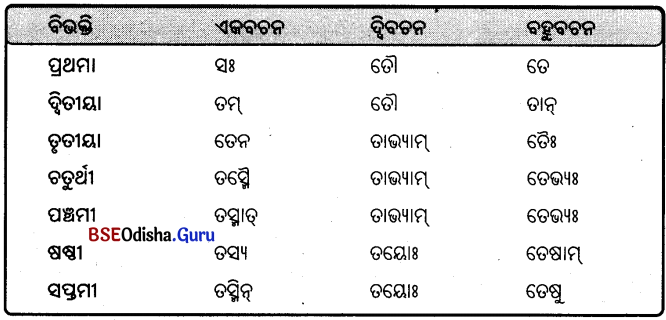
ତଦ୍ (ତାହା), ଯଦ୍ (ଯାହା), ଏତଦ୍ (ଏହା), ଇଦମ୍ (ଏହା), କିମ୍ (କ’ଣ), ଅଦସ୍ (ଏହା), ଯୁଷ୍ପଦ୍ (ତୁମେ) ଓ ଅସ୍ମଦ୍ (ମୁଁ) ଶବ୍ଦର ସମ୍ବୋଧନରେ ବ୍ୟବହାର ନାହିଁ ।
ତଦ୍ (ସ୍ତୀଲିସଂ)
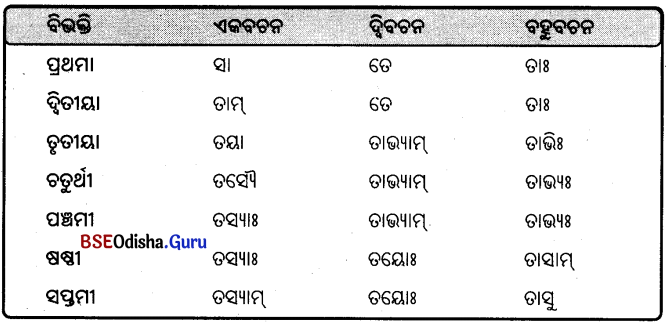
ତଦ୍ (କ୍ଳୀବଲିଙ୍ଗ) ।
| ବିଭନ୍ତି |
ଏକବଚନ |
ଦ୍ଧିବଚନ |
ବହୁବଚନ |
| ପ୍ରଥମା |
ତତ୍ଵ |
ତେ |
ତାନି |
| ଦ୍ବିତୀୟା |
ତତ୍ଵ |
ତେ |
ତାନି |
ତୃତୀୟାଠାରୁ ସପ୍ତମୀ ପର୍ଯ୍ୟନ୍ତ ରୂପ ପୁଲିଂଙ୍ଗ ତଦ୍ ଶବ୍ଦର ରୂପପରି ।
୩ । ଯଦ୍ (ପୁଂଲିଙ୍କ ) ଯେ / ଯାହା
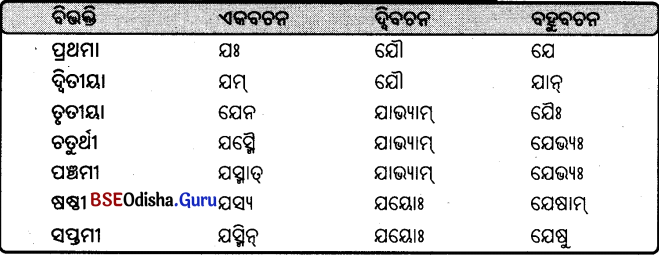
(ଯଦୁ ସ୍ତ୍ରୀଲିଙ୍ଗ)
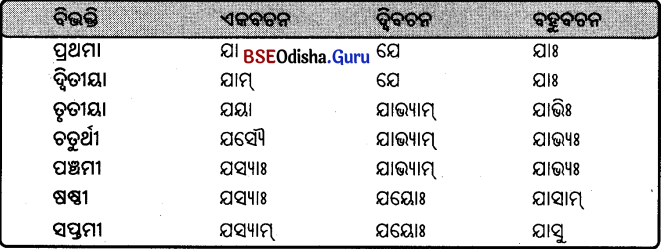
ଯଦ୍ (କ୍ଲୀବଲିଇଂ)
| ବିଭନ୍ତି |
ଏକବଚନ |
ଦ୍ଧିବଚନ |
ବହୁବଚନ |
| ପ୍ରଥମା |
ତତ୍ଵ |
ତେ |
ତାନି |
| ଦ୍ବିତୀୟା |
ତତ୍ଵ |
ତେ |
ତାନି |
ଯଦ୍ ଶବ୍ଦ କ୍ଲୀବଲିଙ୍ଗରେ ତୃତୀୟାଠାରୁ ସପ୍ତମୀ ବିଭକ୍ତି ପର୍ଯ୍ୟନ୍ତ ତିନି ବଚନରେ ପୁଂଲିଙ୍ଗ ଯଦ୍ ଶବ୍ଦର ରୂପପରି ।.
୪ । କିମ୍ (ପୁଂଲିଙଂ) କିଏ, କ’ଣ
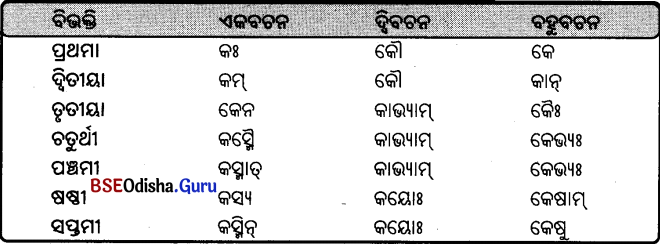
କିମ୍ (ସ୍ତ୍ରୀଲିଙ୍ଗ ) ।
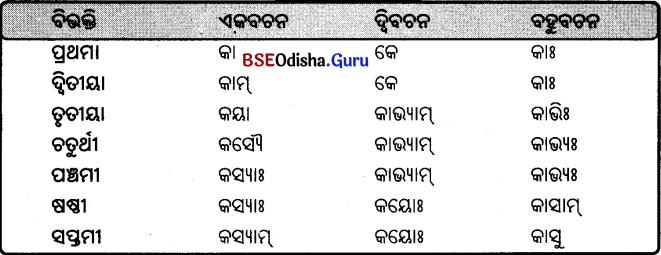
କମ୍ (କ୍ଲୀବଲିଙ୍ଗ)
| ବିଭନ୍ତି |
ଏକବଚନ |
ଦ୍ଧିବଚନ |
ବହୁବଚନ |
| ପ୍ରଥମା |
ତତ୍ଵ |
ତେ |
ତାନି |
| ଦ୍ବିତୀୟା |
ତତ୍ଵ |
ତେ |
ତାନି |
ଅବଶିଷ୍ଟ ରୂପ ପୁଂଲିଙ୍ଗ କିମ୍ ଶବ୍ଦର ରୂପପରି ।

୫ । ଇଦମ୍ (ପୁଂଲିଇଂ) ଏହା, ଏହ
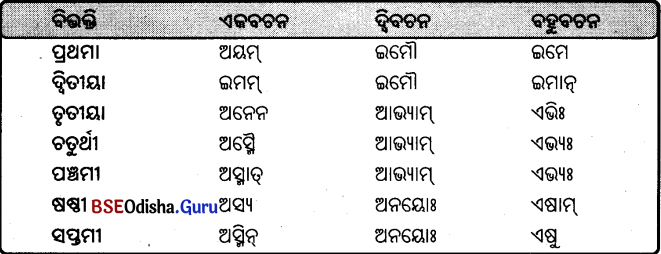
ଇଦମ୍ (ସ୍ତୀଲିଙ୍କ)
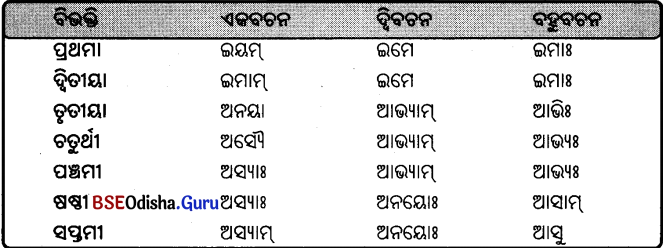
ଇଦମ୍ (କ୍ଳୀବଲିଙ୍ଗ)
| ବିଭନ୍ତି |
ଏକବଚନ |
ଦ୍ଧିବଚନ |
ବହୁବଚନ |
| ପ୍ରଥମା |
ଇଦମ୍ |
ଇମେ |
ଇମାନି |
| ଦ୍ବିତୀୟା |
ଇଦମ୍ |
ଇମେ |
ଇମାନି |
ଅବଶିଷ୍ଟ ରୂପ ପୁଂଲିଙ୍ଗ ଇଦମ୍ ଶବ୍ଦର ରୂପପରି ।
୬ । ଅସ୍ମଦ୍ (ମୁଁ, ଆମ୍ଭେ)
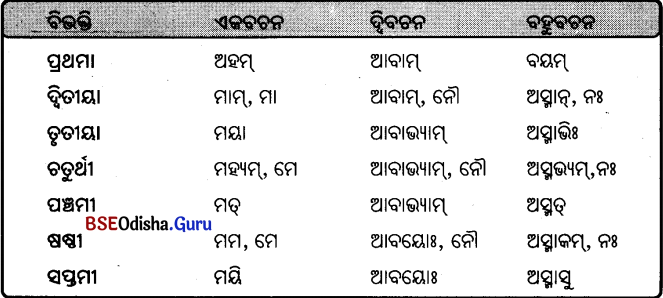
ଯୁଷ୍ମଦ୍ (ତୁ, ତୁମ୍ଭେ)
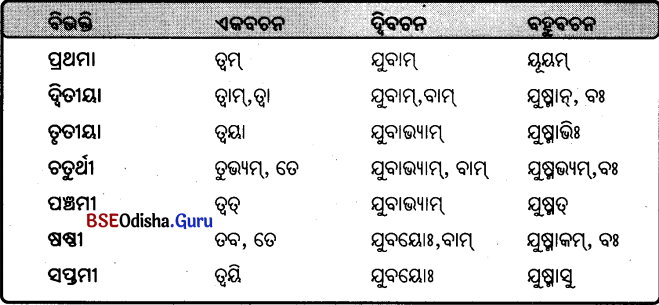
ଯୁଷ୍ମଦ୍ ଓ ଅସ୍ମଦ ଶବ୍ଦର ତିନିଲିଙ୍ଗରେ ସମାନ ରୂପ ହୁଏ ।
(କ) ତ୍ଵା, ତେ ପ୍ରଭୂତି ଏକାକ୍ଷର ବିକଳ୍ପ ରୂପଗୁଡ଼ିକ ବାକ୍ୟର ପ୍ରାରମ୍ଭରେ, (ଖ) ଶ୍ଳୋକପାଦର ପ୍ରାରମ୍ଭରେ, (ଗ) ଚ-ବା-ଏବ ସହିତ ପ୍ରୟୋଗ କାଳରେ, (ଘ) ଅପ୍ରତ୍ୟକ୍ଷ ଜ୍ଞାନକୁ ବୁଝାଉଥ୍ବା ଧାତୁ ଯୋଗରେ, (ଙ) ସଂବୋଧନ ପଦର ଅବ୍ୟବହିତ ପରେ ପ୍ରୟୋଗ ହୁଅନ୍ତି ନାହିଁ । ସେହି ସ୍ଥଳରେ ନିର୍ଦିଷ୍ଟ ବିଭକ୍ତି ବଚନରେ ପ୍ରଥମ ପ୍ରଦତ୍ତ ରୂପ ଗ୍ରହଣୀୟ ।
ଉଦାହରଣ :
(କ) ଅଶୁଦ୍ଧ – ତେ ଗୃହଂ କୁତ୍ ?
ଶୁଦ୍ଧ – ତବ ଗୃହଂ କୁତ୍ର ?
ଗୃହଂ ତେ କୁତ୍ର ?
ଅଶୁଦ୍ଧ – ମେ ପୁସ୍ତକଂ ଦେହି ।
ଶୁଦ୍ଧ – ମମ ପୁସ୍ତକଂ ଦେହି । ମହ୍ଯଂ ପୁସ୍ତକଂ ଦେହି ।
ପୁସ୍ତକଂ ମେ ଦେହି ।
(ଖ) ଅଶୁଦ୍ଧ – ତ୍ମା ସ ରକ୍ଷତି ଯତ୍ନେନ ।
ଶୁଦ୍ଧ – ତ୍ସାଂ ସ ରକ୍ଷତି ଯତ୍ନେନ ।
ସ ତ୍ସାଂ ରକ୍ଷତି ଯତ୍ନେନ ।
ମା ସ ଦ୍ରେଷ୍ଟି ନିରନ୍ତରମ୍ ।
ମାଂ ସ ଦ୍ଵେଷ୍ଟି ନିରନ୍ତରମ୍ ।
ସ ମା ଦ୍ରେଷ୍ଟି ନିରନ୍ତରମ୍ ।
(ଗ) ଅଶୁଦ୍ଧ – ଗୁରୁଃ କୃପୟା ତ୍ଵା ମା ଚ ଉପଦିଶତି ।
ଶୁଦ୍ଧ – ଗୁରୁଃ କୃପୟା ତ୍ସାଂ ମାଂ ଚ ଉପଦିଶତି ।
ତେନୈବଂ କ୍ରିୟମାଣେ ବୋ ନଶ୍ଚ କା ହାନିଃ?
ତେନୈବ କ୍ରିୟମାଣେ ଯୁଷ୍ମାକମସ୍ମାକଂ
ଚ କା ହାନିଃ ।
(ଘ) ଅଶୁଦ୍ଧ – ରାମଃ ମନସା ତ୍ରା ପଶ୍ୟତି ।
ଶୁଦ୍ଧ – ରାମଃ ମନସା ତ୍ସାଂ ପଶ୍ୟତି ।
(ଙ) ଅଶୁଦ୍ଧ – ଦେବ ! ମା ରକ୍ଷ ।
ଶୁଦ୍ଧ – ଦେବ ! ମାଂ ରକ୍ଷ ।
ଶ୍ଳୋକପ୍ରୟୋଗଃ । (ଅସ୍ମଦ୍, ଯୁଷ୍ଦ୍, ତଦ୍, ଯଦ୍ ପ୍ରଭୂତି ଶବ୍ଦ ବ୍ୟବହାର ସହିତ)
(କ) ଯାଂ ଚିନ୍ତୟାମି ସତତଂ ମୟି ସା ବିରକ୍ତା ।
ସାପ୍ୟନ୍ୟମିଚ୍ଛତି ଜନଂ ସ ଜନୋଏନ୍ୟସକ୍ତଃ ।
ଅସ୍ମତ୍ବକୃତେ ଚ ପରିତୁଷ୍ୟତି କାଚିଦନ୍ୟା
ଧ୍କ୍ ତାଂ ଚ ତଂ ଚ ମଦନଂ ଧ୍ଗିମାଂ ଚ ମାଂ ଚ ॥ (ନୀତିଶତକମ୍ )

ଯାହାକୁ ମୁଁ ସବୁବେଳେ ଚିନ୍ତାକରୁଛି ସେ ମୋ ଉପରେ ବିରକ୍ତ; ସେ ମଧ୍ଯ ଅନ୍ୟ ଲୋକକୁ ଚାହୁଁଛି ସେ ଲୋକ ଅନ୍ୟତ୍ର ଆସକ୍ତ । ଆମପରି ଯଦି କେହି ପରିସ୍ଥିତିରେ ପଡ଼ିଥାଏ, ତାକୁ ସେହି ନାରୀକୁ ଧ୍କ୍ ସେହି ପୁରୁଷକୁ ଧ୍କ୍, ଏହି ବୁଦ୍ଧ, କୁ ଧ୍କ୍, ମଦନକୁ ଧ୍କ୍, ମୋତେ ଧ୍କ୍ ।
(ଖ) ଯୂୟଂ ବୟଂ ବୟଂ ଯୂୟମିତ୍ୟାସୀନୁ ମତିରାବୟୋଃ ।
କିଂ ଜାତମଧୁନା ଯେନ ଯୂୟଂ ଯୂୟଂ ବୟଂ ବୟମ୍ ॥ (ବୈରାଗ୍ୟଶତକମ୍ )
ତୁମେମାନେ ଆମେମାନେ ଆମେମାନେ ତୁମେମାନେ ଏମିତି ଆମର ବିଚାର ଥ୍ଲା ।
ବର୍ଭମାନ କ’ଣ ହେଲା ଯେ ତୁମେ ତୁମେ ଆମେ ଆମେ ହୋଇଗଲେ ।
(ଗ) ସର୍ବସ୍ୟ ଚାହଂହୃଦି ସନିବିଷ୍ଠଃ
ମତ୍ତଃ ସ୍ମୃତିର୍ଞାନମପୋହନଂ ଚ । ଗୀତା-୧୫.୧୫
ସମସ୍ତଙ୍କ ହୃଦୟରେ ମୁଁ ରହିଛି । ମୋଠାରୁ ସ୍ମୃୁତିଜ୍ଞାନ ତଥା ବିସ୍ମନଂତି ହେଉଛି ।
ବାକ୍ୟପ୍ରୟୋଗଃ :
ପ୍ରଥମା ବିଭନ୍ମ ଏକବଚନ
ତଦୂ – ସଃ ମମ ଭ୍ରାତା, ତତୂ ମମ ପୁସ୍ତକମ୍, ସା ସମ ଭଗିନୀ ।
Answer:
ସେ ମୋ ଭାଇ, ତାହା ମୋର ବହି, ସେ ମୋ ଭଉଣୀ ।
ଯଦଵ – ଯଃ ବିଦ୍ୟାଳୟଂ ଗଚ୍ଛତି ସଃ ମେ ମିତ୍ରମ୍ ।
Answer:
ଯିଏ ସ୍କୁଲ ଯାଉଛି ସେ ମୋ ବନ୍ଧୁ ।
ତବ ହସ୍ତେ ଯତ୍ର ବିଦ୍ୟତେ ତତ୍ ଚିତ୍ରମ୍ ।
Answer:
ତୁମ ହାତରେ ଯାହା ଅଛି ତାହା ଚିତ୍ର ।
ଯା ଗୃହେ ତିଷ୍ଠତି ସା ମମ ମାତା ।
Answer:
ଯିଏ ଘରେ ଅଛି ସେ ମୋ ମାଆ ।
କିମ୍ – ତତ୍ର କଃ ଗଚ୍ଛତି ?
Answer:
ସେଠାରେ କିଏ ଯାଉଛି ।
ବାଳକସ୍ୟ ମୁଖେ କିମ୍ ଅସ୍ତି ?
Answer:
ପିଲାଟିର ମୁହଁରେ କ’ଣ ଅଛି ।
ସା ବାଳିକା କା ?
Answer:
ସେହି ଝିଅଟି କିଏ ?
ଇଦମ୍ – ଅୟଂ ବାଳକଃ ଚତୁରଃ ।
Answer:
ଏହି ପିଲାଟି ଚତୁର ।
ଇଦଂ ଚିତ୍ରଂ ମନୋହରମ୍ ।
Answer:
ଏହି ଚିତ୍ରଟି ସୁନ୍ଦର ।
ଇୟଂ ଦେବୀ ସଦ୍ଗୁଠଯୁକ୍ତା ।
Answer:
ଏହି ଦେବୀ ସଦୂଗୁଠଯୁକ୍ତ ।
ଅସ୍ମଦ୍ – ଅହଂ ଶିକ୍ଷକସ୍ୟ ଅଭିପ୍ରାୟଂ ଜାନାମି ।
Answer:
ମୁଁ ଶିକ୍ଷକଙ୍କ ଅଭିପ୍ରାୟ ଜାଣେ ।

ଯୁଷ୍ମଦ୍ – ତ୍ୁଂ ଦେବାଳୟଂ ଗଚ୍ଛ ।
Answer:
ତୁମେ ଦେବାଳୟକୁ ଯାଅ ।
ପ୍ରଥମା ବିଭକ୍ତ ଦ୍ଭିବଚନ ।
ତଦ୍ – ତୌ ବାଳକୌ ଗଚ୍ଛତଃ ।
Answer:
ସେହି ପିଲା ଦୁହେଁ ଯାଉଛନ୍ତି ।
ତେ ପୁସ୍ତକେ ଗୃହେ ତିଷ୍ଠତଃ । (ସେହି ଦୁଇଟି)
Answer:
ସେହି ବହି ଦୁଇଟି ଘରେ ଅଛି ।
ତେ ଲତେ ପୁଷ୍ପିତେ । (ସେହି ଦୁଇଟି)
Answer:
ସେହି ଲତା ଦୁଇଟିରେ ଫ୍ରୁଲ ହୋଇଛି ।
ଯଦ୍ଵ – ତୌ ମମ ଭ୍ରାତରୌ ଯୌ ବିଦ୍ୟାଳୟଂ ଗଚ୍ଛତଃ ।
Answer:
ଯେଉଁ ଦୁଇଜଣ ସ୍କୁଲ ଯାଉଛନ୍ତି । ସେ ଦୁହେଁ ମୋର ଭାଇ ।
ତେ ଏବ ବାଳାୟ ରୋଚେତେ ଯେ ଚିତ୍ରେ ସୁନ୍ଦରେ ସ୍ତଃ ।
(ସେହି ଦୁଇଟି ପିଲାକୁ ଭଲ ଲାଗୁଛି ଯେଉଁ ଦୁଇଟି ଚିତ୍ର ସୁନ୍ଦର ଅଛି ।)
ଯେ ବାଳିକେ ସଭାୟାଂ ନ ତିଷ୍ଠତଃ ତେ ନିନ୍ଦନୀୟେ ।
Answer:
ଯେଉଁ ଝିଅଦୁଇଟି ସଭାରେ ରହୁନାହାନ୍ତି ସେ ଦୁହେଁ ନିନ୍ଦନୀୟ ।
କିମ୍ – ରାମେଣ ସହ କୌ ବନଂ ଗତୌ ?
Answer:
ରାମଙ୍କ ସହିତ କେଉଁ ଦୁଇଜଣ ବଣକୁ ଗଲେ ।
କେ ତତ୍ର ତିଷ୍ଠନ୍ତି ?
Answer:
କେଉଁମାନେ ସେଠାରେ ଅଛନ୍ତି ।
କେ ବାଳିକେ ତତ୍ର ଗତେ? (କେଉଁ ଦୁଇଟି ଝିଅ ସେଠାକୁ ଯାଇଥ୍ଲେ?)
ଇଦମ୍ – ଇମୌ ବାଳକୌ ନେତାରୌ ଭବିଷ୍ଯତଃ ।
Answer:
ଏହି ପଲାଦୁହେଁ ନେତା ହେବେ ।
ଇମେ ଫଳେ ମଧୁରେ ସ୍ତଃ ।
Answer:
ଏହି ଫଳଦୁଇଟି ମଧୁର ।
ଇମେ ମାଳେ ରାମାୟାଃ । (ଏହି ଦୁଇଟି ମାଳା ରାମାର ।)
ଅସ୍ମଦ୍ – ଆବାମ୍ ଅତ୍ର ଆଗମିଷ୍ୟାବଃ ।
Answer:
ଆମେ ଦୁହେଁ ଏଠାକୁ ଆସିବୁ ।
ଯୁଷ୍ମଦ୍ – ଯୁବାଂ କିଂ ପଠଥଃ ?
Answer:
ତୁମେ ଦୁହେଁ କ’ଣ ପଢୁଛ ?.
ପ୍ରଥମା ବିଭନ୍ମ ବହବଚନ ।
ତଦ୍ – ତେ ମୋହନସ୍ୟ ପୁତ୍ରାଃ ସନ୍ତି ।
Answer:
ସେମାନେ ମୋହନର ପୁଅ ଅଟନ୍ତି ।
ତାନି ମାଧବସ୍ୟ ପୁସ୍ତକାନି ସନ୍ତି ।
Answer:
ସେଗୁଡ଼ିକ ମାଧବର ବହି ।
ତାଃ ସ୍ପିୟଃ ନଦୀଂ ଗଚ୍ଛନ୍ତି ।
Answer:
ସେହି ସ୍ତ୍ରୀଲୋକମାନେ ନଭକୁ ଯାଉଛନ୍ତି ।
ଯଦ୍ – ଯେ ପରିଶ୍ରମଂ କୁର୍ବନ୍ଥି ତେ ସଫଳାଃ ଭବନ୍ତି ।
Answer:
ଯେଉଁମାନେ ପରିଶ୍ରମ କରନ୍ତି ସେମାନେ ସଫଳ ହୁଅନ୍ତି ।
ଯାନି ପୁସ୍ତକାନି ପାଠାଗାରେ ସନ୍ତି ତାନି ନୂତନାନି ।
Answer:
ଯେଉଁ ବହିଗୁଡ଼ିକ ପାଠାଗାରରେ ଅଛି ସେଗୁଡ଼ିକ ନୂଆ ।
ଯାଃ ନଦ୍ୟଃ ସୁନାବ୍ୟାଃ ତାଃ ପୂଜ୍ୟାଃ ।
Answer:
ଯେଉଁ ନଭଗଟୁଡ଼ିକ ସୁନାବ୍ୟା ସେଗୁଡ଼ିକ ପୂଜ୍ୟ ।
କିମ୍,ଇଦମ୍ – ଇମେ ସର୍ବେ କେ ସନ୍ତି ?
Answer:
ଏମାନେ ସମସ୍ କିଏ ?

ନି ସର୍ବାଣି କାନି ?
Answer:
ଏଗୁଡ଼ିକ ସବୁ କ’ଣ ?
ଇମାଃ ସର୍ବାଃ କାଃ ?
Answer:
ଏମାନେ ସମସ୍ତେ କିଏ ?
ଅସ୍ମଦ୍ – ବ୍ୟଂ ତ୍ଵାଂ ସାଦରଂ ନମାମଃ ।
Answer:
ଆମେ ତୁମକୁ ଆଦର ସହ ପ୍ରଣାମ କରୁ ।
ଯୁକ୍ଷ୍ମଦ୍ – ଯୂୟଂ ଭାରତବର୍ଷସ୍ୟ ସେବାଂ କୁରୁତ ।
Answer:
ତୁମେମାନେ ଭାରତବର୍ଷର ସେବାକର ।
ଦ୍ରିତୀୟା ବିଭନ୍ତି:
ତଦ୍ – ସଃ ତଂ ବାଳକଂ କଥଂ ନ ଜାନାତି ?
Answer:
ସେ ସେହି ପିଲାକୁ କାହିଁକି ଜାଣୁ ନାହାଁନ୍ତି ।
ତ୍ବଂ ତତ୍ର ପତ୍ରମ୍ ଆନୟ ।
Answer:
ତୁମେ ସେହି ପତ୍ରଟି ଆଣ ।
ତାଂ ଲତାଂ ଛାଗଃ ଖାଦତି ।
Answer:
ସେହି ଲଟା ଛେଳି ଖାଏ ।
ତଦ୍ – ଯଂ ପୃଛସି ତଂ ଜାନାସି କିମ୍ ?
Answer:
ଯାହାକୁ ପଚାରୁଛ ତାକୁ ଜାଣ କି ?
ଯତ କିଂଚିତ୍ବ ଧନଂ ଦେହି ।
Answer:
ଯାହା କିଛି ଧନ ଦିଅ ।
ଯାଂ ବାଳିକାଂ ପଶ୍ୟସି ସା ରାମସ୍ୟ ଭଗିନୀ ।
Answer:
ଯେଉଁ ଝିଅକୁ ଦେଖୁଛ ସେ ରାମର ଭଉଣୀ;
ତଦ୍ – କଂ ବାଳକମ୍ ଆହୁୟସି ?
Answer:
କେଉଁ ପିଲାକୁ ଡାକୁଛ ?
କଂ ଫଳମ୍ ଇଚ୍ଛସି ?
Answer:
କେଉଁ ଫଳ ଚାହୁଁଛ ?
କାଂ ଦେବୀଂ ପୂଜୟସି ?
Answer:
କେଉଁ ଦେବୀଙ୍କୁ ପୂଜାକରୁଛ ?
ଇଦମ୍ – ଇମ୍ଂ ବାଳକଂ ନ ବଦ ।
Answer:
ଏହି ପିଲାକୁ କୁହ ନାହିଁ ।
“ରଦଂ ଫଳମ୍ ଆନୟ ।
Answer:
ଏହି ଫଳଟି ଆଣ ।
ରମାଂ ନାରୀଂଂ ପୃଚ୍ଛ ।
Answer:
ଏହି ସ୍ତ୍ରୀକୁ ପଚାର ।

ଅସ୍ମଦ୍ – ସଃ ମାଂ ନୟତି ।
Answer:
ସେ ମୋତେ ନେଉଛି ।
ଯୁଷ୍ମଦ୍ – ଅହଂ ତ୍ଵାଂ ପୃଚ୍ଛାମି ।
Answer:
ମୁଁ ତୁମକୁ ପଚାରୁଛି ।
ତୃତାୟା ବିଭକୁି:
ତଦ୍ – ସଃ ତେନ ସହ ବସତି ।
Answer:
ସେ ତା’ ସହିତ ବାସକରୁଛି ।
ତେନ ପାତ୍ରେଣ ସହ ଇଦଂ ପାତ୍ରମପି ଧାରୟ ।
Answer:
ସେହି ପାତ୍ର ସହିତ ଏହି ପାତ୍ର ମଧ୍ଯ ଧର ।
ଅହଂ ତୟା ସହ ଉପବନଂ ଗମିଷ୍ୟାମି ।
Answer:
ମୁଁ ତା? ସହିତ ବଗିଚାକୁ ଯିବି ।
ଯଦୂୃ – ଯେନ ପୁତ୍ରେଣ ସୁଖଂ ନାସ୍ତି ତେନ କୋ ଲାଭଃ ।
Answer:
ଯେଉଁ ପୁଅରେ ସୁଖ ନାହିଁ ସେଥ୍ରେ ଲାଭ କ’ଣ ।
ଯେନ୍ ଜ୍ଞାନେନ ମୁକ୍ତିର୍ନାସ୍ତି ତତ଼ କିଂ ଜ୍ଞାନମ୍ ।
Answer:
ଯେଉଁ ଜ୍ଞାନରେ ମୁକ୍ତି ନାହିଁ ସେ ଜ୍ଞାନ କ’ଣ ।
ପଦ ବିନ୍ଯାସମାତ୍ରେଣ ଯୟା ନାପହୃତଂ ମନଃ ।
Answer:
ପଦବିନ୍ୟାସମାତ୍ରେ ଯାହାଦ୍ଵାରା ମନ ହରଣ ହଲା ନାହିଁ ।
ତୟା କବିତୟା କିଂ ବା ତୟା ବନିତୟାଥଥବା
Answer:
ସେହି କବିତାରେ କିମ୍ବା ସେହି ନାରୀଦ୍ମାରା ବା ଲାଭ କ’ଣ ? କୁ
କିମ୍ – କେନ ଇଦଂ ପତ୍ରଂ ଲିଖ୍ତମ୍ ।
Answer:
କିଏ ଏହି ପତ୍ର ଲେଖୁଛି ।
କେନ କାରଣେନ ତ୍ସଂ ଗୃହେ ନ ତିଷ୍ଠସି ?
Answer:
କେଉଁଥ୍ପାଇଁ ତୁମେ ଘରେ ରହୁନାହଁ ?
କୟା ଭାଷୟା ତ୍ସଂ ପ୍ରଶ୍ନୋଭରଂ କରୋଷି ?
Answer:
କେଉଁ ଭାଷାରେ ତୁମେ ପ୍ରଶ୍ନୋତ୍ତର କରୁଛ ?
ଇଦମ୍ – ଅନେନ ବାଳକେନ ସହ ମିତ୍ରତାଂ କୁରୁ ।
Answer:
ଏହି ପିଲା ସାଙ୍ଗରେ ବନ୍ଧୁତା କର ।
ଅନେକ ମିତ୍ରେଣ ସହ ବାର୍ଭାଳାପଂ କୁରୁ ।
Answer:
ଏହି ସାଙ୍ଗ ସହିତ କଥାବାର୍ଭା କର ।
ଅନୟା ରଚନୟା କିଂ ପ୍ରୟୋଜନମ୍ ?
Answer:
ଏହି ରଚନାରେ ଲାଭ କ”ଣ ?
ଅସ୍ମଦ୍ – ମୟା କଥ୍ତମ୍ ।
Answer:
ମୁଁ କହିଛି ।
ଯୁଷ୍ମଦ୍ – ତ୍ୁୟା ହସିତମ୍ ।
Answer:
ତୁମେ ହସିଛ
ଚତୁର୍ଥୀ ବିଭକ୍ତ:
ତଦୂ – ତସ୍ପୈ ଶ୍ରୀଗୁରବେ ନମଃ
Answer:
ସେହି ଗୁରୁଙ୍କୁ ପ୍ରଣାମ ।
ତସ୍ମୈ କୁଣ୍ଡଳାୟ ସୁବର୍ଣ୍ଣମ୍ ଆନୟ ।
Answer:
ସେହି କୁଣ୍ଡଳପାଇଁ ସୁନା ଆଣ ।
ତସ ଦେର୍ବ୍ୟେ ନିବେଦୟାମି ।
Answer:
ସେହି ଦେବୀଙ୍କୁ ଜଣାଉଛି ।
ଯଦ୍ନ, କିମ୍ ଯସ୍ମୈ କସ୍ମୈଚିଦ୍ ଦାତୁମିଛାମି ।
Answer:
ଯାହାକୁ ହେଲେ ଦେବାକୁ ଚାହୁଁଛି ।

ଯସ୍ୟୌ କସର୍ସ୍ୟେଚିଦ୍ ଲେଖ୍ତୁମିଚ୍ଛାମି ।
Answer:
ଯାହାକୁ ହେଲେ ଲେଖ୍ବାକୁ ଚାହୁଁଛି ।
କିମ୍ – କସ୍ପୈ ଦେବାୟ ହବିଷା ବିଧେମ ।
Answer:
କେଉଁ ଦେବତାଙ୍କୁ ଘୃତାହୁତି ଦେବା ।
କସ୍ୌଃ ମୋଦକଂ ରୋଚତେ ?
Answer:
କାହାକୁ ମିଠେଇ ଭଲଲାଗେ ।
ଇଦମ୍ – ଅସ୍ପୈ କିଂ ରୋଚତେ ?
Answer:
ଏହାଙ୍କୁ କ’ଣ ଭଲଲାଗେ
ଅସୌ୍ ଅହଂ ଧନାନି ଦାସ୍ୟାମି ।
Answer:
ଏହାଙ୍କୁ ମୁଁ ଧନ ଦେବି ।
ଅସ୍ମଦ୍ – ମହ୍ୟଂ ପୁସ୍ତକଂ ଦେହି ।
Answer:
ମୋତେ ବହି ଦିଅ ।
ଯୁଷ୍ମଦ୍ – ତୁଭ୍ୟଂ ମୋଦକମ୍ ଆନୟାମି ।
Answer:
ତୁମପାଇଁ ମିଠେଇ ଆଣୁଛି ।
ପଞ୍ଚମୀ ବିଭଲ୍ତି:
ତଦ୍ – ତସ୍କାତଵ ତ୍ଵଂ ମହ୍ୟଂ କୁପ୍ୟସି ।
Answer:
ତେଣୁ ତୁମେ ମୋତେ ରାଗୁଛ ।
ତସ୍ୟାଃ ବିନା ମମ ଜୀବନଂ ଦୁଃଖଦମ୍ ।
Answer:
ତା” ବିନା ମୋ ଜୀବନ ଦୁଃଖପୂର୍ଣ୍ତ ।
ଯଦ୍ଵ – ଯସ୍କାତୃ ହେତୋଃ ସଃ ନାଗଚ୍ଛତି ତଦହଂ ଜାନାମି ।
Answer:
ଯେଉଁଥ୍ପାଇଁ ସେ ଆସୁନାହିଁ ତାହା ମୁଁ ଜାଣେ ।
ଯସ୍ୟାଃ ରତେ ତ୍ବଂ ଚିନ୍ତାକୁଳଃ ଆସୀତ୍ଵ ସା ଭୁବନେଶ୍ଵରେ ବର୍ଭତେ ।
Answer:
ଯାହାବିନା ତୁମେ ଚିନ୍ତିତ ଥ୍ଲ ସେ ଭୁବନେଶ୍ଵରରେ ଅଛି ।
କିମ୍ – ତ୍ବଂ କସ୍ମାତ୍ବ କାରଣାତ୍ଵ ଦୂରଦର୍ଶନଯନ୍ତ୍ରଂ ନ କ୍ରୀଣାସି ?
Answer:
ତୁମେ କାହିଁକି ଟିଭି କିଣୁନାହଁ ?
କସ୍ୟାଃ ନଦ୍ୟାଃ ତ୍ବଂ ଜଳମ୍ ଆନୟସି ।
Answer:
କେଉଁ ନଦୀରୁ ତୁମେ ପାଣି ଆଣୁଛ ?
ଇଦମ୍ – ଅସ୍ମାତୃ ବିଦ୍ୟାଳୟାତ୍ବ ବହିଃ ବାଳକାଃ କ୍ରୀଡ଼ନ୍ତି ।
Answer:
ଏହି ସ୍ୁଲ ବାହାରେ ପିଲାମାନେ ଖେଳୁଛନ୍ତି ।
ଅସ୍ୟାଃ ତ୍ଂ ପୁସ୍ତକଂ ନୟ ।
Answer:
ଏହାଠାରୁ ତୁମେ ବହି ନିଅ ।
ଅସ୍ମଦ୍ – ମତ ଦୂରଂ ତିଷ୍ଠ ।
Answer:
ମୋଠାରୁ ଦୂରରେ ରୁହ ।
ଯୁଷ୍ମଦ୍ – ତ୍ଵୁତ୍୍ ତୁ ମମ ସେବକଃ ବୁଦ୍ଧିମତ୍ତରଃ ।
Answer:
ତୁମଠାରୁ ମୋ ଚାକର ଅଧ୍କ ଚାଲାକ ।
ଷଷ୍ଠୀ ବିଭକ୍ତି ।:
ତଦ୍ – ସଃ ତସ୍ୟ ପୁତ୍ରଃ ଅସ୍ତି ।
Answer:
ସେ ତାଙ୍କ ପୁଅ ଅଟେ ।
ତସ୍ୟ ମିତ୍ରସ୍ୟ ଦନ୍ତଂ ସୁନ୍ଦରମ୍ ।
Answer:
ସେହି ସାଙ୍ଗର ଦାନ୍ତ ସୁନ୍ଦର ।
ତସ୍ୟାଃ ଜନନ୍ୟାଃ ପୁତ୍ରଃ ଦେଶଭକ୍ତଃ ।
Answer:
ସେହି ମାଆର ପୁଅ ଦେଶଭକ୍ତ ।
ଯଦୂ – ଯସ୍ୟ ପରିଶ୍ରମଃ ତସ୍ୟ ସୁଖମ୍ ।
Answer:
ଯାହାର ପରିଶ୍ରମ ଅଛି ତା’ର ସୁଖ ଅଛି ।
ଯସ୍ୟାଃ ସମୀପେ ବିଦ୍ୟା ଅସ୍ତି ସା ଧନ୍ୟା ।
Answer:
ଯାହା ପାଖରେ ବିଦ୍ୟା ଅଛି ସେ ଧନ୍ୟ ।

କିମ୍ – କସ୍ୟ ଗୃହେ ଚୌରଃ ପ୍ରବିଷ୍ଠଃ ?
Answer:
କାହା ଘରେ ଚୋର ପଶିଛି ।
କସ୍ୟାଃ ନଦ୍ୟାଃ ଜଳଂ ପବିତ୍ରମ୍ ?
Answer:
କେଉଁ ନଭର ପାଣି ପବିତ୍ର ।
ଇଦମ୍ – ଅସ୍ୟ ଜ୍ଞାନଂ ମୋକ୍ଷପ୍ରଦମ୍ ଅସ୍ତି ।
Answer:
ଏହାଙ୍କ ଜ୍ଞାନ ମୋକ୍ଷପ୍ରଦ ।
ଅସ୍ୟାଃ ହୃଦୟଂ ନିର୍ମଳଂ ବର୍ତତେ ।
Answer:
ଏହାଙ୍କ ହୁଦୟ ନିର୍ମଳ ଅଛି 1
ଅସ୍ମଦ୍ – ମମ ମାତା ଗୃହିଣୀ ଅସ୍ତି ।
Answer:
ମୋ ମାଆ ଗୃହିଣୀ ଅଚନ୍ତି ।
ଯୁଷ୍ମଦ୍ – ତବ ପିତା ମାଂ ଜାନାତି ।
Answer:
ତୁମ ବାପା ମୋତେ ଜାଣନ୍ତି ।
ସପୃମା:
ତଦ୍ – ତସ୍ମିନ୍ନ ତସ୍ୟାଂ ବା ନ କୋଥପି ବିଶ୍ଵସିତି ।
Answer:
ତାକୁ କେହି ବିଶ୍ବାସ କରେ ନାହିଁ ।
ଯଦୂ – ଯସ୍ମିନ୍ ଯସ୍ୟାଂ ବା ତସ୍ୟ ଅଚଳା ଭକ୍ତିଃ ସଃ ସା ବା ଅତ୍ର ବିଦ୍ୟତେ ।
Answer:
ଯାହାଠାରେ ତାଙ୍କର ଅଚଳ ଭକ୍ତି ସେ ଏଠାରେ ଅଛନ୍ତି ।
କିମ୍ – କସ୍ମିନ୍ କସ୍ୟାଂ ବା ତବ ମନଃ ରମତେ ।
Answer:
କାହାଠାରେ ତୁମ ମନ ଖୁସି ।
ଇଦମ୍ – ଅସ୍ମିନ୍ ଅସ୍ୟାଂ ବା ମମ ମନଃ ରମତେ ।
Answer:
ଏହାଠାରେ ମୋ ମନ ସୁସି ।
ଅସ୍ମଦୂ, ଯୁଷ୍ମାଦ୍ – ଶିକ୍ଷକଃ ମୟି ତ୍ଵୟି ବା ଅନୁରାଗଂ ସୂଚୟତି ।
Answer:
ଶିକ୍ଷକ ମୋତେ ବା ତୁମକୁ ଭଲପାଉଛନ୍ତି ।
ଅଭ୍ୟ।ସଃ:
ତଦ୍ ଶବ୍ଦରୂପୈଃ ଶୂନ୍ୟସ୍ଥାନାନି ପୂରୟତ ।
(କ) ଯଃ ଜନକପୁରୀମ୍ ଆଗତଃ __________ ଏବ ରାମଃ ।
Answer:
ସ
(ଖ) ଯଂ ଯଂ ପଶ୍ୟସି ___________ ଦୀନଂ ବଚଃ ମା କଥୟ ।
Answer:
ତଂ ତଂ
(ଗ) ମହାଜନୋ ଯେନ ଗତଃ ___________ ପନ୍ଥା ।
Answer:
ସଃ
(ଘ) ଯସ୍ପୈ ତ୍ଵଂ ଗଚ୍ଛସି ___________ ଏବ ଶତରୁଃ ଭବିଷ୍ୟତି ।
Answer:
ସଃ
(ଙ) ଯସ୍ମାତ୍ବ ପଠସି ___________ ସମ୍ମାନଂ କୁରୁ ।
Answer:
ତସ୍ୟ
(ଚ) ଯସ୍ମିନ୍ନ ଫଳକେ ତ୍ବଂ ଲିଖସି ___________ଶ୍ୟାମପଟ୍ଟଃ ଅସ୍ତି ।
Answer:
ସଃ
୨। ଏକବବନାନ୍ତାନାଂ ପୁରତଃ ବହୁବଚନାନ୍ତପଦାନି ଲିଖତ ।
ଉଦାହରଣମ୍ – ଯଃ/ ସଃ ଯେ / ତେ ।
(କ) ଯା/ସା/ ____________
Answer:
ଯାଃ / ତାଃ
(ଖ) ଯତ୍/ ତତ୍ ____________
Answer:
ଯାନି / ତାନି
(ଗ) ଯମ୍ / ତମ୍ ____________
Answer:
ଯାନ୍ / ତାନ୍
(ଘ) ଯେନ / ତେନ ____________
Answer:
ଯୈଃ / ତୈଃ

(ଙ ) ଯସ୍ମୈ / ତସ୍ମୈ ____________
Answer:
ଯେଭ୍ୟଃ/ ତେଭ୍ୟଃ
(ଚ) ଯସ୍ମାତଵ/ ତସ୍ମାତ୍ ____________
Answer:
ଯେଭ୍ୟଃ/ ତେଭ୍ୟଃ
(ଛ) ଯସ୍ଯ/ତସ୍ୟ ____________
Answer:
ଯେଷାଂ/ ତେଷାଂ
(ଜ) ଯସୁନ/ତସୁିନ____________
Answer:
ଯେଷୁ/ ତେଷୁ
୩ । ଉଦାହରଣାନୁସାରଂ ପ୍ରଶ୍ନବାଚକସର୍ବନାମପଦାନାଂ ପୁରତଃ ତତ୍ଵ ଶବ୍ଦରୂପାଣି ଲିଖତ ।
ଉଦାହରଣମ୍ – କଃ/ କା/ କିମ୍ ସଃ / ସା / ତତ ।
(କ) କମ୍ / କାମ୍ / କିମ୍ _____________
Answer:
ତଂ / ତାମ୍ / ତତ୍
(ଖ) କେନ / କୟା / କେନ _____________
Answer:
ତେନ / ତୟା / ତେନ
(ଗ) କସ୍ପୈ / କସ୍ୟୌେ/ କସ୍ମୈ _____________
Answer:
ତସ୍ମୈ / ତସୌୟୌ / ତସ୍ମୈ
(ଘ) କସ୍ମାତ୍ / କସ୍ୟାଃ / କସାତ୍ _____________
Answer:
ତସ୍ମାତ୍ / ତସ୍ୟାଃ / ତସ୍ମାତୃ
(ଙ) କସ୍ଯ / କସ୍ଯାଃ / କସ୍ଯ _____________
Answer:
ତସ୍ୟ / ତସ୍ୟାଃ / ତସ୍ୟ
(ଚ ) କସ୍ମିନ୍ / କସ୍ଯାମ୍ / କିନା _____________
Answer:
ତସ୍ନିନ୍ / ତସ୍ୟାମ୍ / ତସ୍ନିନ୍
୪ । କୋଷ୍ଠକମଧ୍ଯାତ୍ବ ସମୁଚିତପଦଂ ନିରୂପ୍ଯ ଶୂନ୍ଯସ୍ଥାନଂ ପୂରୟତ । ଉତ୍ତର
(କ) __________ ସଦାଚାରୀ, ଏବ ସୁଖୀ । (ସଃ / ଯଃ)
Answer:
ଯଃ, ସଃ
(ଖ) __________ ଅର୍ଥକରୀ, __________ ଏବ ପଠନୀୟା । (ଯା/ ସା)
Answer:
ଯା, ସା
(ଗ) __________ ସ୍ଵାସ୍ଥ୍ୟପ୍ରଦମ୍, ଏବ ଗ୍ରାହ୍ୟମ୍ । (ଯତ୍ / ତତ୍)
Answer:
ଯତ / ତତ୍
(ଘ) __________ ପର୍ଞା ନାସି, ଶାସ୍ଂ __________ କରୋତି କିମ୍ ? (ଯସ୍ଯ/ ତସ୍ଯ)
Answer:
ଯସ୍ୟ / ତସ୍ୟ
(ଙ) ଶ୍ରେଷଠଃ __________ ଆଚରତି, ଇତରଃ ଜନଃ __________ ଏବ କରୋତି । (ତତ୍ ତତ୍/ ଯତ୍ ଯତ୍)
Answer:
ଯତ୍ ଯତ, ତତ ତତ୍
(ଚ) __________ ଦେଶେ ନାର୍ଯ୍ୟ ପୂଜ୍ୟନ୍ତେ, __________ ଦେବା ରମନ୍ତେ । (ଯସିନ୍ ତସିନ)
Answer:
ଯସ୍ମିନ୍ନ, ତସ୍ମିନୃ
(ଛ) __________ ବିଦ୍ୟା ନାସି, __________ ଭୁବି ଭାରଭୂତାଃ ସନ୍ତି । (ଯେଷାମ୍ / ତେ)
Answer:
ଯେଷାମ୍, ତେ
(ଜ) __________ କୀଦୃଶଃ ପିତା, __________ ବାଳଃ ନ ପାଠିତଃ ? (ଯେନ / ସଃ)
Answer:
ସଃ, ଯେନ
(ଝ) __________ ନରାଃ ଧନ୍ୟାଃ, __________ ଶରୀରାଣି ଦେଶହିତାୟ ସମର୍ପିତାନି । (ଯେଷାମ୍ / ତେ)
Answer:
ତେ, ଯେଷାମ୍
(ଞ) __________ ଜଳମ୍ ଏବ ବହୁମୂଲ୍ଯମ୍, __________ ମରୁଭୂମ୍ଯାଂ ଲଭ୍ଯତେ । (ଯତ/ ତତ୍)
Answer:
ତତୃ/ ଯତ
୫। କୋଷ୍ଠକାତ୍ଵ କିଂ ଶବ୍ଦସ୍ଯ ଯଥାର୍ଥରୂପଂ ଶୂନ୍ଯସ୍ଥାନେ ଲିଖତ ।
(କ) __________ ନଦୀ ନଦୀତମା ମନ୍ୟତେ ? (କଃ, କା, କାମ୍)
Answer:
କା

(ଖ) __________ ଶ୍ରାନ୍ତଃ ନିଦ୍ରାମ୍ ଇଚ୍ଚତି ? (କଃ, କା, କିମ୍)
Answer:
କଃ
(ଗ) __________ ଭାବନୟଯା ତ ମାଂ ପଶ୍ଯସି ? (କୟା, କେନ, କସ୍ଯ)
Answer:
କୟା
(ଘ) ଦଶରଥଃ __________ ଅଧୁକଃ ପ୍ରିୟଃ ଆସୀତ ? (କସ୍ଯ, କସ୍ୟାଛ, କୟା)
Answer:
କସ୍ୟ
(ଙ) __________ ନଗର୍ଯ୍ୟାଂ ତବ ନିବାସଃ ? (କସ୍ମିନ୍, କସ୍ଯାମ୍, କସ୍ମୈ)
Answer:
କସ୍ୟାମ୍
(ଚ) ସା __________ ପ୍ରଥମା ଭବତି ? (କେଷୁ , କାସୁ, କେନ)
Answer:
କାସୁ
୬। କୋଷ୍ଠକାତୃ ସମୁଚିତପଦଚୟନଂ କୃତ୍ଵା ଶୂନ୍ୟସ୍ଥାନଂ ପୂରୟତ । (ଇଦମ୍ ଶବ୍ଦସ୍ଯ) ଆ)
(କ) __________ ଦେବଦଭଃ । (ଇୟମ୍ /ଅୟମ୍)
Answer:
ଅୟଂ
(ଖ) __________ ଭାତା ସୋମଦଭରଃ । (ଅସ୍ଯ / ଅସ୍ମିନ୍)
Answer:
ଅସ୍ୟ
(ଗ) __________ ନଗରେ ଚୌରଃ ନାସ । (ଅସିନ/ ଅସ୍ଯ)
Answer:
ଅସ୍ମିନବ
(ଘ) __________ ବାଳିକାୟାଃ ନାମ ବିଜୟା । (ଅସ୍ଯ/ ଅସ୍ୟାଃ)
Answer:
ଅସ୍ୟାଃ
(ଙ) __________ କମଳାନି ତଡ଼ାଗେଷୁ ବିକସନ୍ତି । (ଇମେ/ ଇମାନି)
Answer:
ଇମାନି
(ଚ) __________ ସ୍ିୟଃ ପତିବ୍ରତାଃ । (ଇମେ / ଇମାଃ)
Answer:
ଇମାଃ
୭ । ଯୁଷ୍ମଣଦ୍ବ ଶବ୍ଦରୂପୈଃ ଶୂନ୍ଯସ୍ଥାନାନି ପୂରୟତ ।
(କ) ମମ ହସ୍ତେ ଲେଖନୀ ଅସ୍ତି, __________ ହସ୍ତେ କିମ୍ ଅସ୍ତି ?
Answer:
ତବ
(ଖ) ମୟା ପ୍ରଶଂସା ପ୍ରାପ୍ତା, __________ କିଂ ପ୍ରାପୂମ୍ ?
Answer:
ତ୍ଵୟା
(ଗ) ମହ୍ଯଂ ଦଧ୍ ରୋଚତେ, __________ କିଂ ରୋଚତେ ?
Answer:
ତୁଭ୍ୟଂ
(ଘ) ମୟି ଛାତ୍ରାଃ ଅନୁରକ୍ତା, __________କେ ଅନୁରକ୍ତାଃ ?
Answer:
ତୃୟି
(ଙ) ତ୍ଵଂ ମାଂ ସ୍ମରସି, ଅହମପି __________ ସ୍ମରାମି ଇତି ସତ୍ୟମ୍ ।
Answer:
ତ୍ବାଂ
ସଂଖ୍ୟାବାଚକ ଶବ୍ଦ :
ଏକ (ନିତ୍ୟ ଏକବଚନାନ୍ତ) ପୁଂଲିଙ୍ଗରେ ସର୍ବଶବ୍ଦ, ସ୍ତ୍ରୀଲିଙ୍ଗରେ ସର୍ବାଶବ୍ଦ ଓ କ୍ଳୀବଲିଙ୍ଗରେ ସର୍ବଶବ୍ଦର ଏକବଚନର ରୂପପରି ଏହାର ରୂପ । ସଂଖ୍ୟାଭିନ୍ନ ଅର୍ଥରେ ଏକ ଶବ୍ଦ ଦ୍ବିବଚନାନ୍ତ ଓ ବହୁବଚନାନ୍ତ ମଧ୍ଯ ହୁଏ; ଯଥା – ଏକୌ=ଅନ୍ୟୌ, ଏକେଷାମ୍ = ପ୍ରଧାନାନାମ୍ ଇତ୍ୟାଦି ।
ଏକୋ୍ୟ୍ୟାର୍ଥେ ପ୍ରଧାନେ ଚ ପ୍ରଥମେ କେବଳେ ତଥା ।
ସାଧାରଣସମାନେଃଳ୍ପେ ସଂଖ୍ୟାୟାଂ ଚ ପ୍ରଯୁଜ୍ୟତେ ।
ଦ୍ଧ (ନିତ୍ୟ ଦ୍ବିବଚନାନ୍ତ) , ତ୍ରିଠାରୁ ଅଷ୍ଟାଦଶନ୍ ପର୍ଯ୍ୟନ୍ତ ନିତ୍ୟ ବହୁବଚନାନ୍ତ । ଉନବିଂଶତି ପ୍ରଭୂତି ସମସ୍ତ ସଂଖ୍ୟାବାଚକ ଶବ୍ଦ ସର୍ବଦା ଏକବଚନାନ୍ତ କିନ୍ତୁ ଏମାନଙ୍କର ବିଶେଷ୍ୟ ବହୁବଚନାନ୍ତ ହୁଏ । ଏମାନଙ୍କମଧ୍ଯରୁ ଇକାରାନ୍ତଗୁଡ଼ିକର ମତି ଓ ତବ କାରାନ୍ତଗୁଡ଼ିକର ଭୂଭୂତ୍ବ ଶବ୍ଦପରି ଏବଂ ଅକାରାନ୍ତଗୁଡ଼ିକର ଫଳ ଶବ୍ଦ ପରି ରୂପ ହୁଏ ।
| ମୂଳଶବ୍ଦ |
ପୁଂଲିଙ୍ଗ |
ଜ୍ଲୀବଲିଙ୍ଗ |
ସ୍ତ୍ରୀଲିଙ୍ଗ |
| ଏକ |
ଏକଃ |
ଏକମ୍ |
ଏକା |
| ଦି |
ଦ୍ଧୌ |
ଦ୍ସେ |
ଦ୍ଵେ |
| ତ୍ରି |
ତ୍ରୟଃ |
ତ୍ରୀଣି |
ତିସ୍ରଃ |
| ଚତୁର୍ |
ଚତ୍କାରଃ |
ଚତ୍ସାରି |
ଚତସ୍ରଃ |
| ପଞ୍ଚନ୍ |
ପଞ୍ଚ |
ପଞ୍ଚ |
ପଞ୍ଚ |
| ଷଷ୍ |
ଷଟ୍ |
ଷଟ୍ |
ଷଟ୍ |

| ବିଭକ୍ତି |
ପୁଲିଙ୍ଗ |
ନପୁଂସକଲିଙ୍ଗ |
ସ୍ତ୍ରୀଲିଙ୍ଗ |
| ପ୍ରଥମା |
ଏକଃ, ଦ୍ଵୌ, ତ୍ରୟଃ, ଚତ୍ପାରଃ, ପଞ୍ଚ |
ଏକମ୍, ଦ୍ନେ, ତ୍ରୀଣି, ଚତ୍ସାରି, ପଞ୍ଚ |
ଏକା, ଦ୍ଵେ, ତିସଃ, ଚତସଃ, ପଞ୍ଚ |
| ଦ୍ବିତୀୟା |
ଏକମ୍, ଦ୍ଲୌ, ତୀନ, ଚତୁରଃ, ପଞ୍ଚ |
ଏକମ୍, ଦେ, ତୀଣି, ଚତ଼ାରି, ପଞ୍ଚ |
ଏକା, ଦବେ, ତିସଃ, ଚତସ୍ଃ, ପଞ୍ଚ |
| ତୃତୀୟା |
ଏକେନ, ଦ୍ବାଭ୍ୟାମ୍, ତ୍ରିଭିଃ, ଚତୁର୍ଭିଃ |
(ତୃତୀୟାଠାରୁ ସପମୀ ପର୍ଯ୍ୟନ୍ତ ପଞ୍ଚଭ୍ୟିଃ ରୂପ ପୁଂଲିଙ୍ଗ ରୂପ ସହିତ ସମାନ) |
ଏକୟା, ଦ୍ବାଭ୍ଯାମ୍, ତିସ୍ଭିଃ,ଚତସ୍ଭିଃ, ପଞ୍ଚଭିଃ |
| ଚତୁର୍ଥୀ |
ଏକସ୍ମୈ, ଦ୍ଵାଭ୍ୟାମ୍, ତ୍ରିଭ୍ୟଃ ଚତୁର୍ଭ୍ୟଃ, ପଞ୍ଚଭ୍ୟଃ |
|
ଏକସୌ, ଦ୍ବାଭ୍ୟାମ୍, ତିସ୍ଭ୍ଯଃ, ଚତସ୍ୂଭ୍ୟଃ, ପଞ୍ଚଭ୍ୟଃ |
| ପଞ୍ଚମୀ |
ଏକସ୍ମାତ୍ଵ, ଦ୍ଵାଭ୍ୟାମ୍, ତ୍ରିଭ୍ୟଃ, ଚତୁର୍ଭ୍ୟଃ, ପଞ୍ଚଭ୍ଯଃ |
|
ଏକସ୍ୟାଃ, ଦ୍ବାଭ୍ୟାମ୍, ତିସ୍ଭ୍ଯଃ, ଚତସୃଭ୍ୟଃ, ପଞ୍ଚଭ୍ୟଃ |
| ଷଷ୍ଠୀ |
ଏକସ୍ଯ।, ଦ୍ବୟୋଃ, ତ୍ରୟାଣାମ୍, ଚତୁର୍ଣ୍ଣାମ୍, ପଞ୍ଚାନାମ୍ |
|
ଏକସ୍ୟାଃ, ଦ୍ୟୋଃ, ତିସୃଣାମ୍, ଚତସ୍ଣାମ୍, ପଞ୍ଚାନାମ୍ |
| ସପ୍ତମୀ |
ଏକସ୍ମିନୂ, ଦ୍ୟୋଃ, ତ୍ରିଷୁ, ଚତୁର୍ଷୁ, ପଞ୍ଚସୁ |
|
ଏକସ୍ୟାମ୍, ଦୃୟୋଃ, ତିସ୍ଷୁ, ଚତସୃଷ୍ଣୁ, ପଞ୍ଚସୁ |
ଷଷ୍ ଓ ଅଷ୍ଟନୃ ଶବ୍ଦର ତିନି ଲିଙ୍ଗରେ ପ୍ରଥମାଠାରୁ ସମ୍ବୋଧନ ପର୍ଯ୍ୟନ୍ତ ଯଥାକ୍ରମେ ଏହିପରି ରୂପ ହୁଏ । ଷଷ୍-ଷଟ୍, ଷଟ୍ ଷଡ଼୍ଭିଃ, ଷଡ଼ଭ୍ୟଃ, ଷଡ଼ଭ୍ୟଃ, ଷଣ୍ଢାମ୍, ଷଟ୍ସୁ, ଷଟ୍ । ଅଷ୍ଟନୁ- ଅଷ୍/ ଅଷ୍ଟ, ଅଷ୍/ ଅଷ୍ଟୌ, ଅଷ୍ଠଭିଃ / ଅଷ୍ଟାଭିଃ, ଅଷ୍ଠଭ୍ଯଃ/ଅଷ୍ଟାଭ୍ୟଃ, ଅଷ୍ଟଭ୍ୟଃ / ଅଷ୍ଟାଭ୍ୟଃ, ଅଷ୍ଟାନାମ୍, ଅଷ୍ଟସୁ / ଅଷ୍ଟାସୁ, ଅଷ୍ଟ / ଅଷ୍ଠୋ ।
ଏକଠାରୁ ଅଷ୍ଟାଦଶନ୍ଵ ପର୍ଯ୍ୟନ୍ତ ଶବ୍ଦଗୁଡ଼ିକ ବିଶେଷଣ ହୋଇ ବ୍ୟବହୃତ ହୁଅନ୍ତି) ଯଥା-ଏକଃ ନରଃ, ଏକା ନାରୀ, ଏକଂ ଫଳମ୍, ଦ୍ଵୌ ନରୌ, ଦ୍ବେ ନାର୍ଯ୍ୟୌ, ଦ୍ଵେ ଫଳେ ଇତ୍ୟାଦି । ସପ୍ନ, ନବନ୍, ଦଶନ, ଏକାଦଶନ୍, ଦ୍ାଦଶନ, ତ୍ରୟୋଦଶନ୍, ଚତୁର୍ଦଶନୂ, ପଞ୍ଚଦଶନୂ, ଷୋଡ଼ଶନ୍, ସପ୍ଦଶନ୍ ଓ ଅଷ୍ଟାଦଶନ୍ ଶବ୍ଦର ରୂପ ପଞ୍ଚନ୍ ଶବ୍ଦରୂପପରି ।
ପୂରଣବାଚକ ଶବ୍ଦ
| ପୁଂଲିଙ୍ଗ |
ସ୍ତ୍ରୀଲିଙ୍ଗ |
କ୍ଲୀବଲିଙ୍ଗ |
| ପ୍ରଥମଃ |
ପ୍ରଥମା |
ପ୍ରଥମମ୍ |
| ଦ୍ବିତୀୟ |
ଦ୍ବିତୀୟା |
ଦ୍ବିତୀୟମ୍ |
| ତୃତୀୟଃ |
ତୃତୀୟା |
ତୃତୀୟମ୍ |
| ଚତୁର୍ଥଃ |
ଚତୁର୍ଥୀ |
ଚତୁର୍ଥମ୍ |
| ପଞ୍ଚମଃ |
ପଞ୍ଚମୀ |
ପଞ୍ଚମମ୍ |
| ଷଷ୍ଠଃ |
ଷଷ୍ଠୀ |
ଷଷ୍ଠମ୍ |
| ସପ୍ତମଃ |
ସପ୍ତମୀ |
ସପ୍ତମମ୍ |
| ଅଷ୍ଟମଃ |
ଅଷ୍ଟମୀ |
ଅଷ୍ଟମମ୍ |
| ନବମଃ |
ନବମୀ |
ନବମମ୍ |
| ଦଶମଃ |
ଦଶମୀ |
ଦଶମମ୍ |
| ଏକାଦଶଃ |
ଏକାଦଶୀ |
ଏକାଦଶମ୍ |
ଉନବିଂଶତିଠାରୁ ପଞ୍ଚାଶତ୍ଵ ପର୍ଯ୍ୟନ୍ତ ସଂଖ୍ୟାବାଚକ ଶବ୍ଦ
(ପ୍ରାତିପଦିକ)
୧୯ – ଉନବିଂଶତି, ଏକୋନବିଂଶତି, ନବଦଶନ୍, ୨୦ – ବିଂଶତି, ୨୧-ଏକବିଂଶତି, ୨୨-ଦ୍ବିଂଶତି, ୨୩ – ତ୍ରୟୋବିଂଶତି, ୨୪ – ଚତୁର୍ବିଂଶତି, ୨୫ – ପଞ୍ଚବିଂଶତି, ୨୬ – ଷଡ଼ବିଂଶତି, ୨୭ – ସପରବିଂଶତି, ୨୮- ଅଷ୍ଟାବିଂଶତି, ୨୯ – ନବବିଂଶତି, ଏକୋନତିଂଶତ, ଉନତ୍ରିଂଶତ, ୩୦ – ଦ୍ବିଂଶତୃ, ୩୧- ଏକତିିଂଶତ୍, ୩୨ – ଦ୍ବାତ୍ରିଂଶତ୍, ୩୩ – ତ୍ୟସ୍ରିଂଶତ୍, ୩୪ – ଚତୁସ୍ତିଂଶତ,, ୩୫ – ପଞ୍ଚତିଂଶତ୍, ୩୬ – ଷଟ୍ତିଂଶତ୍, ୩୭ – ସପତ୍ରିଂଶତ୍, ୩୮- ଅଷ୍ଠତ୍ରିଂଶତ୍, ୩୯ – ନବତ୍ରିଂଶତ୍, ଏକୋନଚତ୍ଵାରିଂଶତ୍ , ଉନଚତ୍ବାରିଂଶତ୍, ୪୦୬ ଚତ୍ବାରିଂଶତ୍, ୪୧ -ଏକଚତ୍ନବାରିଂଶତ୍, ୪୨ – ଦ୍ବିଚତ୍ବାରିଂଶତ୍ , ୪୩ – ତ୍ରୟଶ୍ଚତ୍ସାରିଂଶତ, ୪୪ – ଚତୁଶ୍ଚତ୍ସାରିଂଶତ୍, ୪୫ – ପଞ୍ଚଚତ୍ସାରିଂଶତଵ, ୪୬ – ଷଟ୍ଚତ୍ସାରିଂଶତ୍, ୪୭ – ସପୁଚତାରିଂଶତ୍, ୪୮ – ୪ଷଷ୍ଠଚତ୍ସାରିଂଶତୂ, ୪୯ – ନବଚତ୍ସାରିଂଶତ୍, ଏକୋନପଞ୍ଚାଶତ୍, ୫୦ – ପଞ୍ଚାଶତୃ, ୬୦ – ଷଷ୍ଟି, ୭୦ – ସପତି, ୮୦ – ଅଶୀତି, ୯୦ – ନବତି, ୧୦୦ – ଶତମ୍ ।
୧୦୦ ରୁ ୨୦୦ ବା ୩୦୦ ରୁ ୪୦୦ ମଧ୍ଯବର୍ଭୀ ଅଙ୍କଗୁଡ଼ିକୁ ସଂସ୍କୃତରେ ଅନୁବାଦ କରିବାକୁ ହେଲେ ଅଧ୍କ ବା ଉତ୍ତର ଶବ୍ଦ ଲଗାଇ କରାଯାଏ: ଯଥା –
୧୦୧-ଏକୋତ୍ତରଶତମ୍ ବା ଏକାଧ୍କଶତମ୍ ।
୧୮୯୨- ଦ୍ବିନବତ୍ୟଯଧ୍କାଷ୍ଠଶତାଧ୍କସହସ୍ରମ୍ ଇତ୍ୟାଦି ।
ସଂଖାବାଚକ ବିଶେଷଗୁଡ଼ିକ ଏକବଚନାନ୍ତ ହେଲେ ମଧ୍ଯ ଏମାନଙ୍କର ବିଶେଷ୍ୟ ବହୁବଚନାନ୍ତ ହୁଅନ୍ତି) ଯଥା-ବିଂଶତିଃ ବାଳକାଃ । କୋଡ଼ିଏ ଝିଅ । ତ୍ରିଂଶତ୍ବ ଫଳାନି । ତିରିଶ ଫଳ । ଶତମ୍ ଅଶ୍ଵାଃ । ଶହେ ଘୋଡ଼ା । ଦୁଇଗୁଣ ବା ବହୁଗୁଣ ବୁଝାଇଲେ ସଂଖ୍ୟାବାଚକ ଶବ୍ଦ ଦ୍ବିବଚନାନ୍ତ ବା ବହୁବଚନାନ୍ତ ହୁଏ; ଯଥା – ଦ୍ଵେବିଂଶତୀ, ତିସ୍ରଃ ବିଂଶତୟଃ, ଦ୍ଧେ ଶତେ, ଚତ୍ବାରିଶତାନି, ପଞ୍ଚ ସହସ୍ରାଣି ଇତ୍ୟାଦି ।
୧ । କୋଷ୍ଠକମଧ୍ୟାତ୍ବ ଉପଯୁକ୍ତପଦଂ ନିରୂପ୍ୟ ଶୂନ୍ଯସ୍ଥାନଂ ପୂରୟତ । ଉତ୍ତର
(କ) ଗୃହେ ______________ ବାଳିକେ ପଠତଃ । (ଦ୍ଵୌ / ଦ୍ଵେ)
Answer:
ଦ୍ଵେ
(ଖ) ଅତ୍ର ______________ ଲେଖନ୍ୟେ ସ୍ତଃ । (ଦ୍ଵୌ / ଦ୍ଵେ)
Answer:
ଦ୍ଵେ
(ଗ) ବୃକ୍ଷେ ______________ ବାନରୌ ତିଷ୍ଠତଃ । (ଦ୍ଵୌ/ ଦବେ)
Answer:
ଦ୍ଵୌ
(ଘ) ______________ ବାଳକାଃ କ୍ରୀଡ଼ନ୍ତି । (ତ୍ରୟଃ / ତୀଣି)
Answer:
ତ୍ରୟଃ
(ଙ) ______________ ନଦ୍ଯଃ ବହନ୍ତି । (ଚତ୍ବାରି / ଚତସ୍ରଃ)
Answer:
ଚତସ୍ରଃ
(ଚ) ମମ ______________ ମିତାଣି ଗଚ୍ଛନ୍ତି । (ତିସଃ / ତ୍ରୀଣି)
Answer:
ତ୍ରୀଣି
୨ । କୋଷ୍ଠକମଧ୍ଯାତ୍ବ ଶୁଦ୍ଧପଦଂ ନିର୍ବାଚୟତ ।
(କ) ତତ୍ର _______________ ମୁନୟଃ ବସନ୍ତି । (ଚତ୍ବାରଃ, ଚତସଃ)
Answer:
ଚତ୍ବାରଃ
(ଖ) ତତ୍ର ________________ ଲତାଃ ବିଳସନି । (ପଞ୍ଚ/ ପଞ୍ଚାଃ)
Answer:
ପଞ୍ଚ
(ଗ) ତତ୍ର _______________ ଫଳାନି ସବି । (ପଞ୍ଚ / ପଞ୍ଚାନି)
Answer:
ପଞ୍ଚ

୩ । ଅଧୋଲିଖତବାକ୍ଯାନି ସଂଶୋଧୟତ । ଉତ୍ତର
(କ) ଅହମ୍ ଏକଂ କନ୍ୟାଂ ପଶ୍ୟାମି ।
Answer:
ଅହମ୍ ଏକାଂ କନ୍ୟାଂ ପଶ୍ୟାମି ।
(ଖ) ଦଶରଥସ୍ୟ ଚତ୍ସାରି ପୁତ୍ରାଃ ଆସନ୍ ।
Answer:
ଦଶରଥସ୍ୟ ଚତ୍ସାରଃ ପୁତ୍ରାଃ ଆସନ୍ ।
(ଗ) ଆମ୍ରମ୍, ବିଲ୍ଲମ୍, ନାରିକେଳମ୍ ଇତି ତିସ୍ରଃ ଫଳାନି ।
Answer:
ଆମ୍ରମ୍, ବିଳୁମ୍, ନାରିକେଳମ୍ ଇତି ତାଣି ଫଳାନି |
୪ । ଶୂନ୍ଯସ୍ଥାନଂ ପୂରୟତ ।
(କ) ଦିବସେ ______________ ସନ୍ଧ୍ଯେ ଭବତଃ, ପ୍ରାତଃ ସାୟଂ ଚ | (ଦି)
Answer:
ଦ୍ଵେ
(ଖ) ଏକସ୍ମିନ୍ ହସ୍ତେ ________________ ଅଙ୍ଗୁଂଷ୍କଃ ଭବତି । (ଏକ)
Answer:
ଏକଃ
(ଗ) କାଳିଦାସସ୍ୟ _______________ ମହାକାବ୍ୟେ ସ୍ତଃ । (ଦବି)
Answer:
ଦ୍ଵେ
(ଘ) କାଳିଦାସସ୍ୟ _________________ ନାଟକାନି ସନି । (ତ୍ରି)
Answer:
ତ୍ରୀଣି
(ଙ) ବେଦାଃ ______________ ସନ । (ଚତୁର୍)
Answer:
ଚତ୍ସାରଃ
(ଚ) ମାସେ _______________ ପକ୍ଷୌ ଭବତଃ, ଶୁକ୍ଃ କୃଷଃ ଚ । (ଦି)
Answer:
ଦ୍ଧୌ
(ଛ) ହସ୍ତେ ________________ ଅଅଙ୍ଗୁଲ୍ୟଃ ସନ୍ତି । (ପଞ୍ଚନ)
Answer:
ପଞ୍ଚ

(ଜ) ବର୍ଭମାନ-ଭୁତ-ଭବିଷ୍ଯତ୍ ଇତି ____________________ କାଳାଃ । (ତି)
Answer:
ତ୍ରୟଃ
(ଝ) ଏକବଚନମ୍-ଦ୍ବିବଚନମ୍-ବହୁବଚନମ୍ ଇତି _________________ ବଚନାନି ସନି । (ତି)
Answer:
ତ୍ରୀଣି
(ଞ) ପ୍ରଥମପୁରୁଷଃ, ମଧ୍ମପୁରୁଷଃ, ଭତ୍ଭମପୁରୁଷଃ ଇତି _________________ ପୁରୁଷାଃ ଭବନ୍ି । (ତି)
Answer:
ତ୍ୟଃ
(ଟ) ମାନବସ୍ୟ _________________ ହସ୍ତେ ସ୍ତଃ । (ଦବି)
Answer:
ଦ୍ଧୌ









































